NFL Week 6 Recap: Immediate fantasy football takeaways from Sunday’s games

• Multiple two-touchdown performances: The Chicago Bears’ Cole Kmet and Keenan Allen and the Jacksonville Jaguars‘ Gabe Davis all scored a pair of touchdowns.
• Travis Etienne Jr. scores negative fantasy points: Etienne was limited all week due to an injury, ended the game with -1 yard and only played one snap beyond the first three drives.
• Unlock your edge with a PFF+ subscription: Get full access to all of our in-season fantasy tools, including weekly rankings, the Start-Sit Optimizer and more. Sign up now!
Estimated reading time: 20 minutes
PFF’s fantasy football recap focuses on player usage and stats, breaking down all the vital information you need to achieve fantasy success in 2024.
Jacksonville Jaguars @ Chicago Bears
- Cole Kmet: 5 receptions, 70 yards, 2 touchdowns
- Gabe Davis: 5 receptions, 45 yards, 2 touchdowns
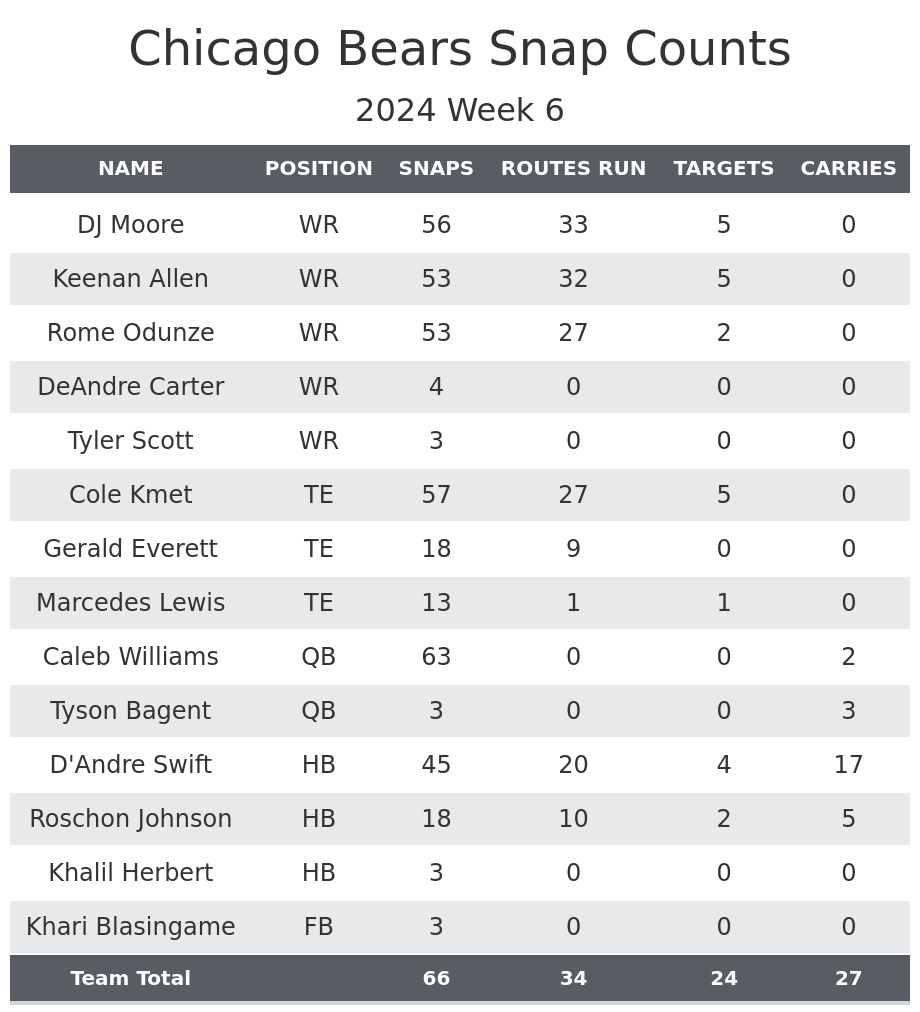
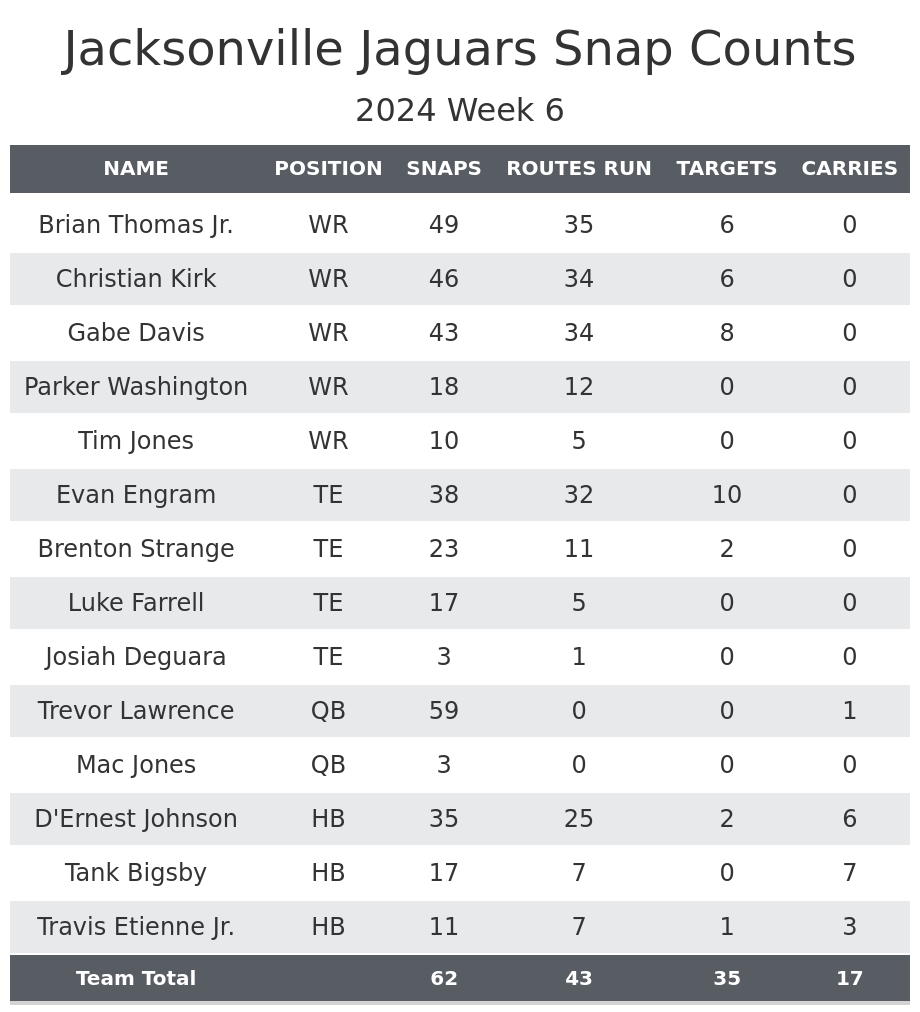
Monitor Travis Etienne Jr.’s health: Etienne suffered a hamstring injury and didn’t return.
Etienne was limited in practice for the last two weeks due to a shoulder injury. He played around 70% of offensive snaps each of the first three weeks, dropping to 52% in Week 4 and 38% in Week 5. Over the first five weeks, his primary backup Tank Bigsby had the third-highest PFF grade for a running back, making it hard to tell how much a shift in playing time and touches has to do with Etienne not being 100% compared to Bigsby just playing better than Eteinne has when he’s 100%.
It was clear from the start of the game that Etienne would get substituted out more than usual. Bigsby had just as many snaps and carries on the first drive as he did on the first drives of the first five games combined.
Etienne played 50% of snaps on the first drive and continued to play roughly 50% over the first three drives. He didn’t play on the final drive of the first half and only played one snap in the second half before his day was done.
In the second half, we saw more D’Ernest Johnson than Tank Bigsby, largely due to the game script. Over the last two seasons, Bigbsy has been more of an early-down back, and Johnson has been more of a receiving back. If Etienne misses time, Bigbsy would be the player to start in fantasy leagues. Even if Etienne doesn’t miss time, Bigsby could still lead the team in carries over the rest of the season.
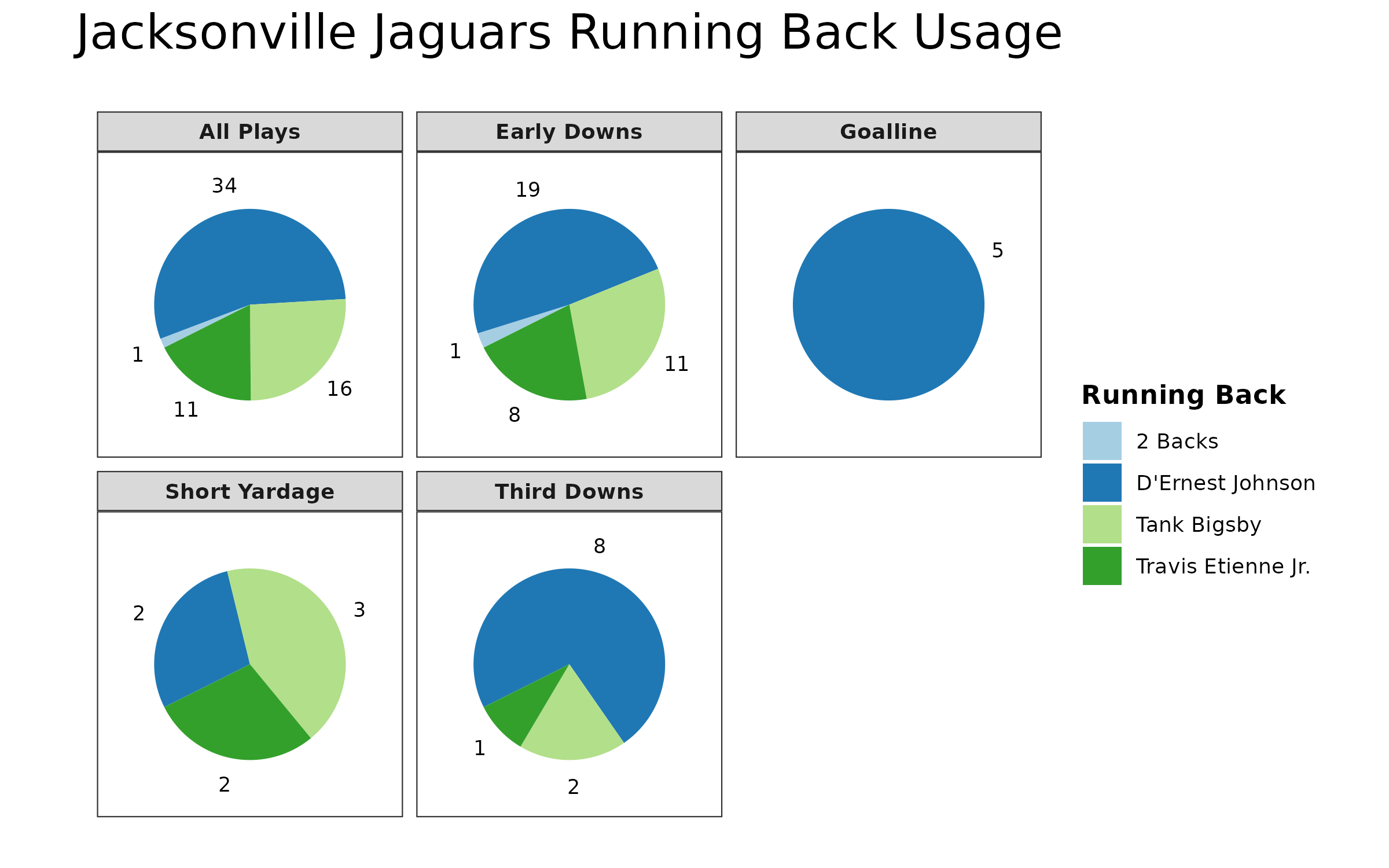
Evan Engram returns: The Jaguars lead tight end missed the last four games due to a hamstring injury.
Engram played fewer snaps during both the preseason and Week 1 than last season. He typically played around 80% of Jacksonville’s offensive snaps last season and 68% in Week 1.
The Jaguars started the game a little more conservative with Engram. He played 56% of their offensive snaps in the first half, losing snaps to Luke Farrell in more rushing situations like he was in Week 1 but also losing some time to Brenton Strange.
Engram was still targeted when he was on the field and those plays went well, so Engram went back to playing around 70% of Jacksonville’s offensive snaps in the second half. He caught 10 passes for 102 yards. We can’t expect Engram to see this high of a target rate every game, but this is still enough to safely put Engram back in fantasy starting lineups for anyone who wants to be conservative.
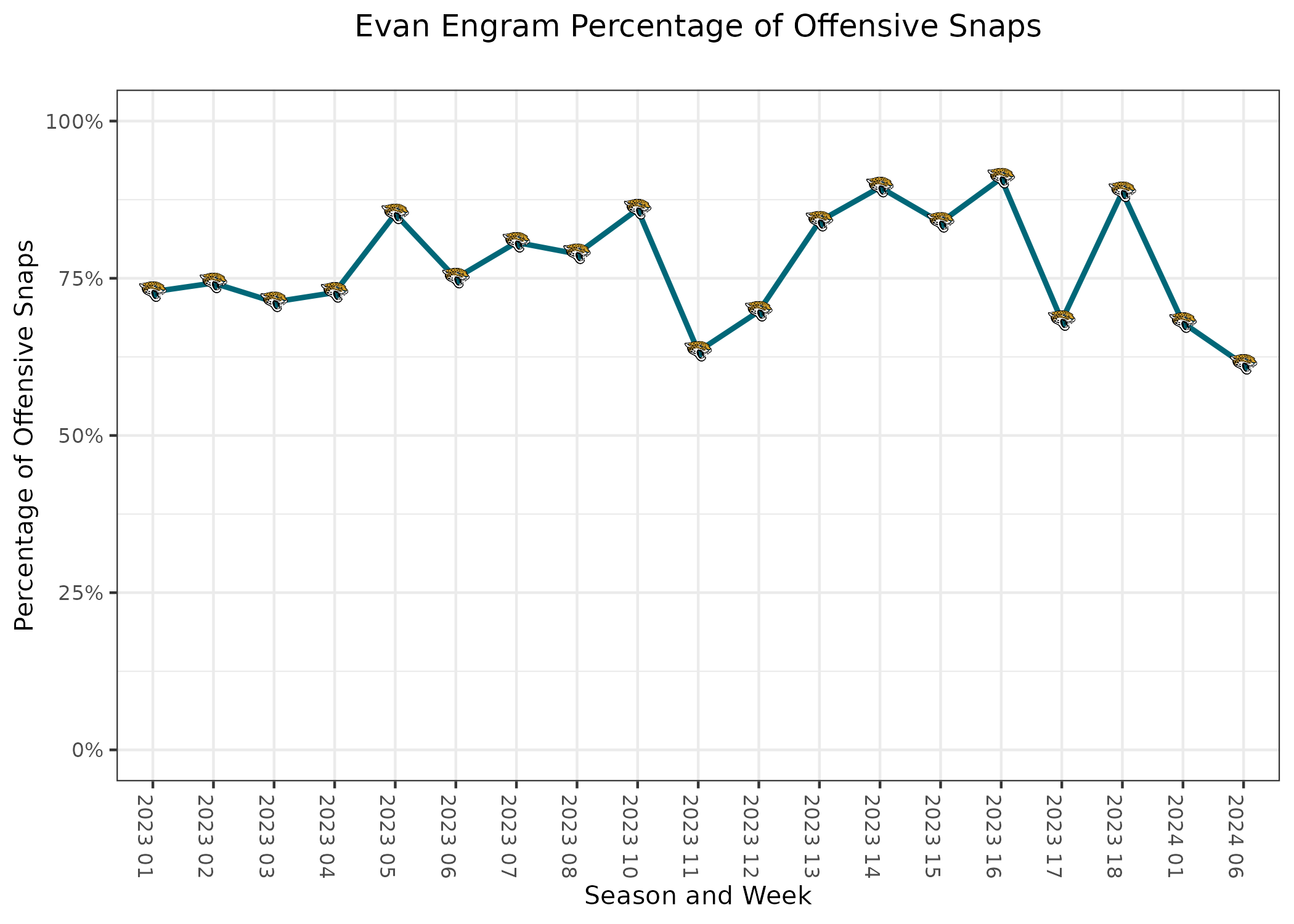
Chicago Bears fully embrace 11 personnel: Shane Waldron’s offense has evolved over the first six weeks to keep his best players on the field.
During the last three seasons with the Seattle Seahawks, Waldron’s offenses had used 11 personnel on 55% of first-half plays outside of two-minute drills. This led plenty of fantasy managers to be concerned about Keenan Allen and Rome Odunze‘s playing time. The Seahawks also consistently rotated players at tight end, leading to concern about Cole Kmet.
Over the first three weeks of the season, the Bears offense largely resembled the Seahawks. The Bears used 11 personnel on 60% of their first-half snaps outside of two-minute drills. The offense started to evolve in Week 4. The Bears used 11 personnel on 69% of their snaps during Weeks 4-5, ranking ninth-most among offenses.
In this game, their 11 personnel rate shot up to 88% of their snaps in the first half. Personnel usage always evolves in the second half, depending on the game script, and they went away from 11 personnel, but that’s largely because they were winning. The Bears’ increased use of 11 personnel has helped Caleb Williams and will also help Allen, Odunze and Kmet going forward. Both D.J. Moore and Odunze could be considered buy-low candidates after this game based on how good the offense has been looking.
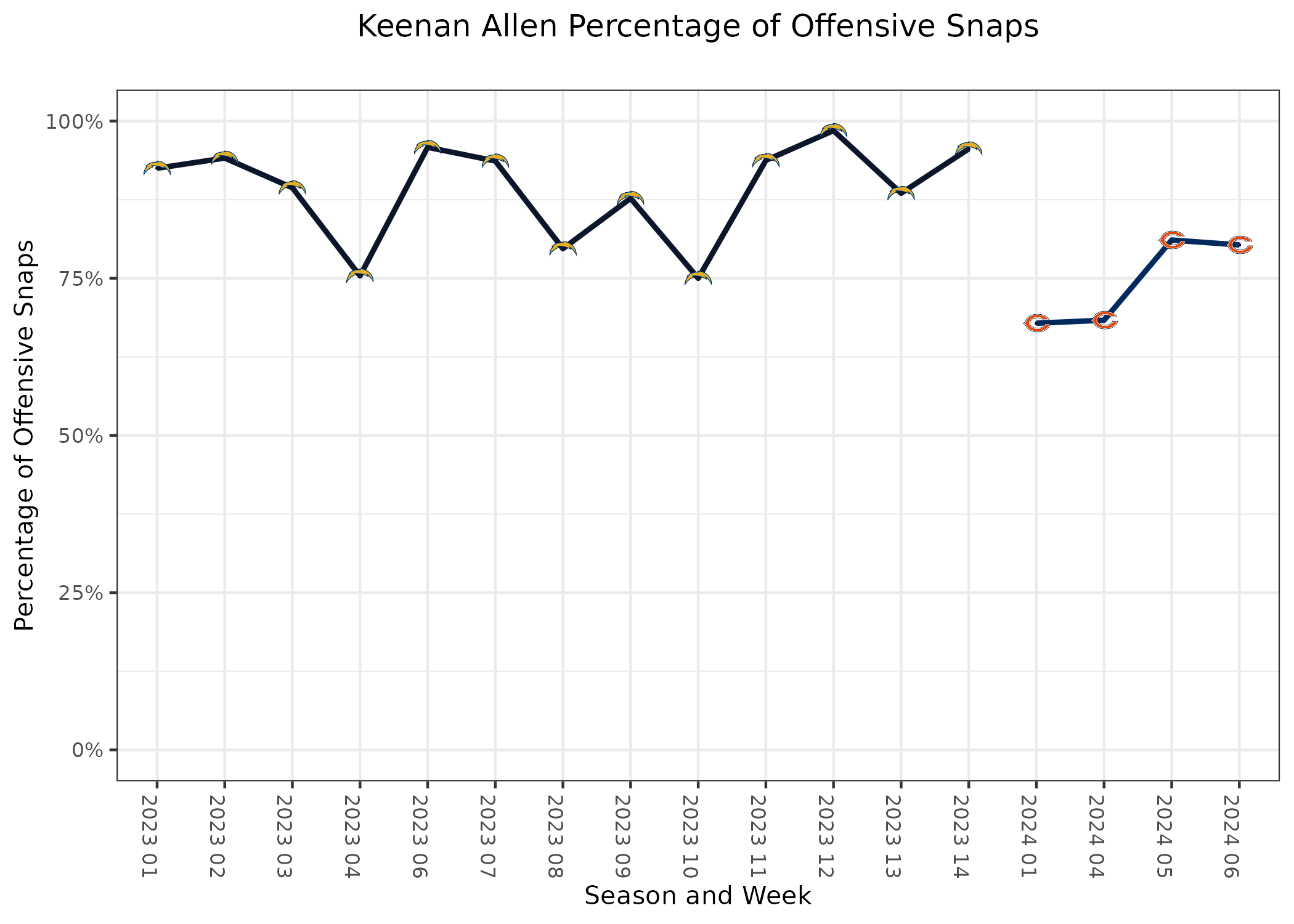
Miscellaneous Notes
- Gabe Davis has been limited in practice for the last three weeks due to a shoulder injury followed by a knee injury. He was playing around 95% of his team’s offensive snaps the first two weeks, but that dropped to 76-79% of snaps from Weeks 3-5. This week, his snap rate declined even further. He scored the two touchdowns today, but ideally, he sees more playing time before he is strongly considered for fantasy starting lineups.
- The Bears running back rotation of D’Andre Swift and Roschon Johnson has been stable over the past three weeks.
Washington Commanders @ Baltimore Ravens
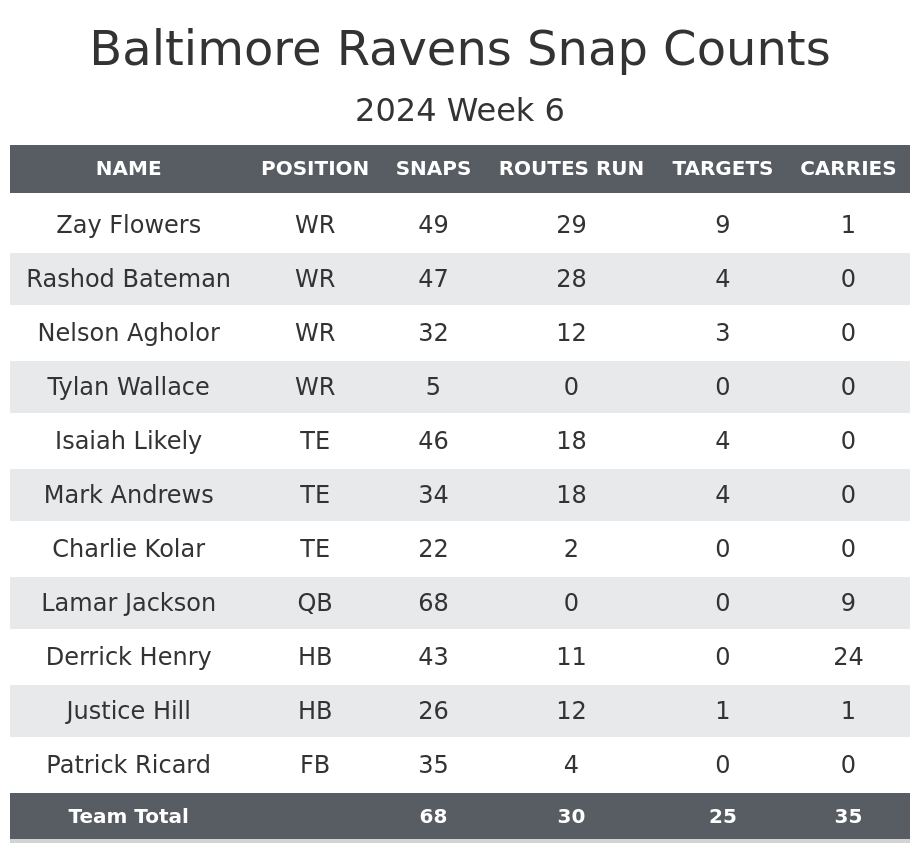
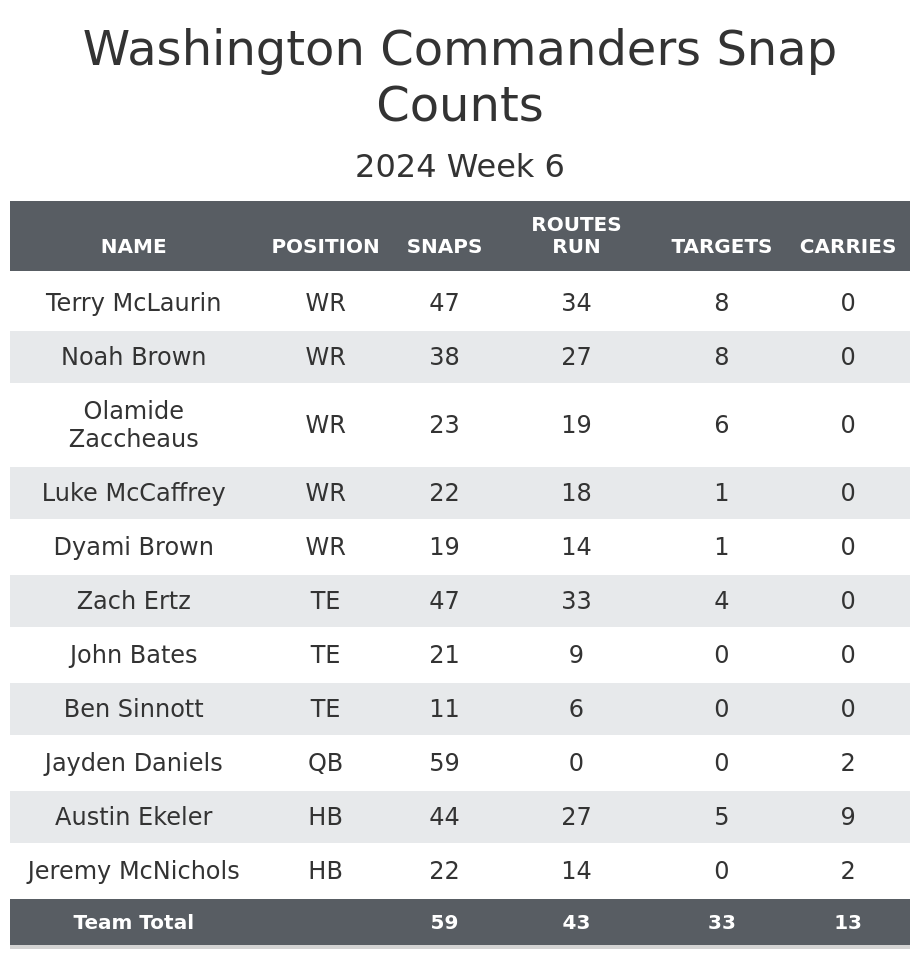
Commanders backfield struggles without Brian Robinson: Robinson was out due to a knee injury.
Robinson played through the knee injury last week in the first half but didn’t play in the second half. It wasn’t clear at the time if he sat out as a precaution with the Commanders leading, or if the injury wasn’t going well.
The Commanders split touches between Austin Ekeler and Jeremy McNichols last week. This week, because the Commanders were largely playing from behind, there weren’t many opportunities to get the ball to running backs. Because of that, Ekeler received most of the work. The Commanders never recorded a six-plus-yard run from their running backs, but Ekeler did have a 25-yard reception. The Ravens had only been allowing 3.1 yards per carry and 60.4 rushing yards per game, so it should be no surprise they struggled.
The Commanders play the Carolina Panthers next week, which should give both running backs a lot more opportunities to succeed if Robinson has to miss another game.
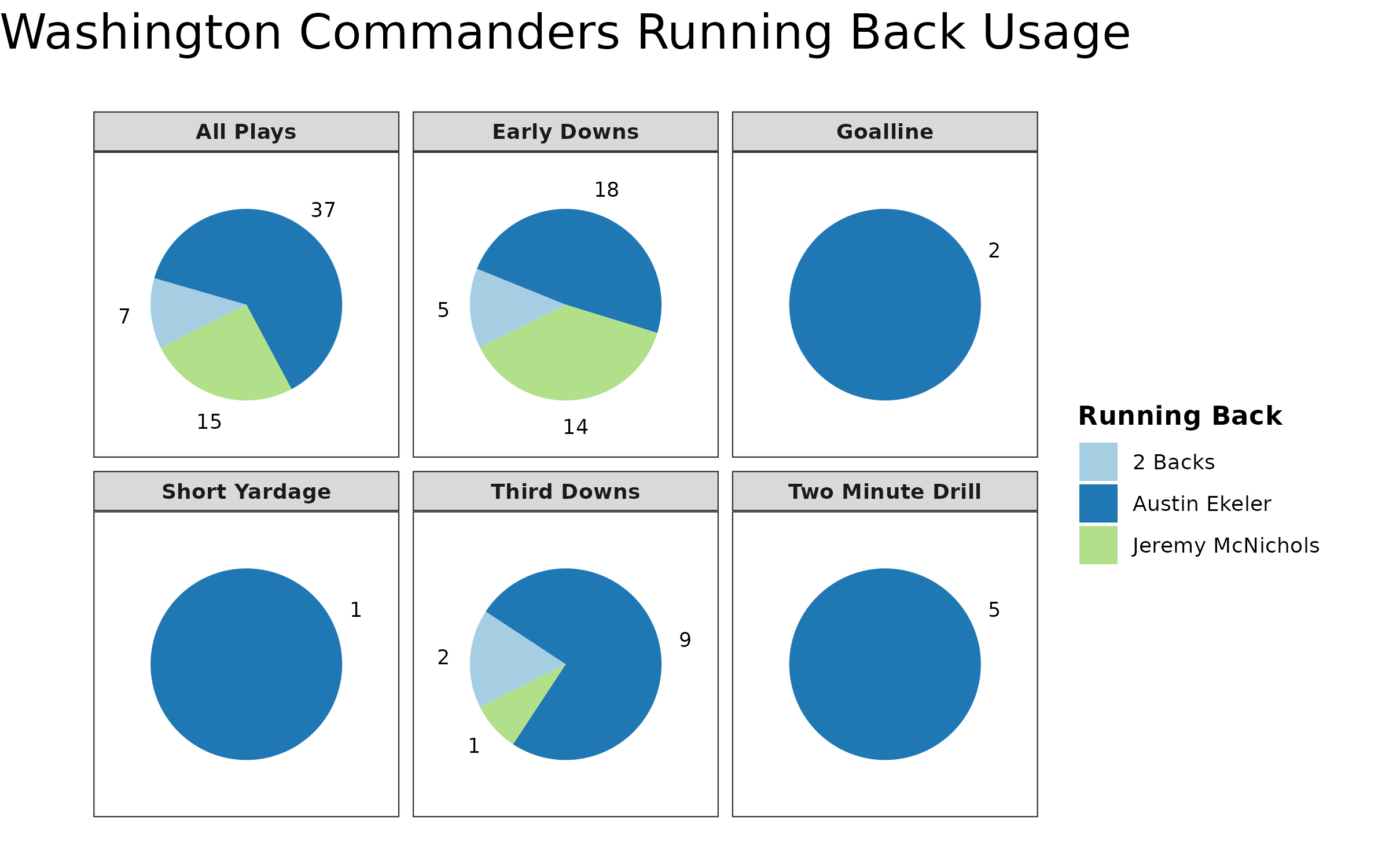
Noah Brown returns: Brown missed Week 5 due to a groin injury.
He was limited in practice all week but wasn’t given a game status. His playing time was slowly but surely rising, and he played two-thirds of the Commanders’ offensive snaps in Week 4. He picked up right where he left off, playing 64.4% of the Commanders’ offensive snaps in this game.
Brown led all of the Commanders wide receivers in receiving yards at 58. He had caught three passes in each of his previous three games, so his four receptions were a season-high. He should remain a top-three option in the Commanders’ passing game and a potential waiver-wire option.
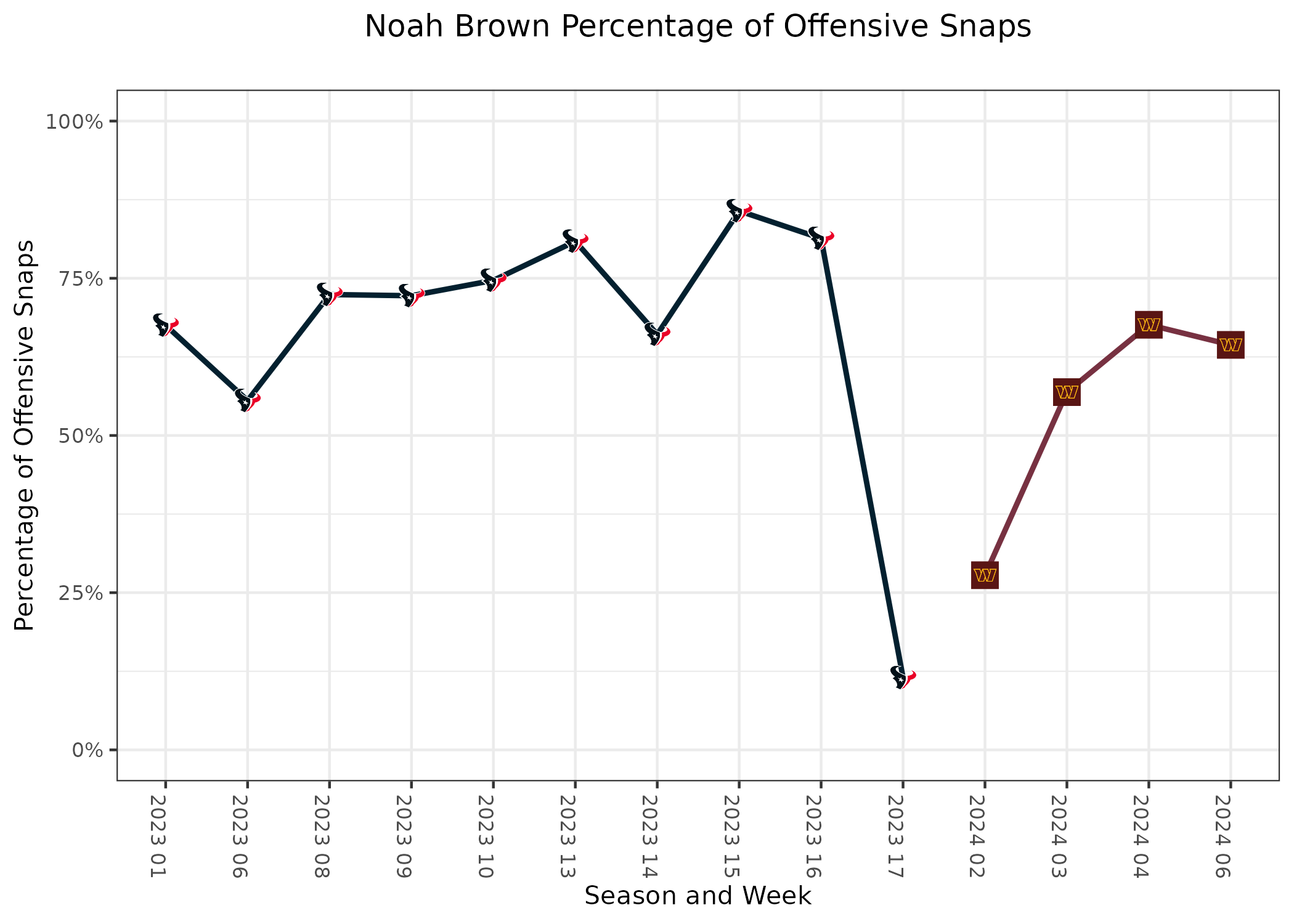
Sell high on Mark Andrews: While Andrews has caught more passes in the last two weeks, his role in the offense hasn’t changed.
Andrews played 100% of the Ravens’ snaps in 12 personnel, 50% in 11 personnel, 40% in 21 personnel and 6% in 22 personnel. These numbers are very similar to every other game from Baltimore this season.
The Ravens have been passing the ball a lot because they’ve been in competitive games. They’ve played the Kansas City Chiefs, Buffalo Bills and Cincinnati Bengals, who are three other best teams from the AFC from the last few seasons, and the Commanders who have been one of the best in the NFC. In most of the remaining games on the schedule, the Ravens won’t need to pass as much. We can expect Andrews to continue running a route on close to 50% of the Ravens’ pass plays while not running as many routes as Isaiah Likely in most games going forward.
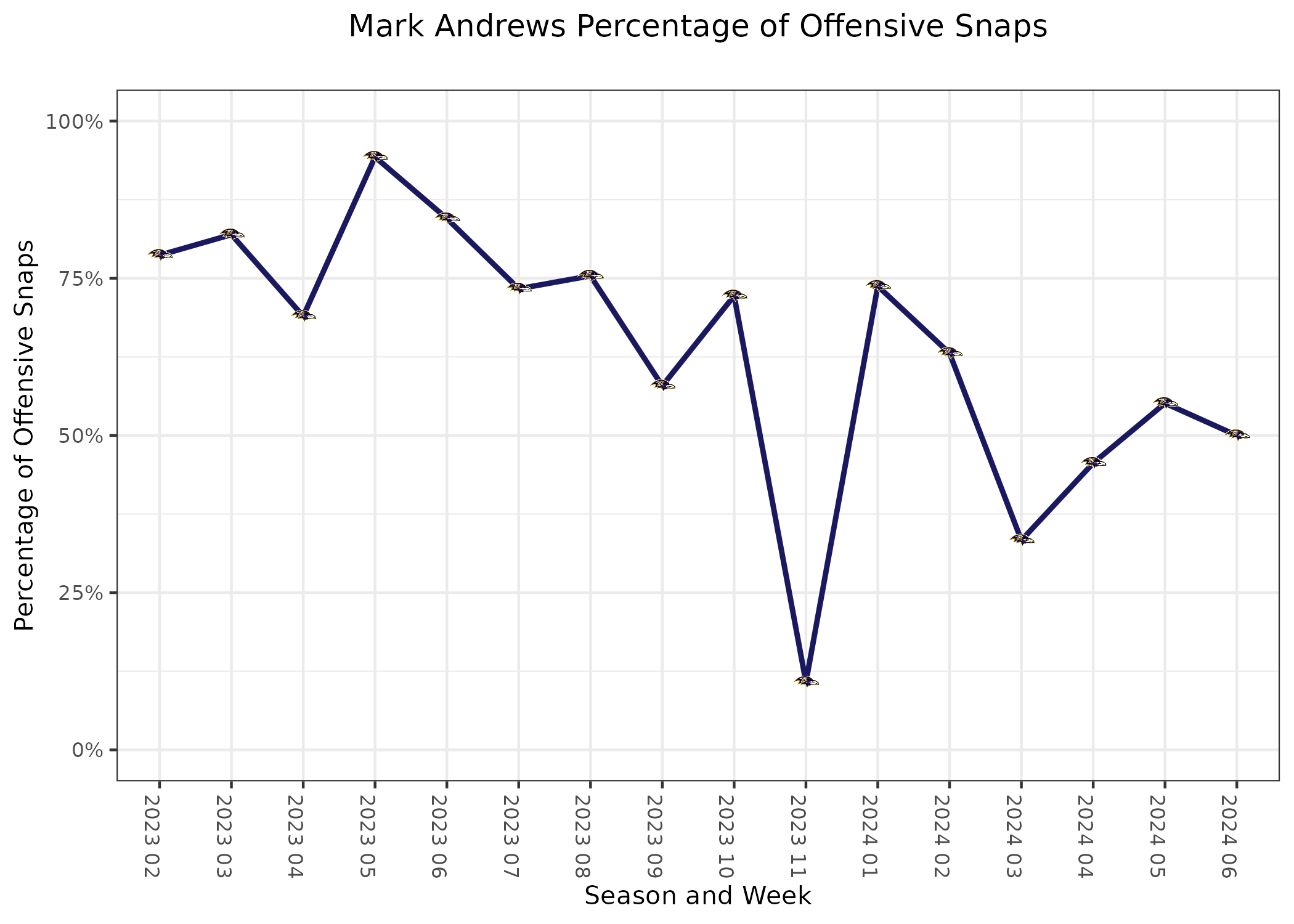
Miscellaneous Notes
- Commanders tight end Zach Ertz played 79% of Washington’s offensive snaps this week, which is a season-high, but this was likely due to the Commanders only running 59 plays. He played 47 offensive snaps, which is comparable to other games this season. He is an OK option to consider off the waiver wire when your starting fantasy tight end has a bye week.
- Ravens fifth-round rookie running back Rasheen Ali was added to the active roster, but he didn’t play an offensive snap.
Arizona Cardinals @ Green Bay Packers
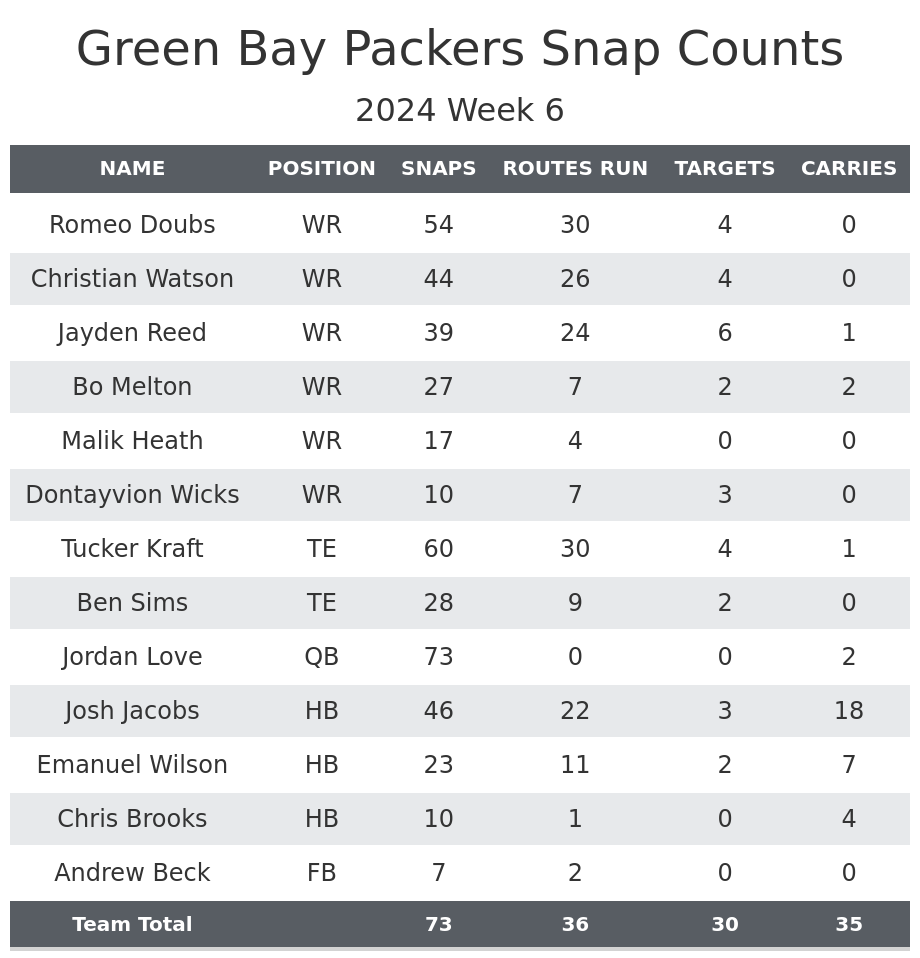
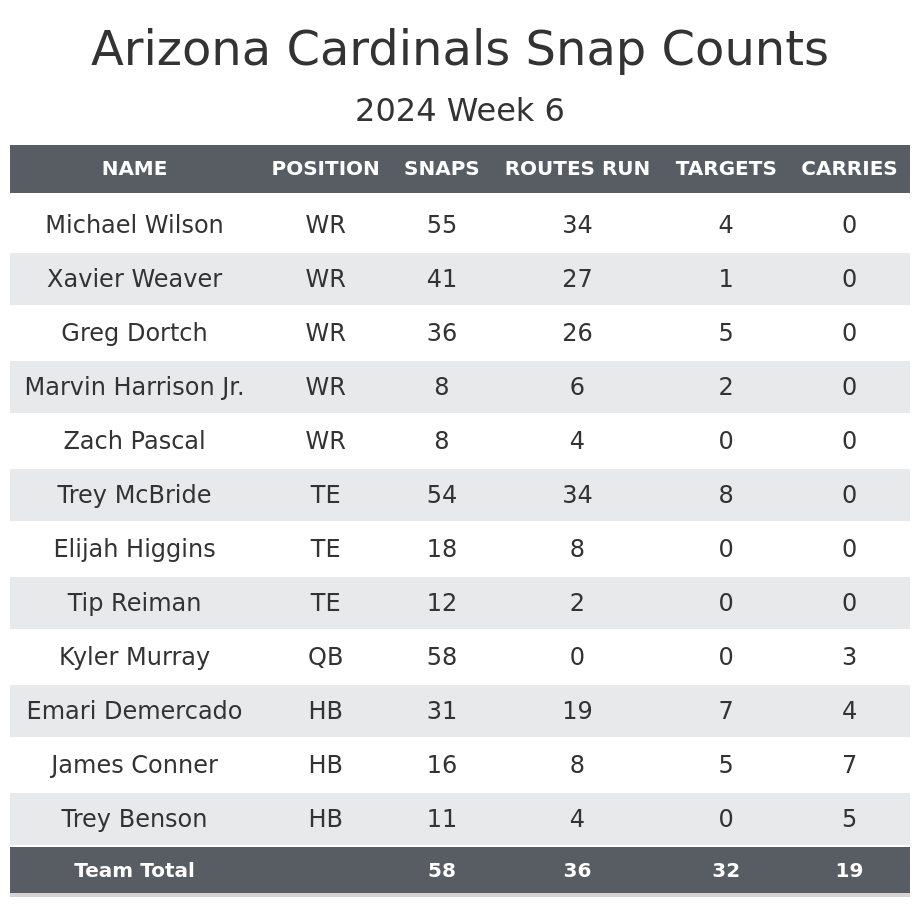
Monitor Dontayvion Wicks’ health: Wicks suffered a shoulder injury in the first quarter and didn’t return.
The Packers were briefly at full strength at wide receiver. Romeo Doubs missed last week after being suspended for the week after skipping practice, but he practiced all week and was back in the lineup. Christian Watson missed last week due to an ankle injury. There was initially thought the injury was much more serious, but Watson was also able to return to the lineup.
The Packers started the game with Watson and Jayden Reed, which was the first play Reed has played in a two-receiver set all season. Reed played two more snaps out of 12 personnel over the rest of the game. Over the first two drives, Wicks played seven snaps to Watson’s four. Wicks suffered his shoulder injury on the second drive.
Over the rest of the game, Doubs and Watson were the primary outside receivers, while Reed played in the slot. Watson was still rotated out more frequently than usual because of his injury, but he probably would have stayed under 50% of Green Bay’s offensive snaps had Wicks stayed healthy. Reed also limped off the field at one point but didn’t miss time. If the Wicks’ injury is serious, this would primarily benefit Watson, who would play more snaps going forward. All three wide receivers who stayed healthy scored a touchdown in this game, while targets were divided across several players.
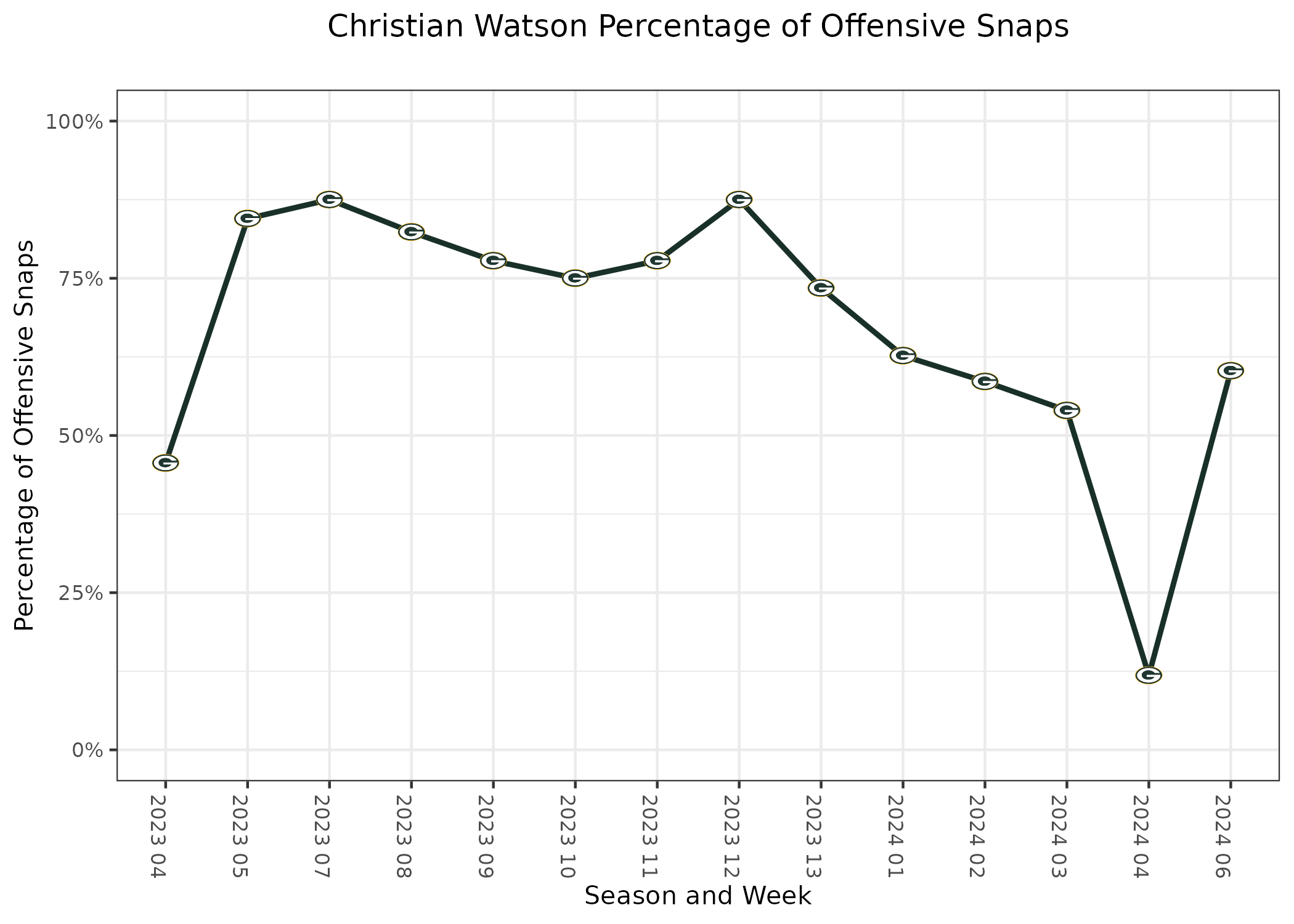
Monitor Marvin Harrison Jr.’s health: Harrison suffered a concussion late in the first half and was ruled out early in the second half.
Before Harrison’s concussion, the Cardinals used more of a rotation at wide receiver than usual. Last week, both Chris Moore and Zach Pascal played more than usual. Moore was released this week due to Zay Jones‘ anticipated return from suspension, but Jones was healing with a hamstring injury later in the week.
On the second drive of the game, Xavier Weaver played all three snaps out of 12 personnel, while Wilson played two snaps and Harrison took one. In 11 personnel, Weaver also took a snap from Greg Dortch on that drive. On the third drive, Weaver played the only snap for a wide receiver out of 13 personnel, while Pascal took a snap from Harrison. This left Harrison playing only 64% of Arizona’s offensive snaps on the first three drives after taking 89% of Arizona’s offensive snaps on the first three drives over the first five weeks. Both Wilson and Dortch were also playing less than usual.
Harrison suffered a concussion at the start of the fourth drive. After the concussion, the wide receiver rotations stopped. Wilson, Weaver and Dortch played in 11 personnel, while Wilson and Weaver played in 12 and Wilson played in 13. Wilson caught two passes for 21 yards and a touchdown. It was the third time in the last four weeks that he’s reached double-digit PPR points, so he is a waiver-wire option regardless of Harrison’s health.
Weaver was an undrafted rookie out of Colorado who was inactive each of the first five weeks. Regardless of the Harrison injury, Weaver should be a target in dynasty leagues, considering how much the Cardinals were getting him involved early this game.
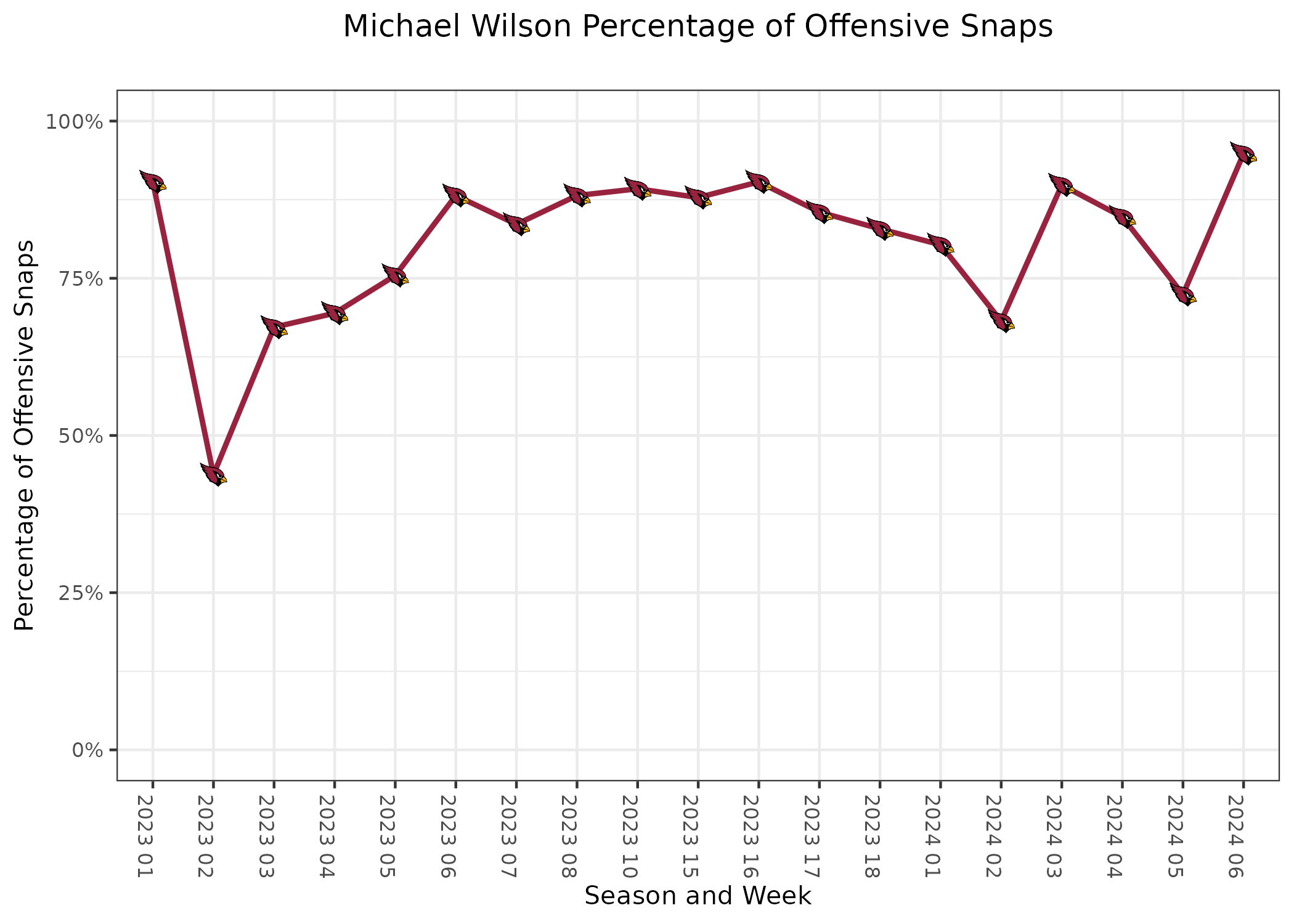
Add Trey Benson: Benson became more involved in the Cardinals offense in the second half.
Conner has generally played well this season but hasn’t been as efficient as last season, posting 0.5 fewer yards per carry and a lower avoided tackle rate. This has led to his rushing grade regressing to a little above his career average. Benson was drafted to be Conner’s long-term replacement for Conner. A lot of his work this season came in the fourth quarter of blowout games.
This week, the running back rotation was normal. Conner played on early downs and Emari Demercado took passing downs. Conner ran seven times for 24 yards. The Cardinals decided to start the second half with Benson instead of Conner. Benson broke a 20-yard run, leading to 26 total yards on five carries. Conner came back in for the following drive and proceeded to immediately lose a fumble. Over the rest of the game, Demercado played 17 of 18 snaps because the Cardinals were in a clear passing situation, but Benson was on the field for the one play Demercardo wasn’t.
Conner should return to his usual role as the starter next week, but there is a chance Benson will start seeing more opportunities after starting the second half of this game. Benson will probably only see fantasy value this season with a Conner injury, but the small chances of him having standalone value with Conner remaining healthy are a little higher now than they were before this game.
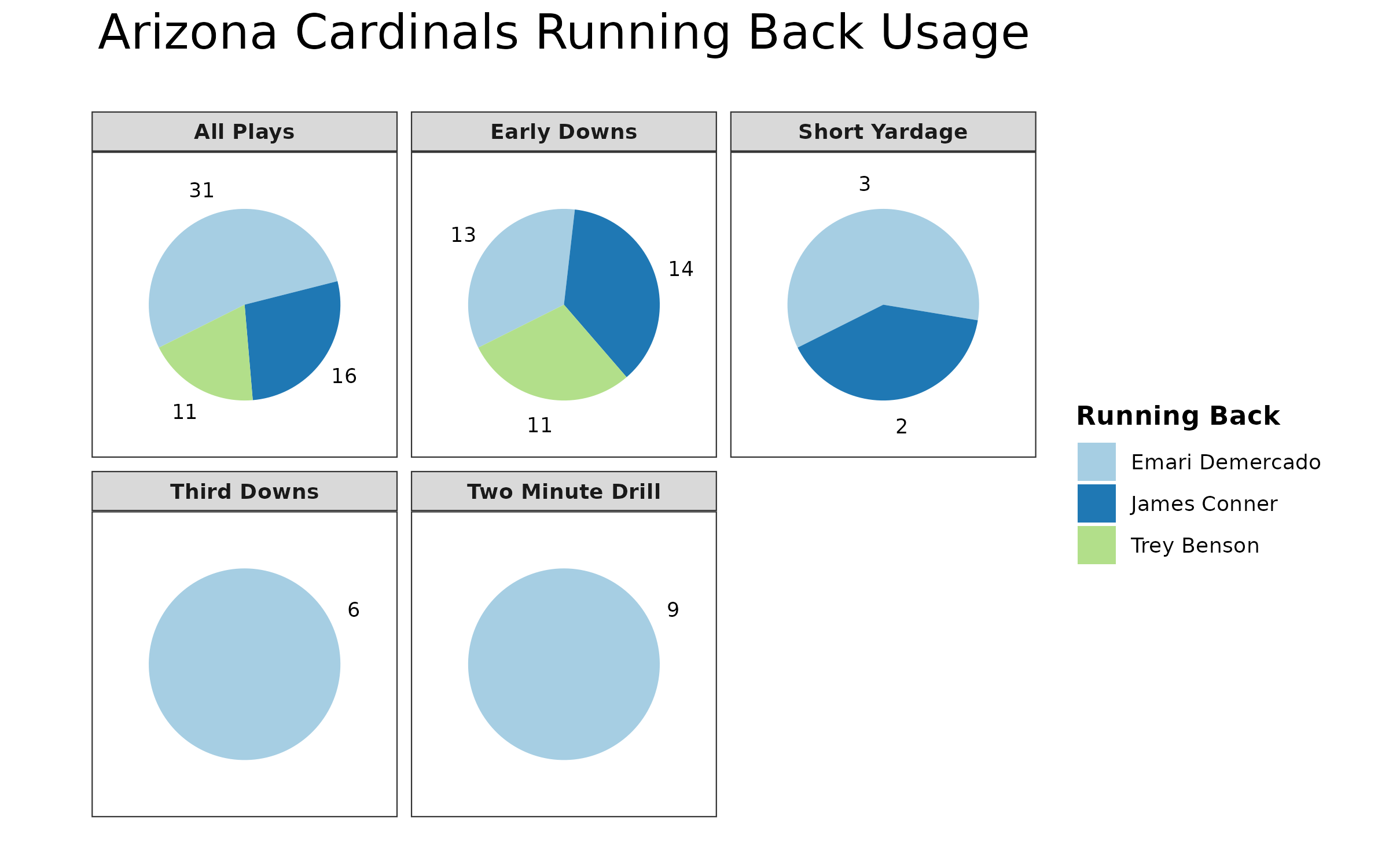
Miscellaneous Notes
- Packers rookie running back MarShawn Lloyd is eligible to return to practice this week. There has yet to be any indication one way or another if Lloyd will be ready to return.
- Packers second-string tight end Luke Musgrave landed on injured reserve with an ankle injury. He missed this game and, at a minimum, will miss the next three. Ben Sims received more playing time than usual in Musgrave’s absence.
- Trey McBride caught at least eight passes for at least 88 yards five times in the last calendar year. That is the most for any tight end — followed by Evan Engram with four and Travis Kelce with three.
Houston Texans @ New England Patriots
- Joe Mixon: 13 carries, 102 yards, 1 touchdown, 2 receptions, 30 receiving yards, 1 receiving touchdown
- DeMario Douglas: 6 receptions, 92 yards, 1 touchdown
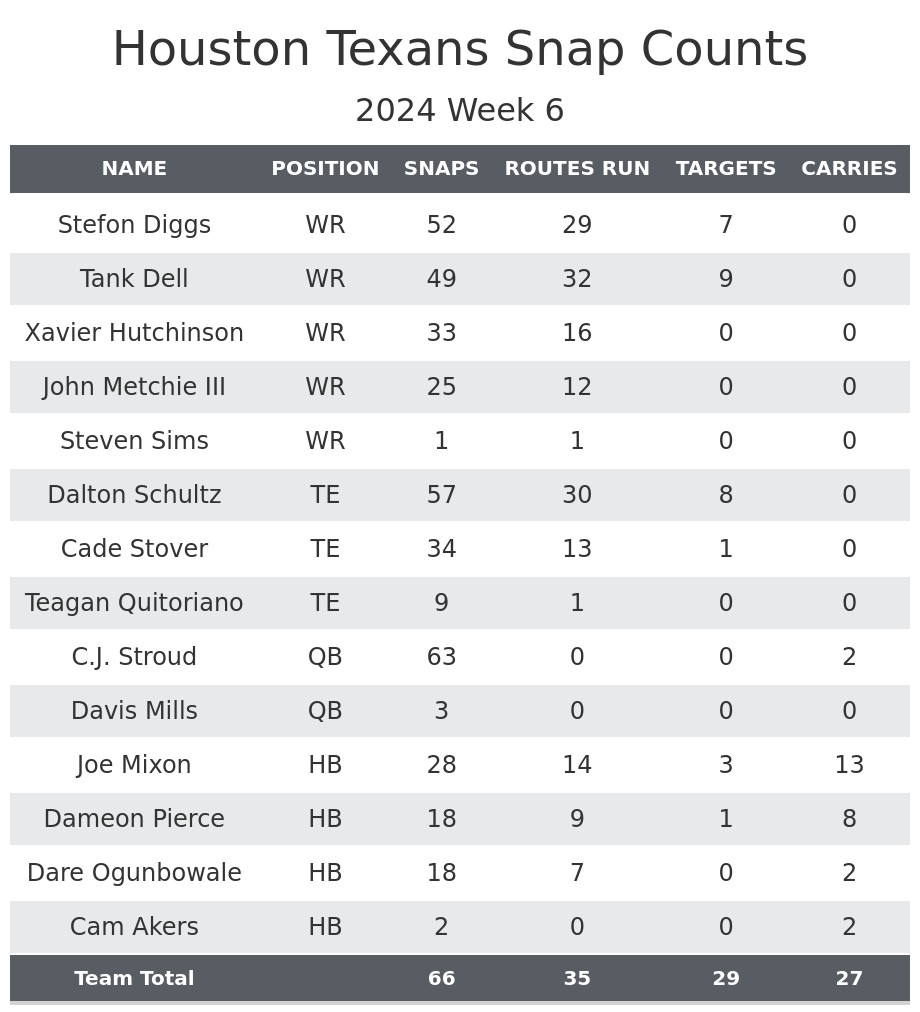
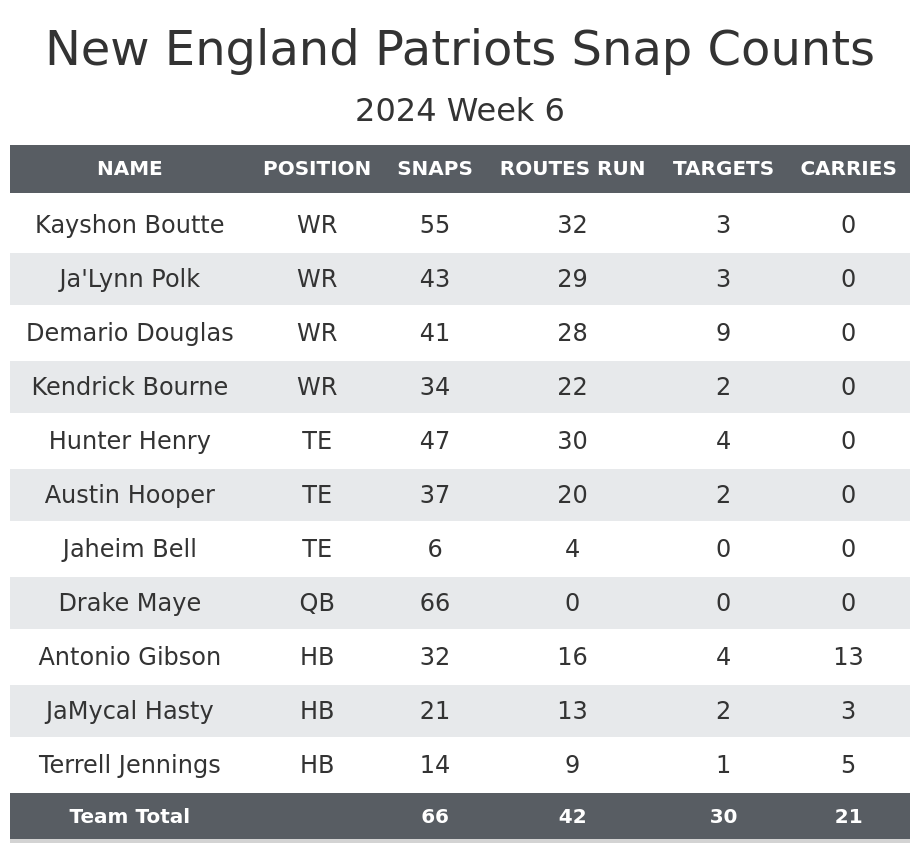
Joe Mixon and Dameon Pierce return: Mixon missed the last three games due to an ankle injury while Pierce missed the last four due to a hamstring injury.
The Texans had turned to Cam Akers as the primary running back on early downs, but Mixon and Pierce’s return moved Akers back to fourth on the depth chart. He only played two snaps late in the fourth quarter. It wouldn’t be surprising if he’s inactive in future weeks if the Texans need more players at a different position. He can be dropped in the vast majority of fantasy leagues.
Houston continued to use Dare Ogunbowale in passing situations while Mixon and Pierce split running downs. Both running backs looked great, averaging over 7.5 yards per carry and scoring a touchdown each. It wouldn’t be surprising if Mixon played a higher percentage of those snaps once he becomes healthier. In games where the Texans are blowing out their opponent, like this week, it also wouldn’t be surprising if Pierce continues to get significant work so Mixon isn’t overworked.
Mixon should be in fantasy starting lineups going forward, and Pierce isn’t the worst waiver-wire option for someone looking for a handcuff.
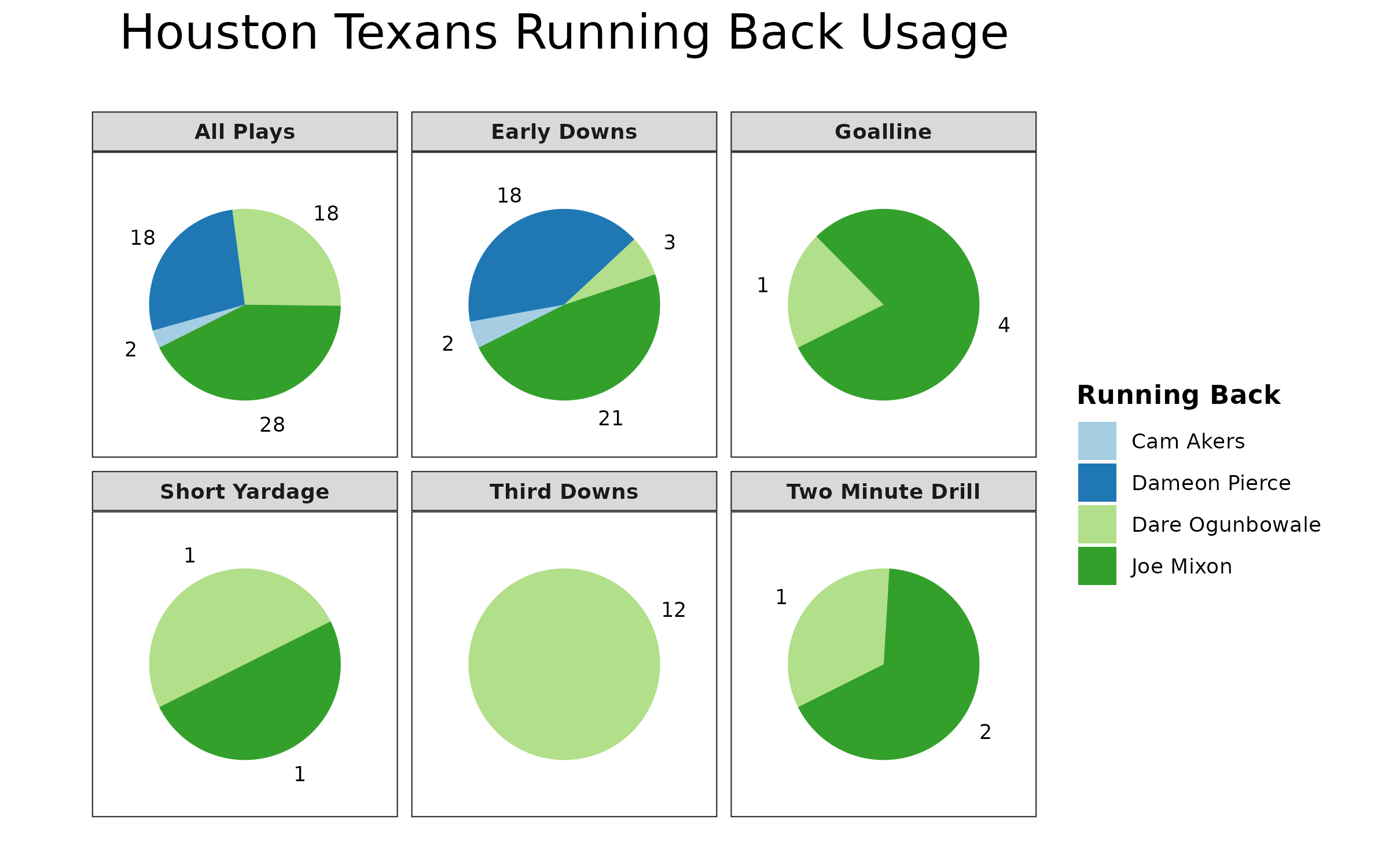
Texans adjust without Nico Collins: The league’s leading wide receiver landed on injured reserve, which will keep him out for at least three more games.
Last week, primarily Xavier Hutchinson saw an increase in offensive snaps, while Tank Dell received a few more targets but not much more playing time. The Texans were also without Robert Woods this week due to a foot injury.
Dell saw a notable increase in snaps this week, becoming one of the primary players in 12 personnel along with Stefon Diggs. He was playing over 75% of Houston’s offensive snaps for the first three quarters, and then his playing time dipped in the fourth quarter while the Texans had a lead. Hutchinson was still a primary player in 11 personnel, but the Texans ran so much more 12 personnel this week with a lead and their running backs healthy, leaving him off the field more often than last week. John Metchie III stepped up in Woods’ role as Diggs and Dell’s primary backup.
Hutchinson could still have value in more competitive games despite not catching a pass. It’s also a good reminder that Dell should be a sell-high candidate. The Texans are much more willing to run the ball and use 12 personnel with Mixon and Pierce healthy, so once Collins is back, we should see a dip in Dell’s playing time.
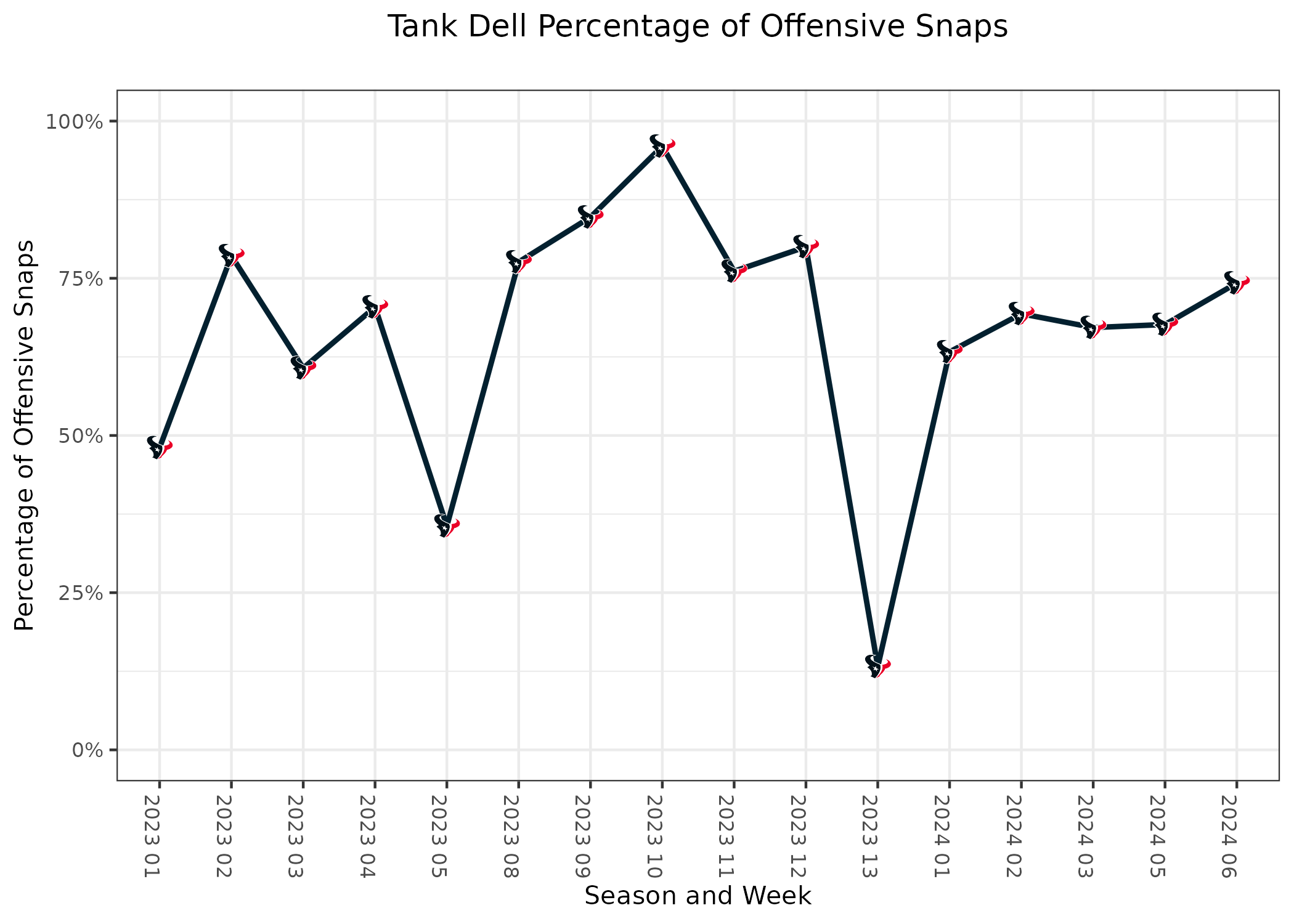
Patriots adjust without Rhamondre Stevenson: Stevenson was inactive due to a foot injury, leading Antonio Gibson to start.
Gibson led the way for New England but spent the day in a two-man rotation with JaMycal Hasty. The running backs largely rotated by drive. Gibson often played for two drives in a row if they were shorter drives. This meant he was playing more snaps early in the game when the Patriots were still relatively close. He ran 13 times but only gained 19 yards but had more success as a receiver, finishing with three receptions for 24 yards.
The rotation was similar to Stevenson and Gibson early in the season. Gibson played Stevenson’s snaps and Hasty played Gibson’s. The Patriots were down by multiple scores late in the third quarter, so Terrell Jennings joined the rotation. Jennings was an undrafted rookie out of Texas A&M who was elevated from the practice squad for this game.
Gibson is still worth adding off the waiver wire or keeping because the Patriots play the Jacksonville Jaguars next week, so they are more likely to be in running situations next week.
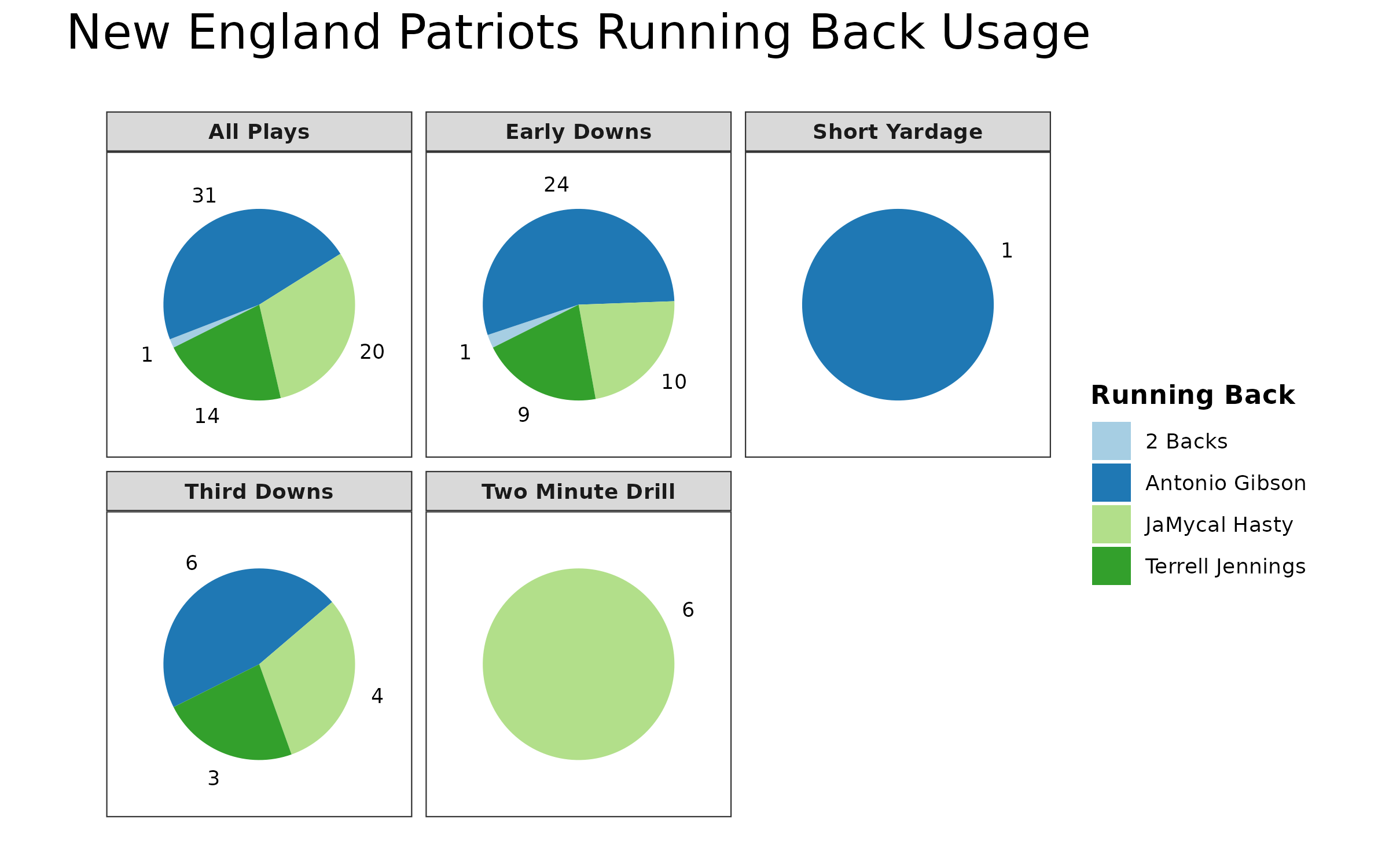
Kayshon Boutte leads the Patriots wide receivers in snaps: Boutte ran the most routes and caught three passes for 59 yards and a touchdown.
The Patriots decided to make Tyquan Thornton and Javon Baker healthy inactives for this game. Thornton’s playing time decreased dramatically each week, while Baker has been inactive for a few weeks. K.J. Osborn was questionable for this game due to a shoulder injury. He was active over both of those players but didn’t play a single snap on offense.
The Patriots used DeMario Douglas, Ja’Lynn Polk and Boutte as their wide receivers in 11 personnel, while Boutte and Kendrick Bourne were the receivers in 12 personnel. This led to a dramatic decrease in snaps for Polk compared to last week, who was playing 100% of New England’s offensive snaps in both 11 and 12 personnel.
This was the third time in four weeks that Douglas caught at least six passes, and the first time this season that he scored a touchdown. His playing time has been inconsistent from one week to the next, but he should be pretty dependable as long as the Patriots are losing by multiple scores, and the team doesn’t have a clear outside receiver option.
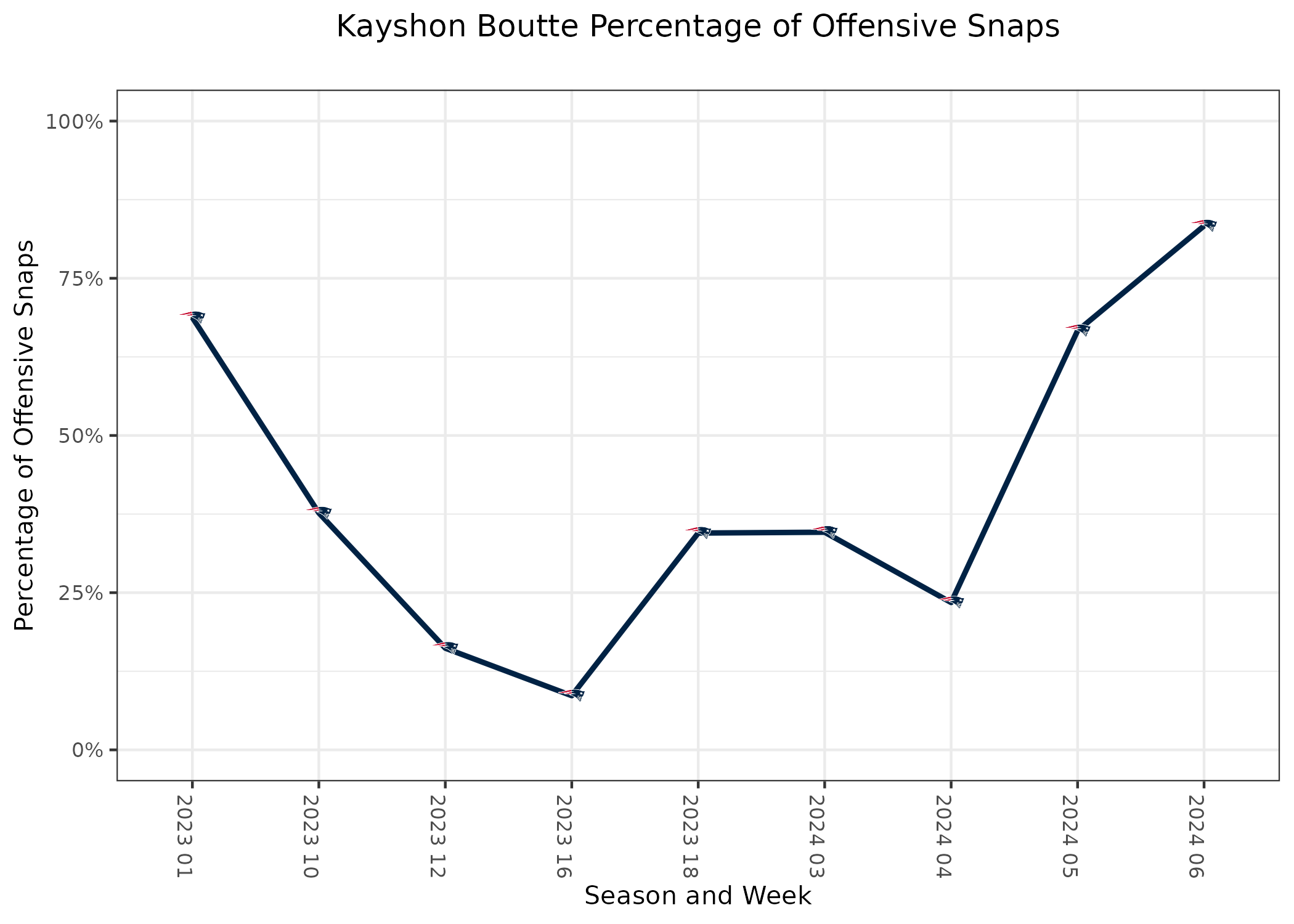
Miscellaneous Notes
- The Texans brought back Teagan Quitoriano this week, who they had released in September with an injury settlement. He had been with the Chicago Bears‘ practice squad. Most of his nine offensive snaps came at Dalton Schultz‘s expense, both in 11 personnel and 12 personnel.
- While Hunter Henry scored his first touchdown of the season, it’s hard to give him serious consideration off the waiver wire, considering he’s caught three or fewer passes in five of six games this season.
Tampa Bay Buccaneers @ New Orleans Saints
- Chris Godwin: 11 receptions, 125 yards, 2 touchdowns
- Sean Tucker: 14 carries, 136 yards, 1 touchdown, 3 receptions, 56 yards, 1 touchdown
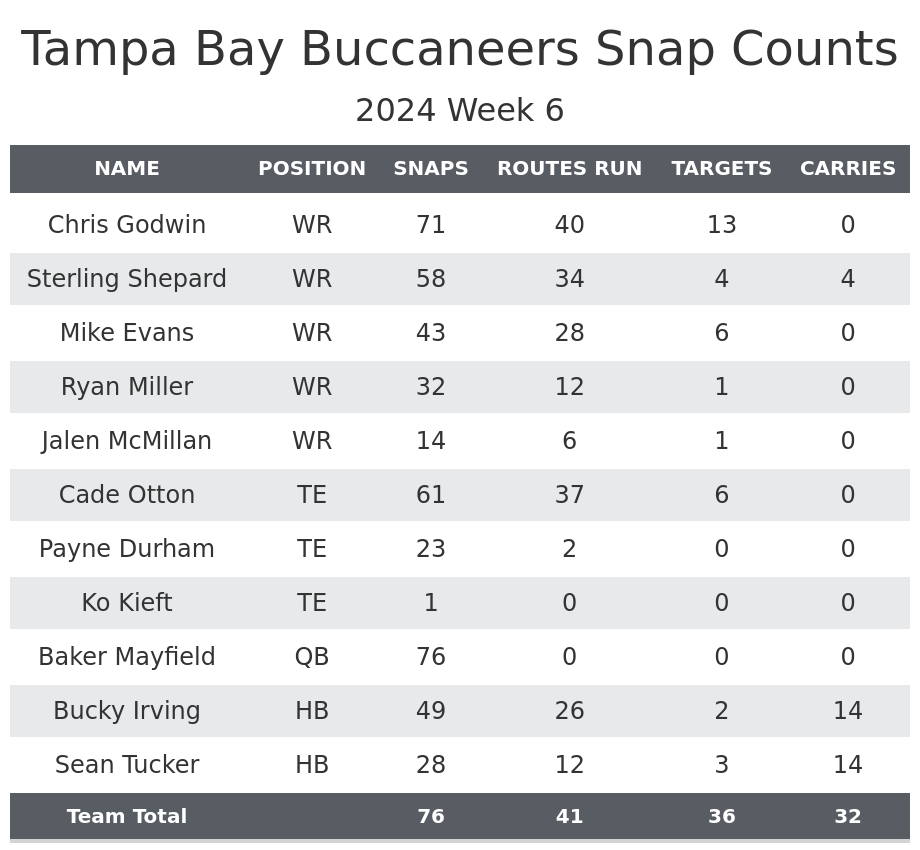 \
\

Buccaneers run game shines without Rachaad White: Both Buccaneers backups ran 14 times with over 5.5 yards per carry.
White was inactive with a foot injury, giving Bucky Irving a chance to start and Sean Tucker a chance to shine. Tucker played 31 snaps over the first three weeks of his rookie season last year but didn’t do much with his opportunities, so he was only given one more snap over the rest of the season. He was the clear third running back on the depth chart this season, but that only led to 10 snaps over the first five weeks.
Irving was the main running back in most situations, but Tucker rotated in throughout. In the first half, Irving ran six times to just one carry by Tucker, but both were already averaging over five yards per carry. In the third quarter, they combined for five carries. It was the fourth quarter where they dominated with a combined 16 carries for 150 yards and two touchdowns. Tucker had more explosive runs where he wasn’t getting contacted early, but Irving was making more players miss tackles.
Over the last three seasons, the Buccaneers only had four occurrences of a running back gaining over 80 yards and averaging at least five yards per carry — Leonard Fournette once in 2022, Rachaad White once in 2023 and both Irving and Tucker in this game.
Tucker is worth adding off the waiver wire despite the competition for touches. He played too well not to consider him in case he keeps a larger role going forward. This is likely bad news for both White and Irving because this could become a three-man rotation instead of two.
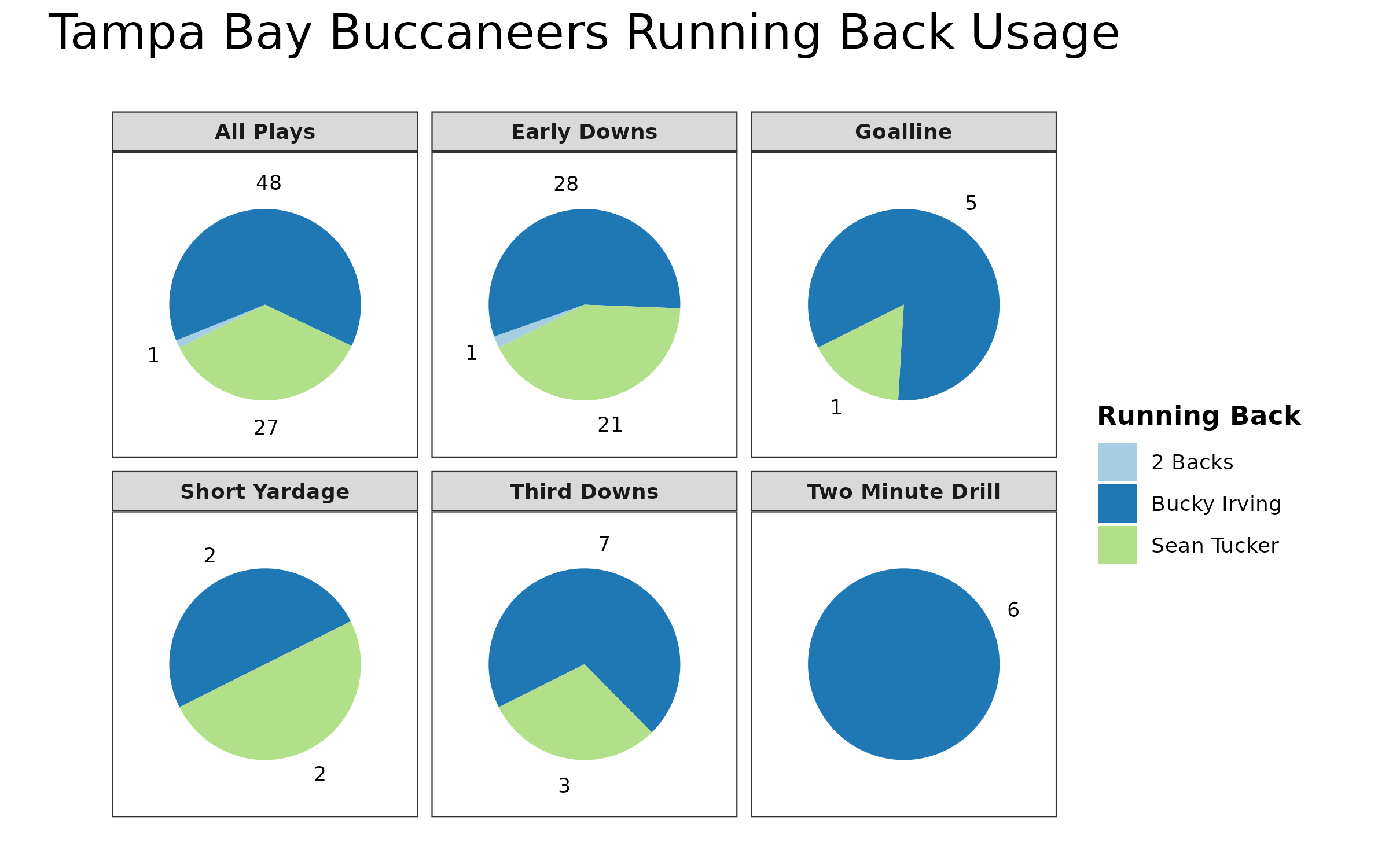
Monitor Mike Evans’ health: Evans left for the locker room in the second quarter. He returned but was rotated out much more than usual.
Evans only played 11 of 16 snaps in the first quarter before going to the locker room. He had played 86% of Tampa Bay’s first-quarter snaps in the first five weeks, so his low snap total was a little abnormal. His snap rate dropped from 69% in the first quarter to 62% in the second, 46% in the third and 48% in the fourth.
Throughout the game, Ryan Miller was rotating in for Evans. Miller was an undrafted player out of Furman in 2023 who spent last season on the practice squad outside of one game where he was activated and played three offensive snaps in addition to 12 special teams snaps. He had spent all of this season on the practice squad as well before this game. He caught his first NFL pass for 39 yards, which was good enough for the second-most receiving yards in this game.
Rookie Jalen McMillan returned to this game after missing the last two weeks. Instead of being a full-time player at the Z receiver spot in 11 personnel like the first three weeks, he rotated with Sterling Shepard.
Both Trey Palmer and Kameron Johnson were inactive for this game due to injury, which is why Miller was active in the first place. If Evans misses time while Johnson is healthy, Johnson would likely be the replacement. Both Thompson and Miller had been the primary X receivers throughout the preseason, and Thompson had clearly won that job given his spot on the roster rather than the practice squad. If Both Evans and Johnson miss time, then Miller would start.
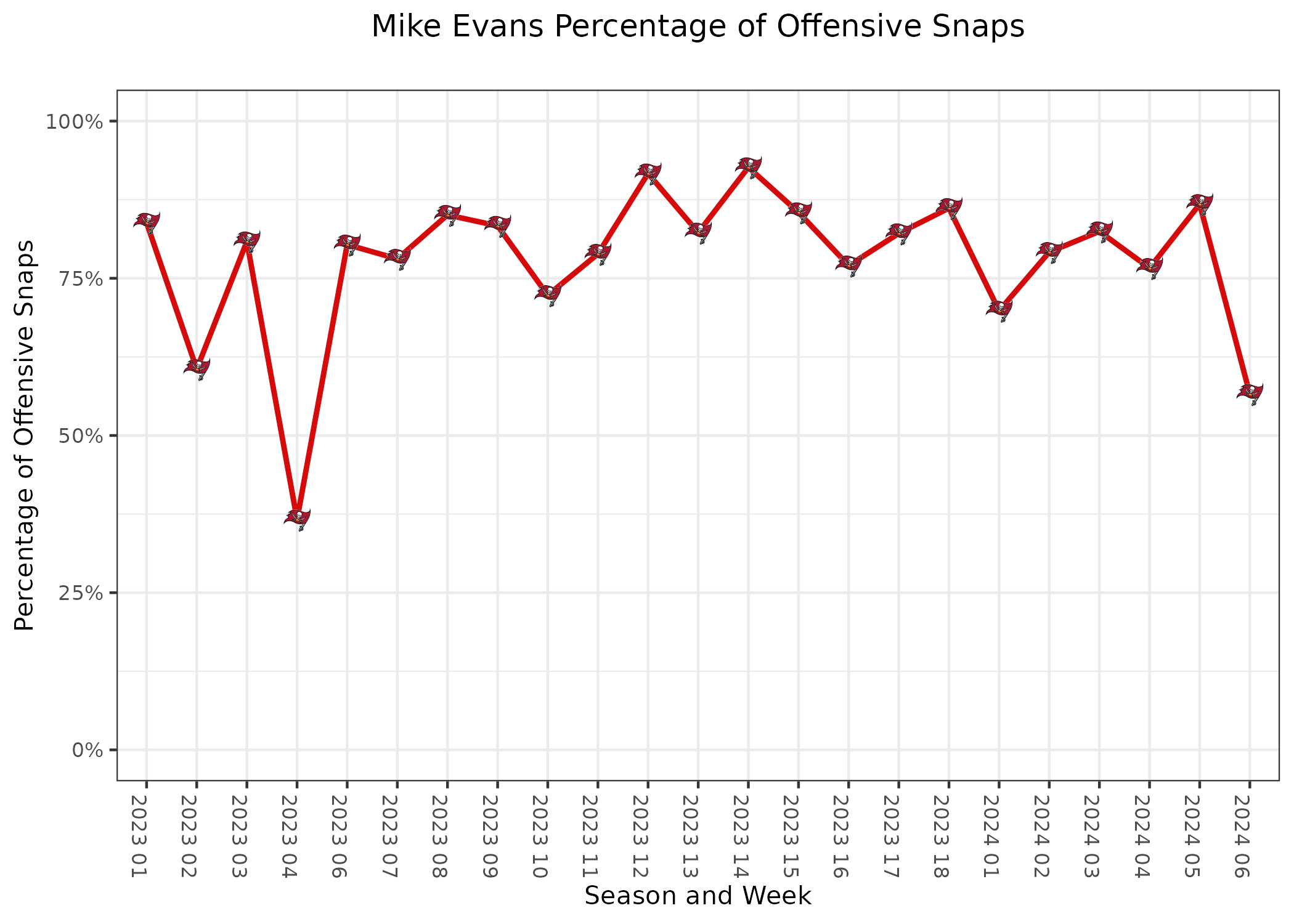
Monitor Chris Olave’s health: Olave took a helmet-to-helmet hit on the Saints‘ third offensive play. He was ruled out by halftime due to a concussion.
He had played two of those first three plays, while Rashid Shaheed played all three snaps. Bub Means and Cedrick Wilson Jr. also took a snap. If anything, it was a little surprising Mason Tipton didn’t play that early because he established himself as the third wide receiver in recent weeks.
After the injury, Means largely took Olave’s place in the offense. While most of the wide receivers have been used interchangeably in the offense, both Olave and Means have primarily been X receivers, lining up on the line of scrimmage as an outside receiver on over 60% of their snaps. If Shaheed were to get hurt this season, we would expect Tipton and Wilson to see more playing time.
Means caught five passes for 45 yards and a touchdown. He went to the injury tent for part of the fourth quarter but was able to return to the game. The Saints have a short week, playing the Denver Broncos on Thursday, which makes it more likely that Olave will miss a game than most players who suffer a concussion. The Broncos are one of the best teams at preventing fantasy points to wide receivers, but Patrick Surtain II suffered a concussion in the Broncos’ game, making it just as likely that Surtain also misses the game. This could make Means a viable option specifically for that matchup.
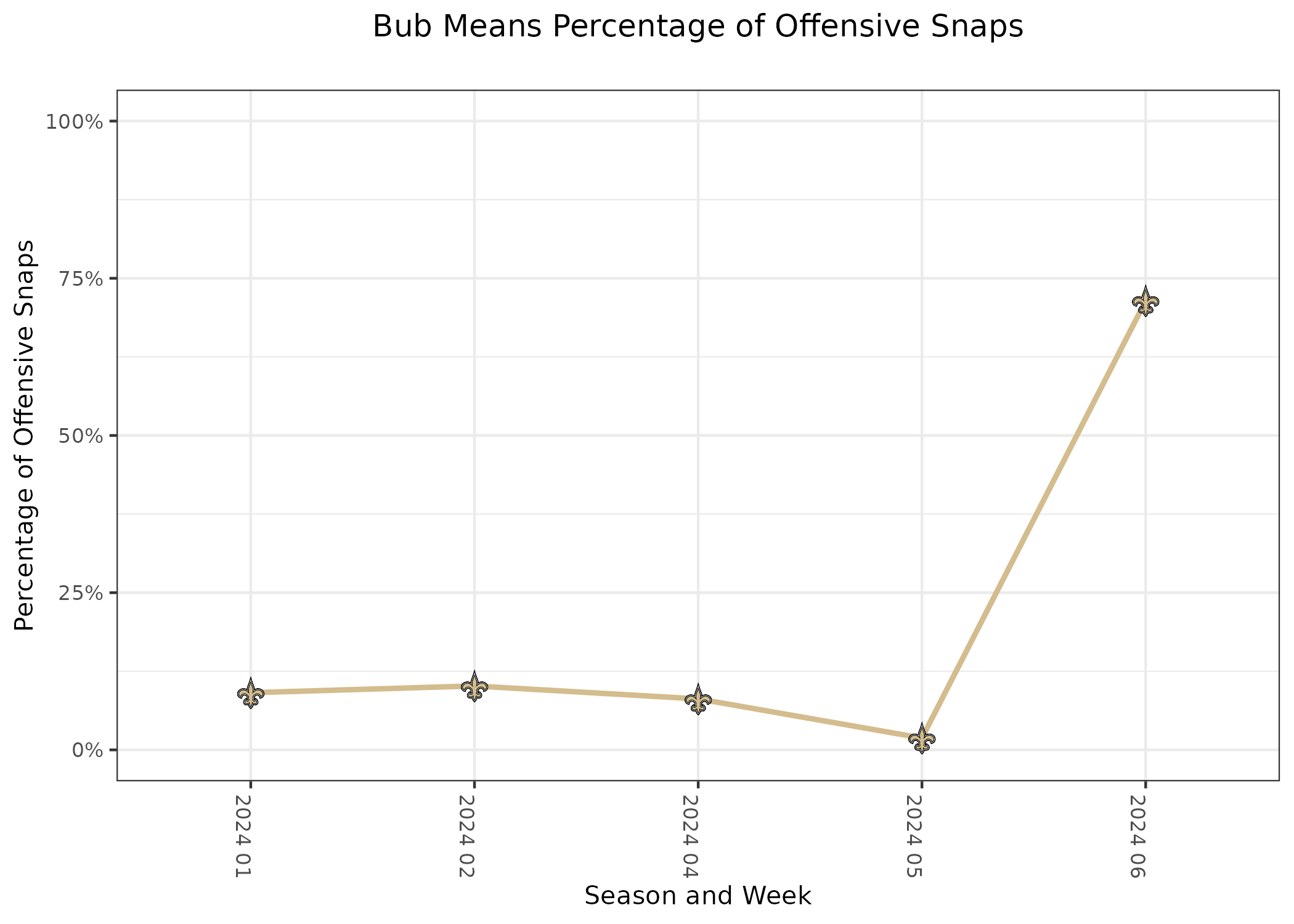
Miscellaneous Notes
- Kendre Miller was activated off injured reserve from his hamstring injury on Saturday, but the Saints still opted to leave him inactive.
- Jordan Mims appeared to have surpassed Jamaal Williams on the depth chart. It wouldn’t make much sense to cut Williams from a cap perspective, but Williams may become inactive once they are ready for Miller to be on the active roster. Williams can be cut in most leagues.
- Taysom Hill missed his second-straight game due to a rib injury.
- Cade Otton was tied for the second-most targets on the Buccaneers with six. He only caught two, but one was for a touchdown. He remains one of the safest options at tight end available on the waiver wire considering his high playing time and decent target share.
Cleveland Browns @ Philadelphia Eagles
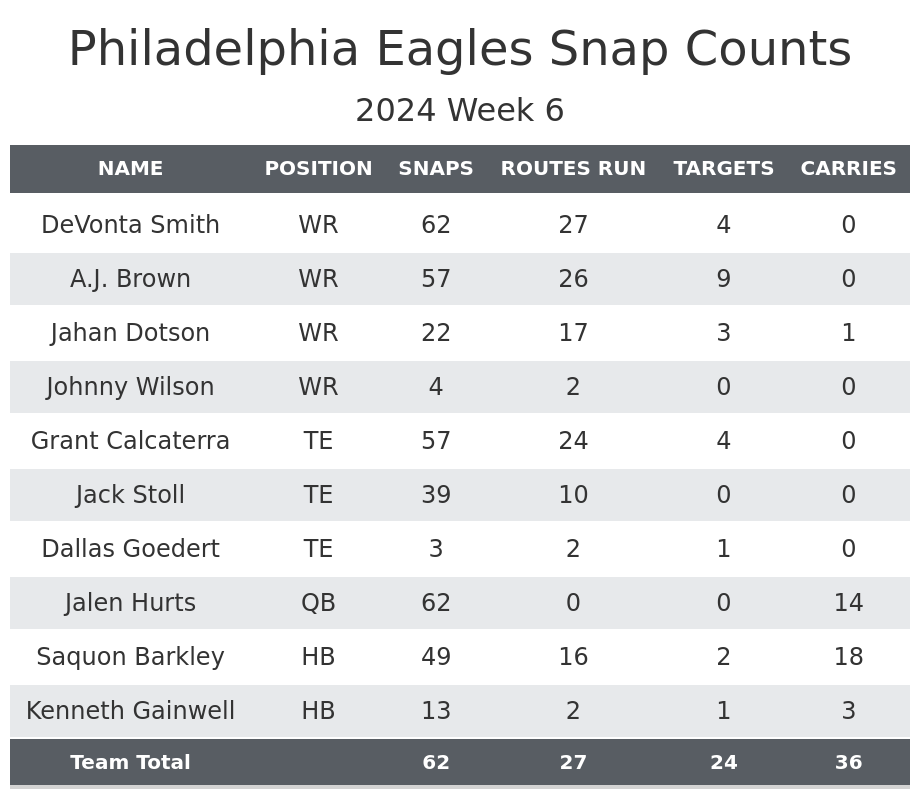
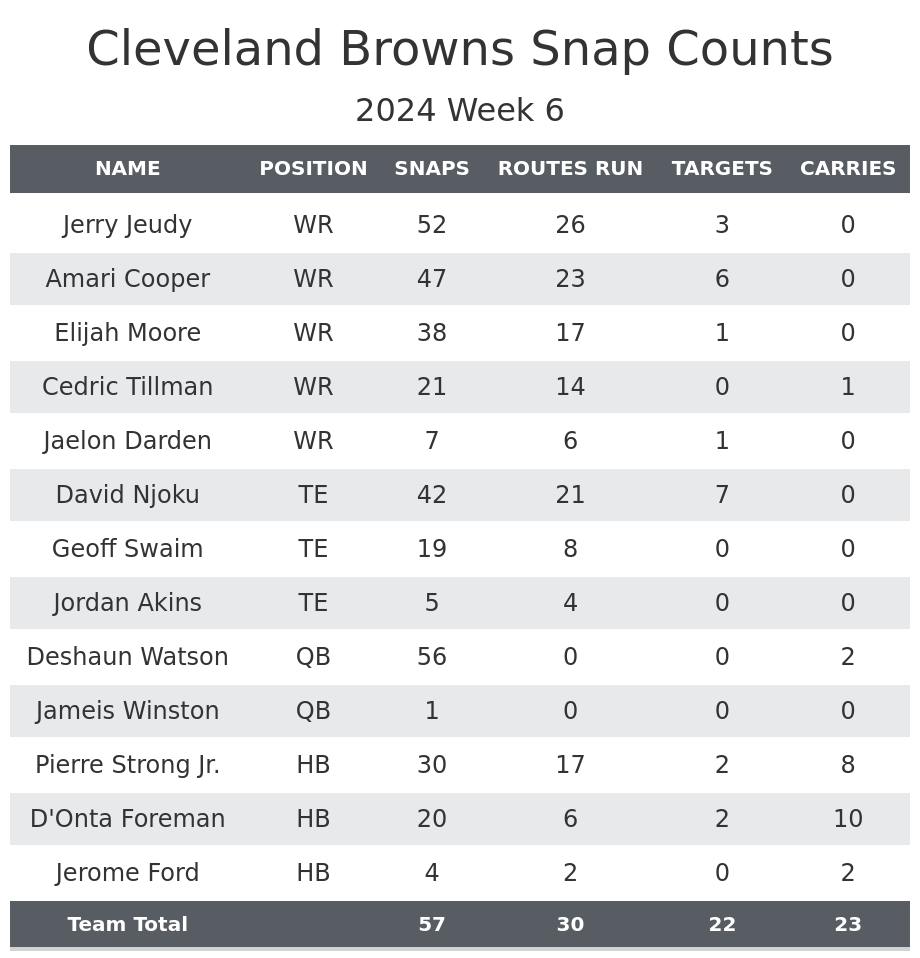
Monitor Jerome Ford’s health: Ford suffered a hamstring injury early in the first quarter and didn’t return.
Ford started the game and played every snap on the first drive. His usage had been very inconsistent this season. He has three starts where he played over 75% of Cleveland’s offensive snaps and two games where D’Onta Foreman started and took most of the carries. The first drive indicated this could have been another big game for Ford.
Foreman was in to begin the second drive, but on the second play, Ford was in and suffered his injury. He was ruled out by halftime. Over the rest of the game, Foreman and Pierre Strong Jr. split the playing time. Foreman tended to play in run situations while Strong played in pass situations. The Browns were playing from behind, which meant more playing time for Strong.
Foreman would be the top option off the waiver wire if these were the only two running backs next week. However, Nick Chubb is expected to play next week. He returned to practice and has been limited. He is more likely to take playing time away from Foreman than Strong, or Ford if he can return next week. Regardless, it’s fine to consider Foreman in deeper leagues just in case Chubb and Ford aren’t ready to play.
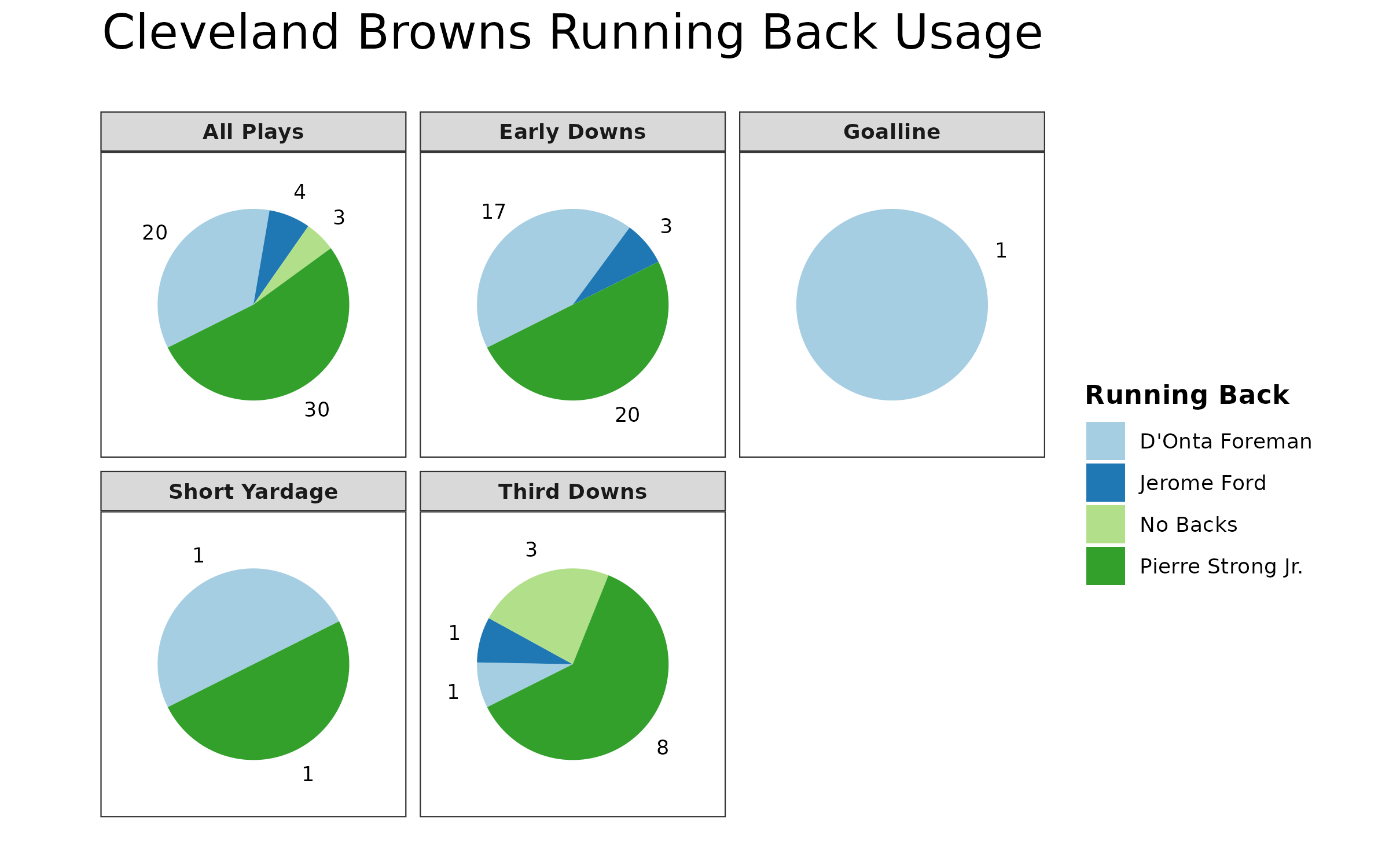
David Njoku sees a larger role in his second game back: Njoku was limited last week after returning from his ankle injury.
Njoku missed Weeks 2-4, and last week, he played significantly in 11 personnel early in the game and a limited role in 12 personnel. The Browns were down 24-3 at halftime in that game, so he barely played in the second half.
This week, he more regularly played in all personnel groupings, including every snap out of 12 personnel. In 11 personnel, he played 32 of a possible 36, while Geoff Swaim took 13 snaps in that personnel grouping. This ultimately led to 75% of Cleveland’s offensive snaps, which wasn’t as good as most games last season but still a strong step in the right direction.
He caught five passes for 31 yards and will be a borderline fantasy starter until the Browns offense starts playing better.
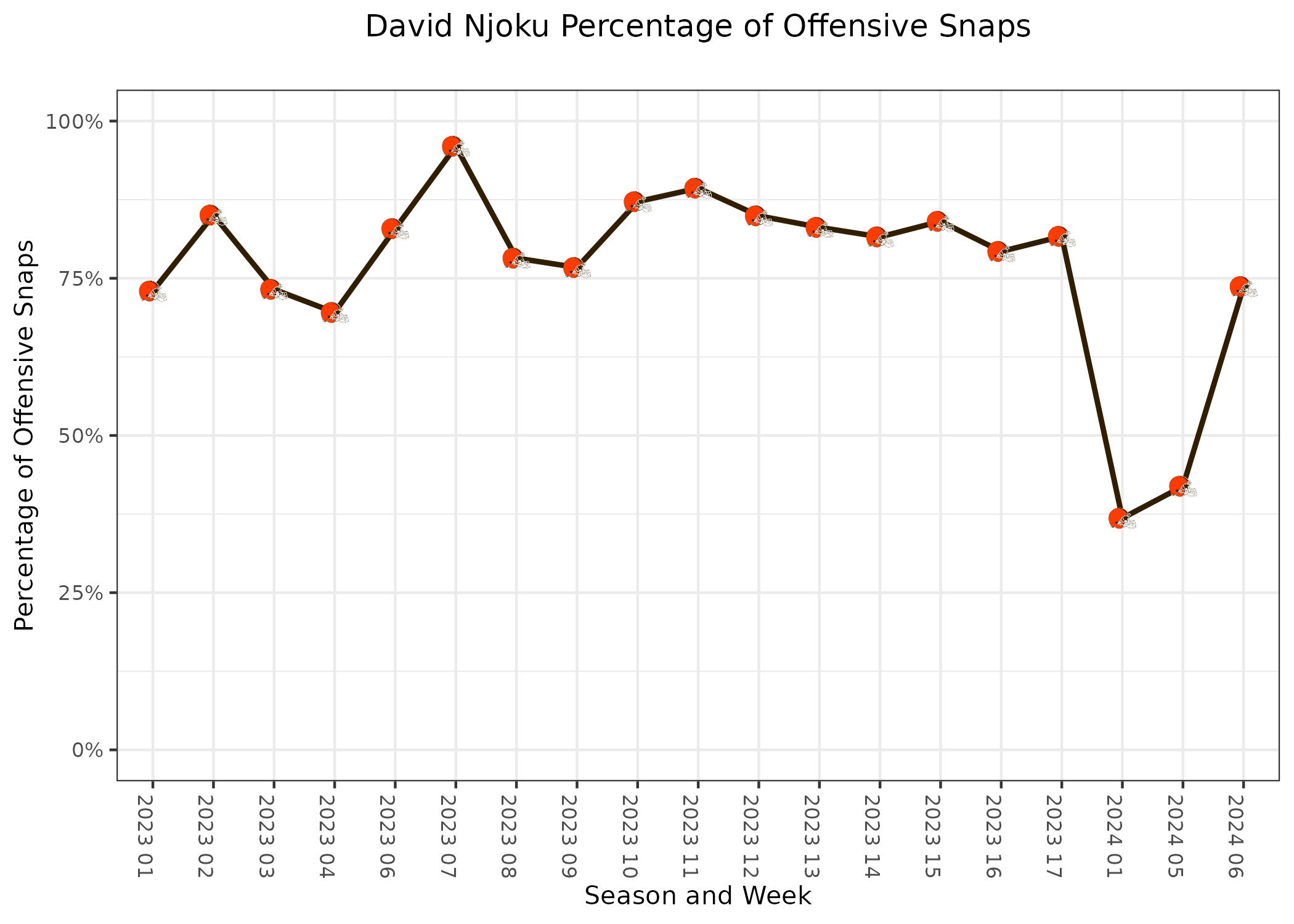
Monitor Dallas Goedert’s health: The Eagles’ star tight end left the game within the first minute due to a hamstring injury and didn’t return.
Goedert only lasted the first three offensive plays. He was initially deemed questionable and was ruled out during halftime. Grant Calcaterra took over as the primary tight end over the rest of the game, while Jack Stoll also played significant snaps, largely due to the Eagle using a lof of two tight end sets.
Calcaterra caught four passes for 67 yards. If Goedert misses time, there is a chance Calcaterra has fantasy value, but it wouldn’t be the most likely outcome. Goedert has the sixth-highest receiving grade for a tight end over the last three seasons while Calcaterra has been below average. Goedert’s targets per route in that time is 18.5% while Calcaterra’s is around 11%. Goedert has played especially well over the last month because A.J. Brown and DeVonta Smith were injured, but both are now back.
Goedert missed three games last season due to injury while Stoll, Calcaterra and Albert Okwuegbunam combined for three receptions on 93 routes in his absence. That being said, Calcaterra did earn the primary backup job over those two in the offseason, and this was his career-high in receiving yards and receptions. Calcaterra may be the best backup tight end for the Eagles of the last few seasons.
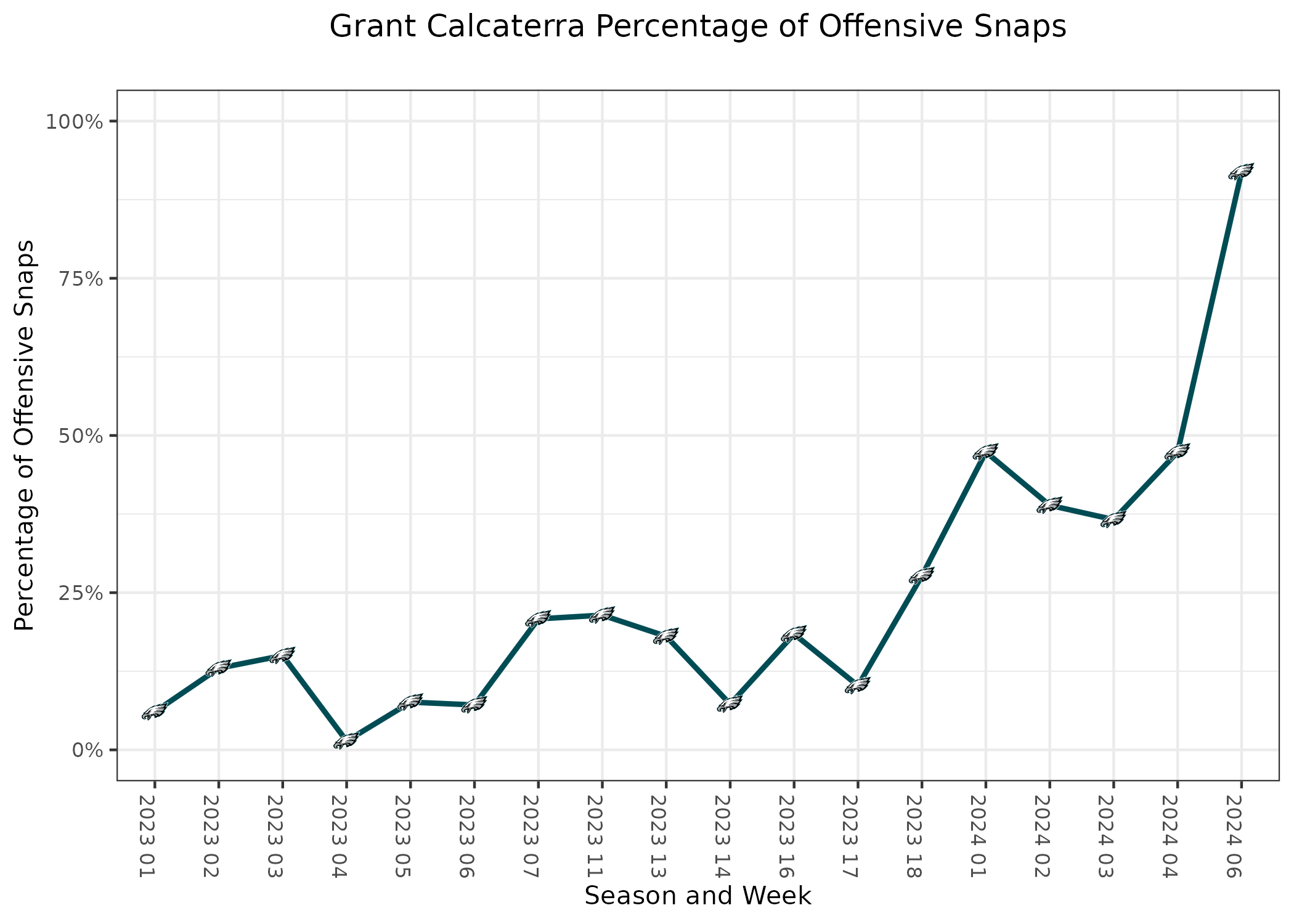
Eagles return to full strength at wide receiver: Both DeVonta Smith and A.J. Brown returned to the Eagles after missing time.
Brown had missed each of the last three games due to a hamstring injury, while DeVonta Smith missed the Eagles’ last game due to a concussion. Philadelphia had its bye week last week, which gave the team additional time to recover.
Smith went back to playing 100% of Philadelphia’s offensive snaps like he did the first two weeks, while Brown was back to playing over 90% of the team’s offensive snaps. Most of Brown’s missed snaps were downs to end the game. Both players had over 15 PPR points and will remain must-start players now that they are healthy again.
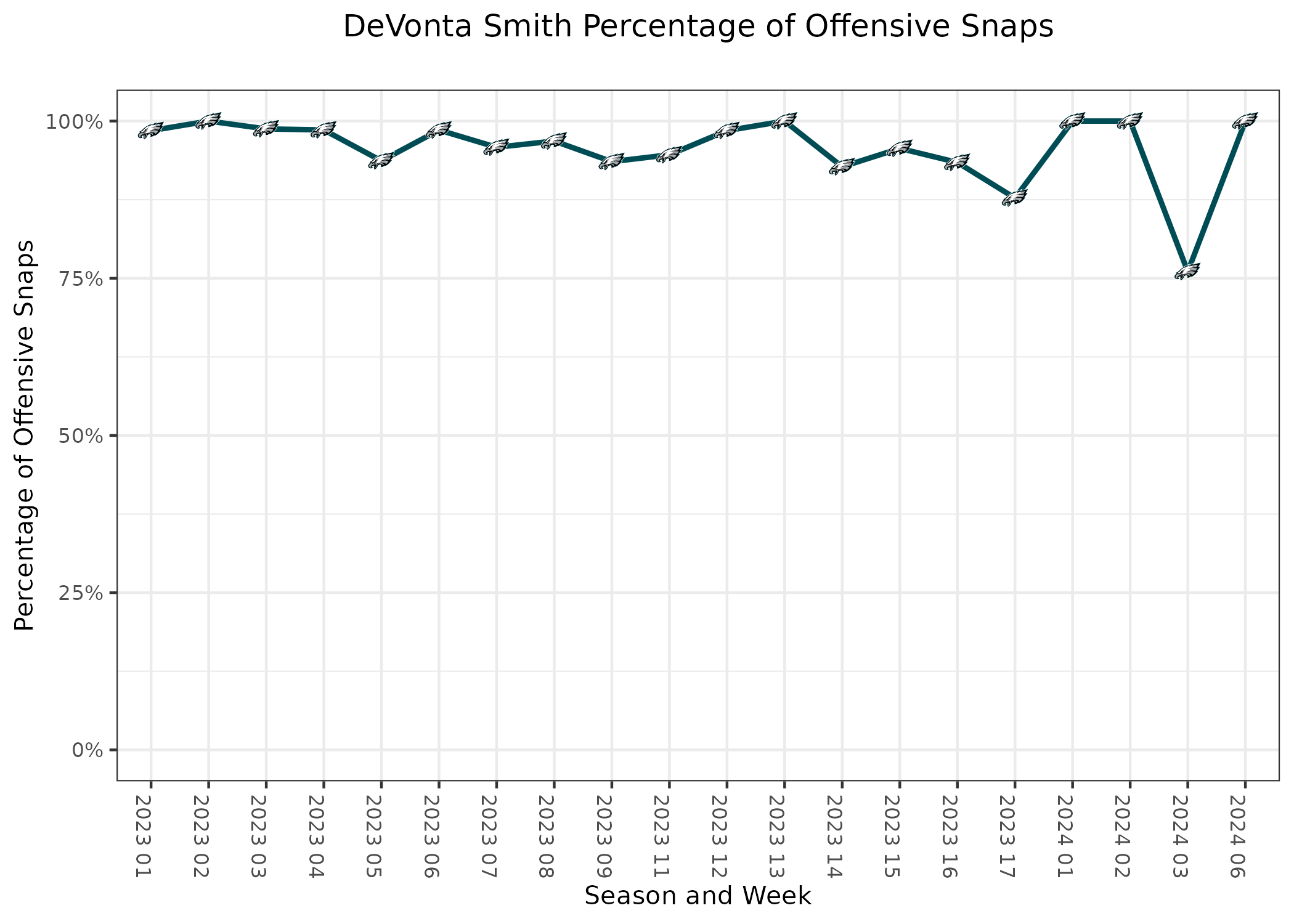
Miscellaneous Notes
- Nyheim Hines returned to practice two weeks ago. He was limited in practice all week and was not activated to the 53-man roster for this game.
- Eagles wide receiver Parris Campbell was signed to the 53-man roster rather than being a practice squad elevation. He didn’t play an offensive snap.
Indianapolis Colts @ Tennessee Titans
- Josh Downs: 7 receptions, 66 yards, 1 touchdown
- Tony Pollard: 17 carries, 93 yards, 1 touchdown, 3 receptions, -5 receiving yards
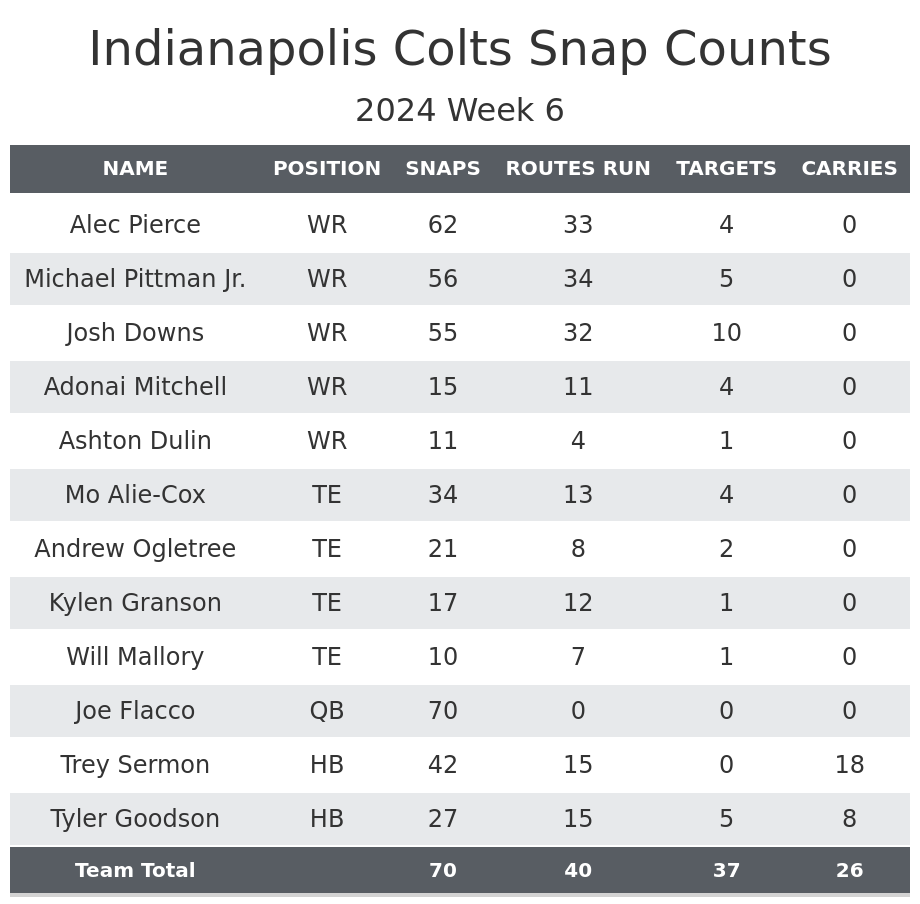
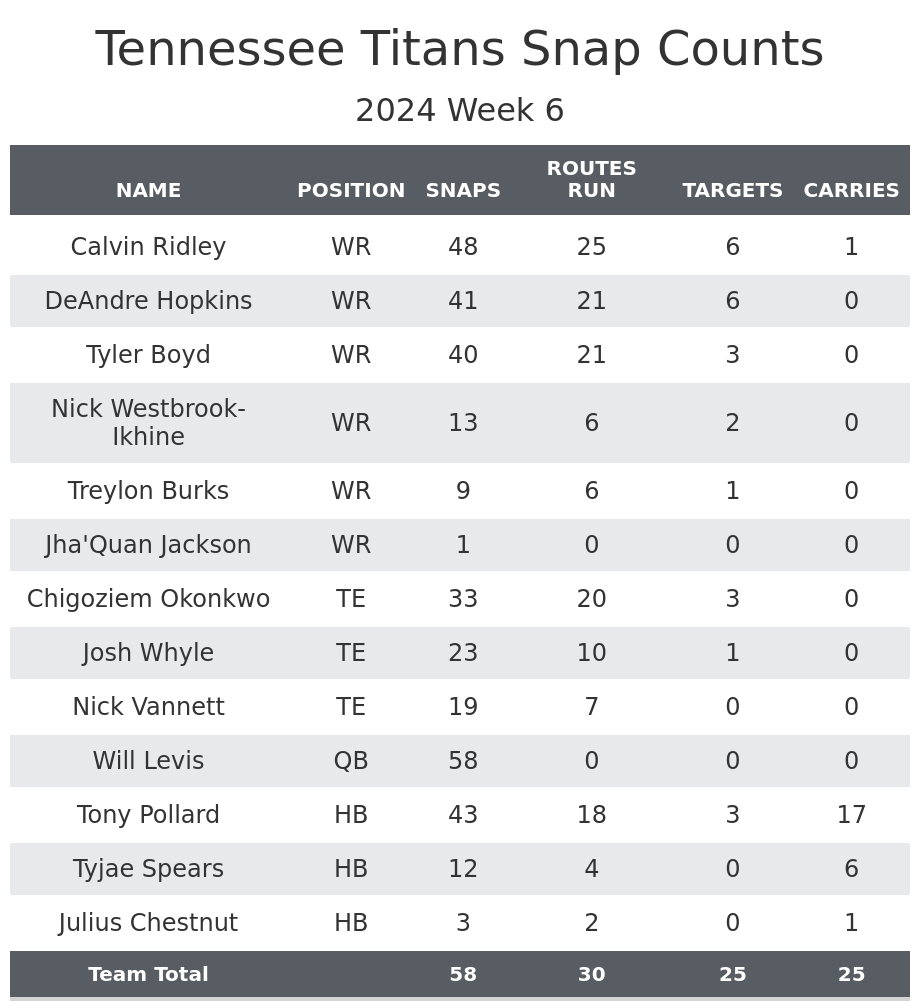
Colts tweak running back split: Jonathan Taylor missed his second straight game due to an ankle injury.
The Colts continued to use Trey Sermon and Tyler Goodson as their two running backs. Last week, Sermon played a majority of the early-down snaps, while Goodson had a slight majority of passing-down snaps. This week, Sermon played most of the passing downs but only a slight majority of early-down snaps. The only consistent part of the backfield was Sermon, getting most of the short-yardage and goal-line work.
Goodson was both more efficient as a rusher with eight carries for 51 yards and more active as a receiver with four receptions for 14 yards. Sermon averaged 1.6 yards per carry and didn’t see a target. If Taylor misses another game, it’s a toss-up as to which running back would have the better game. Sermon has a better chance in these roles, but it’s possible they would give Goodson more work after his strong game.
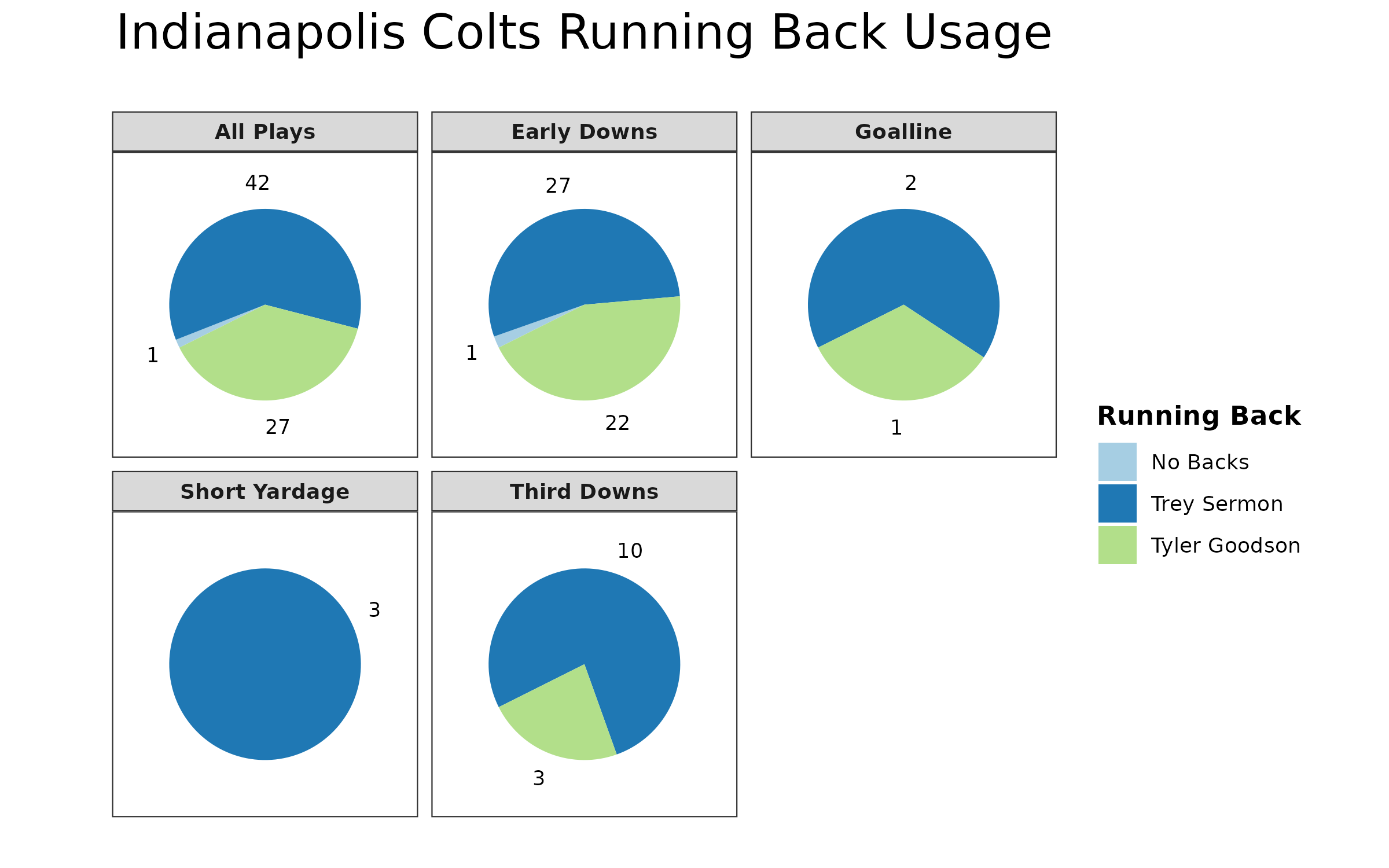
A familiar Colts wide receiver rotation: After a wild week of news for Colts wide receivers, the rotation was very similar to most games over the past two seasons.
Last week, the Colts began using Adonai Mitchell more often, but then Alec Pierce caught three passes for 134 yards and a touchdown. Both Josh Downs and Michael Pittman were questionable for this game, Downs due to a toe injury and Pittman due to a back injury. There was even talk this week of Pittman landing on injured reserve to give him time to recover.
Instead of anything abnormal, Pittman, Pierce and Downs all played in 48 or more of a possible 58 snaps out of 11 personnel. Pierce took every snap out of 12 personnel, while Pittman and Downs split the other snaps. Downs had only taken four snaps in 12 personnel this season prior to this game.
Pittman and Downs are both worth considering in fantasy starting lineups despite their health, while Pierce will likely remain very inconsistent from one week to the next, just depending on whether he catches his deep targets or not.
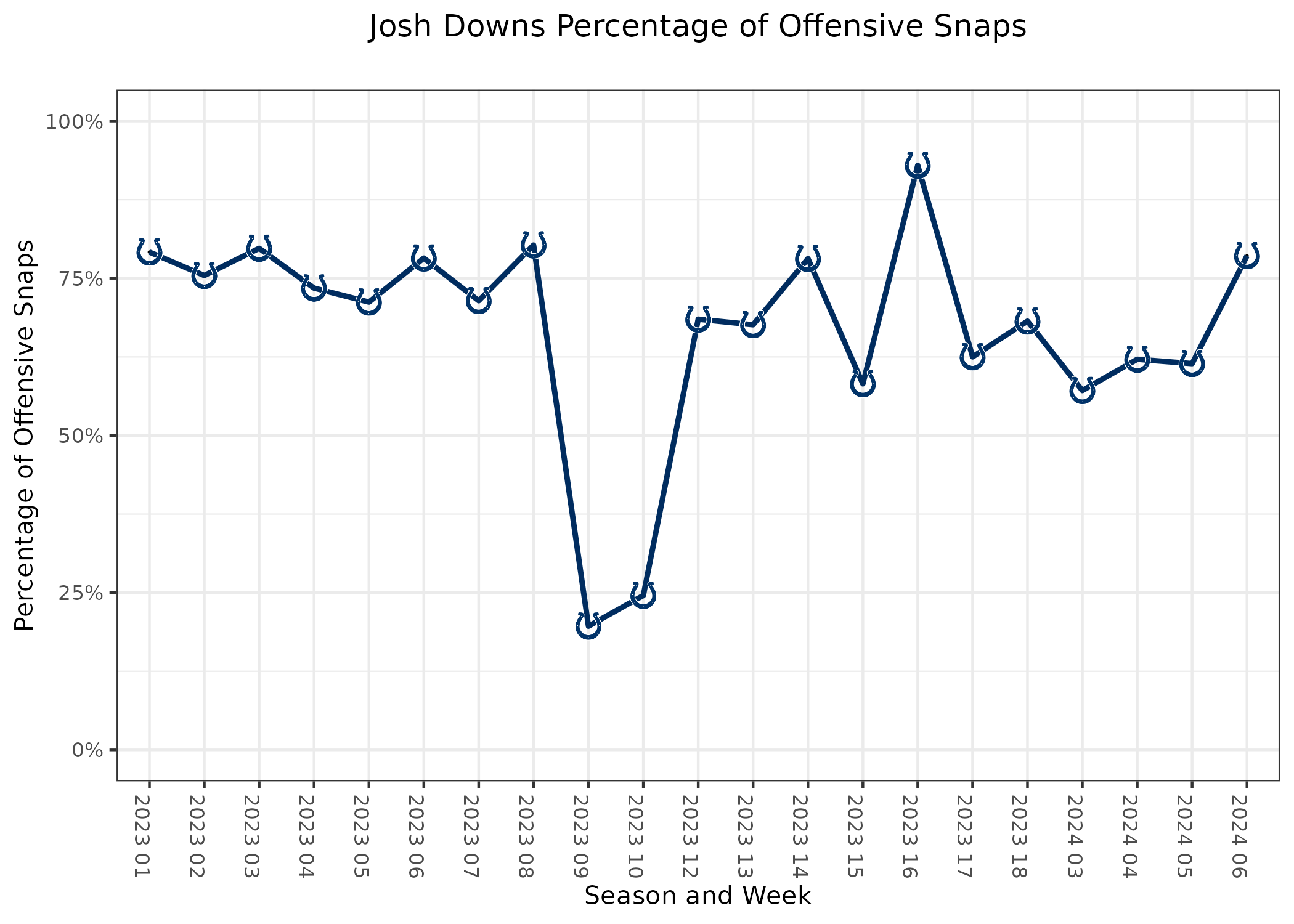
Monitor Tyjae Spears’ health: Spears suffered a hamstring injury and didn’t play in the second half.
In the first half, the Titans’ backfield split was relatively normal. Tony Pollard played 16 snaps to Spears’ 12. Spears did not play at all in the second half, leading the Titans to lean heavily on Pollard.
Pollard played 27 of a possible 30 snaps in the second half, including every snap in the fourth quarter. Pollard had already reached the point where he was a must-start player, but if Spears misses time, then Pollard has the potential to be a top-10 fantasy running back for as long as Spears is out. Julius Chestnut would be the new handcuff in Tennessee, but he’s unlikely to have standalone value, and if the Titans lose both Pollard and Spears, they may look elsewhere for a solution at running back.
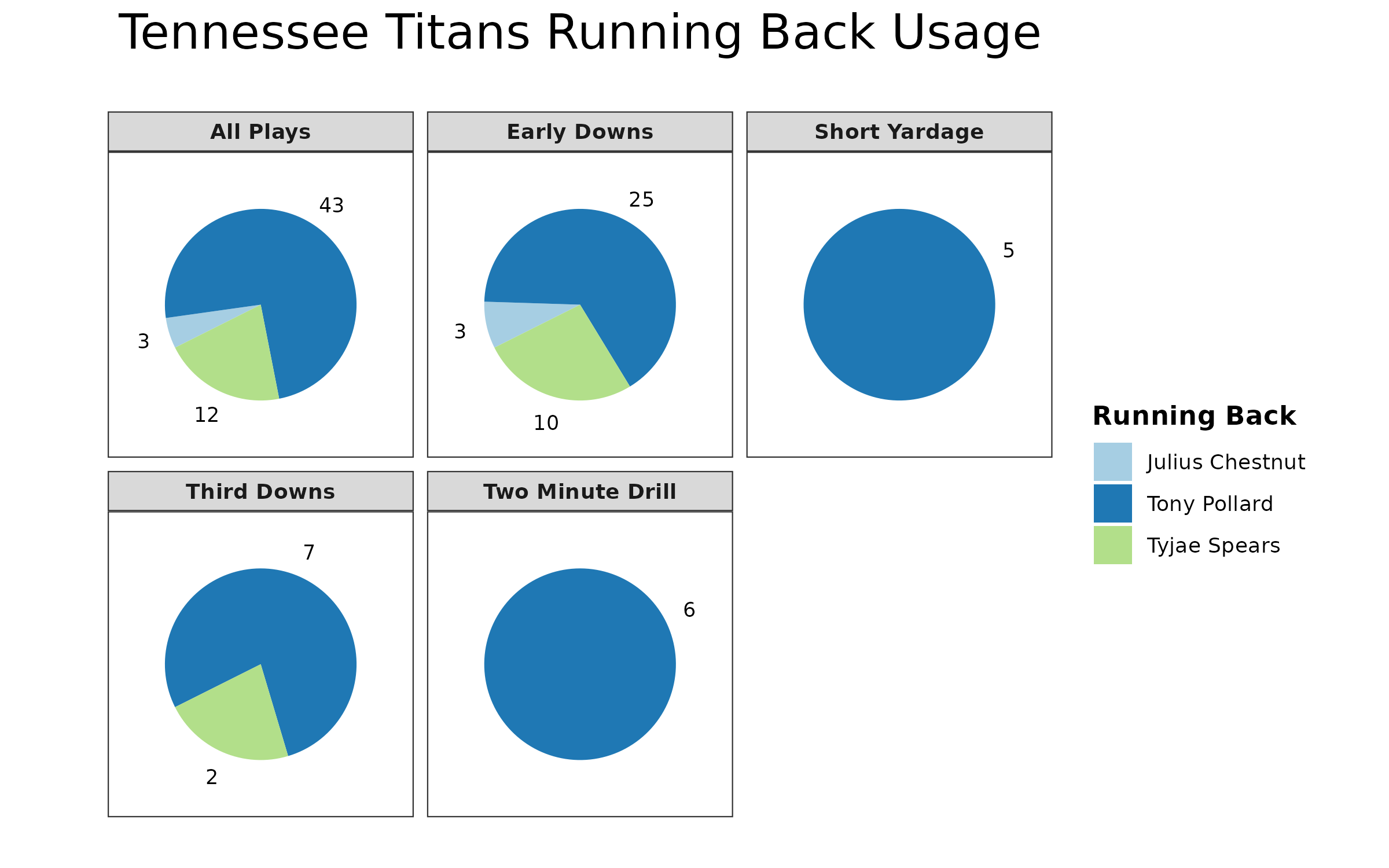
DeAndre Hopkins finally sees the playing time like a starter: The future Hall of Fame wide receiver was playing less than 50% of Tennessee’s offensive snaps.
Hopkins suffered an MCL tear at the end of July, which caused him to miss training camp and be limited throughout the first four weeks of the season. He was only playing 41% of Tennesee’s snaps in 11 personnel and 29% in 12 personnel, mostly playing in the most important passing situations.
This week, he continued to rarely play in 12 personnel with only a 31% snap rate, but in 11 personnel, his snaps burst up to 86% of Tennessee’s offensive snaps. This meant Treylon Burks didn’t play nearly as much as the last four weeks. This makes it much safer to put Hopkins in fantasy starting lineups going forward.
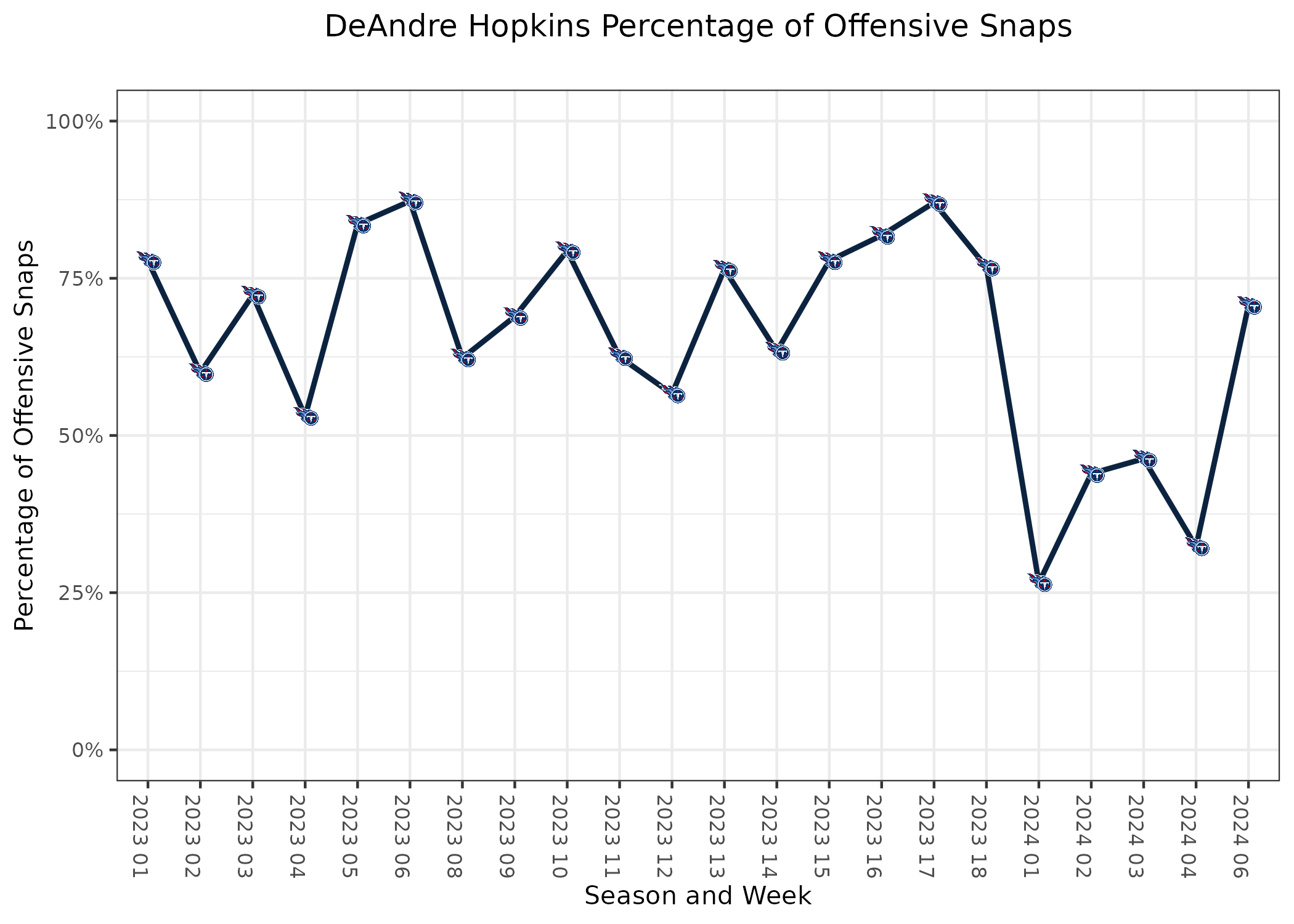
Miscellaneous Notes
- Tight end Chigoziem Okonkwo had run a route on 55.8% of the Titans’ pass plays over the first four weeks compared to Josh Whyle‘s 37.5%. This game was a step in the right direction for Okonkwo’s fantasy value and a step further away for Whyle.
- Colts running back Evan Hull was signed to the active roster rather than being a practice squad elevation, but he didn’t play an offensive snap.
Los Angeles Chargers @ Denver Broncos
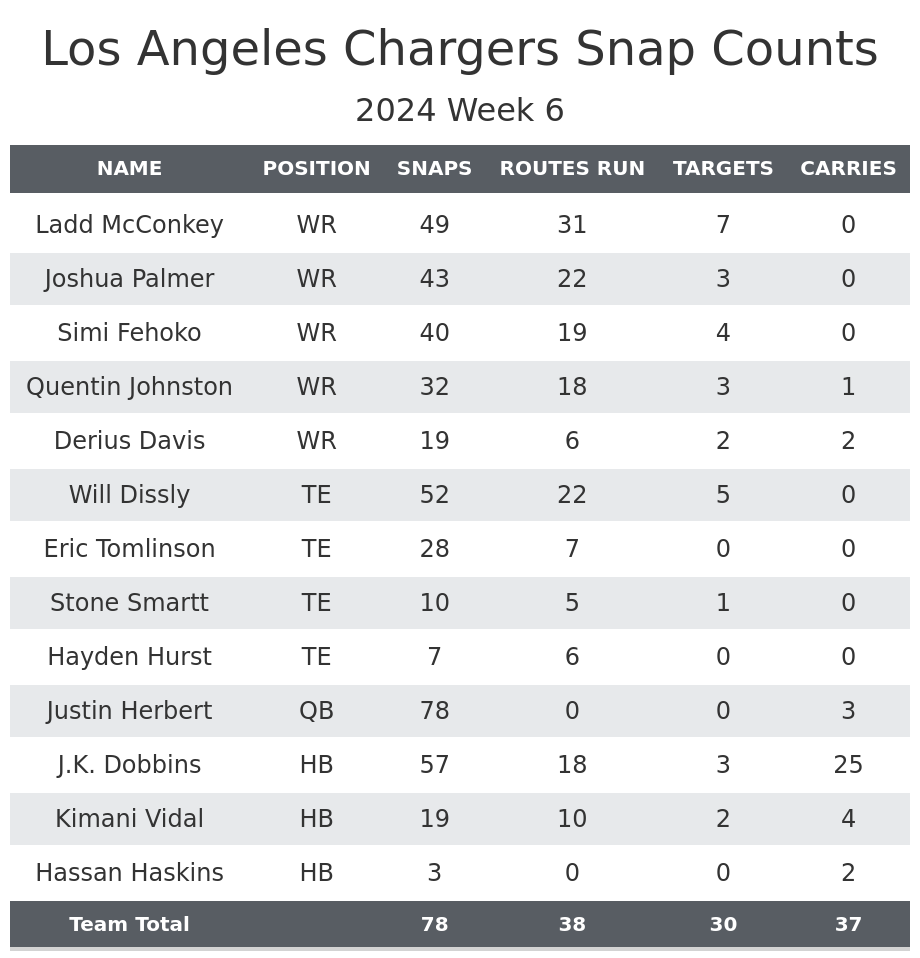
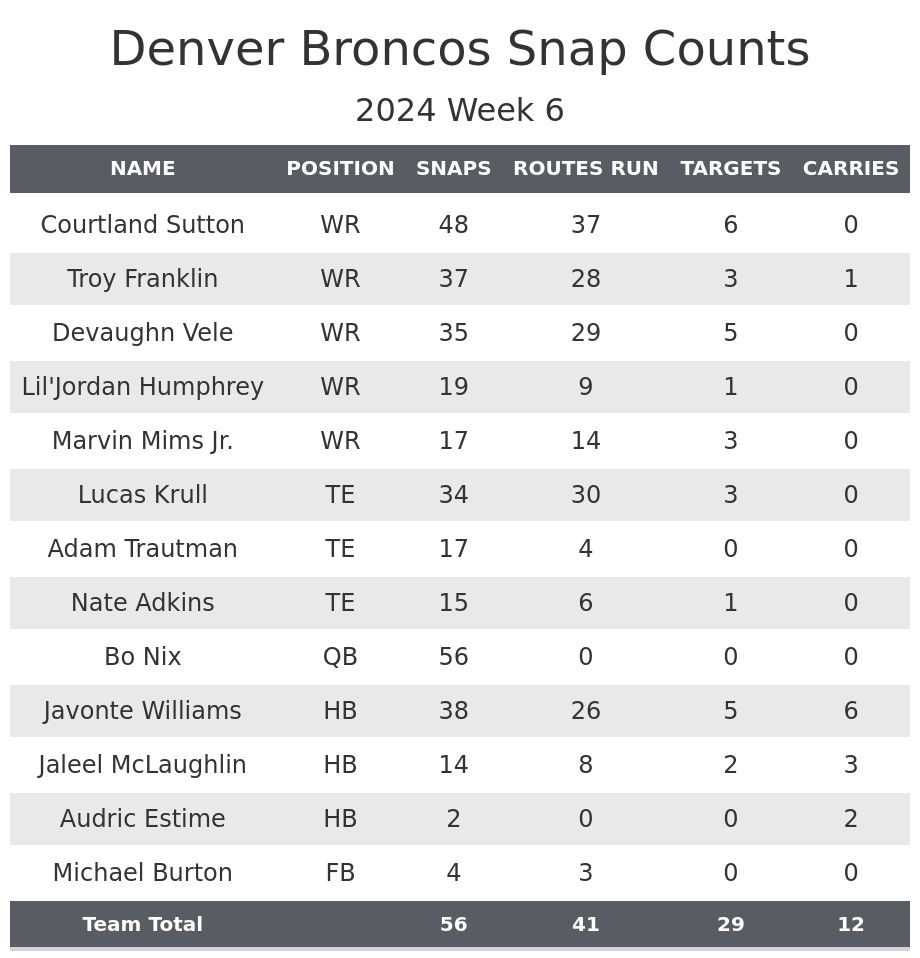
Kimani Vidal makes his debut: The rookie running back scored a touchdown in his first game.
Gus Edwards was put on injured reserve due to an ankle injury that will keep him out for at least the next three games. Hassan Haskins had been the third running back on game day, but this was largely for special teams reasons.
The sixth-round rookie was the second running back throughout this game. Dobbins consistently played the drive’s first snap and then after a play or two, Vidal would rotate in. The two would continue rotating throughout each drive.
Currently, the Chargers still view Dobbins as their clear lead running back due to how much he played and was given the ball over Vidal. If we reach a point this season where Vidal is outperforming Dobbins, then the Chargers can easily change the rotation to make Vidal start drives instead of Dobbins. They had already changed the rotation early in the season from Edwards starting to Dobbins.
This means Vidal is worth a target off the waiver wire, but for now, Dobbins can safely remain in fantasy starting lineups.
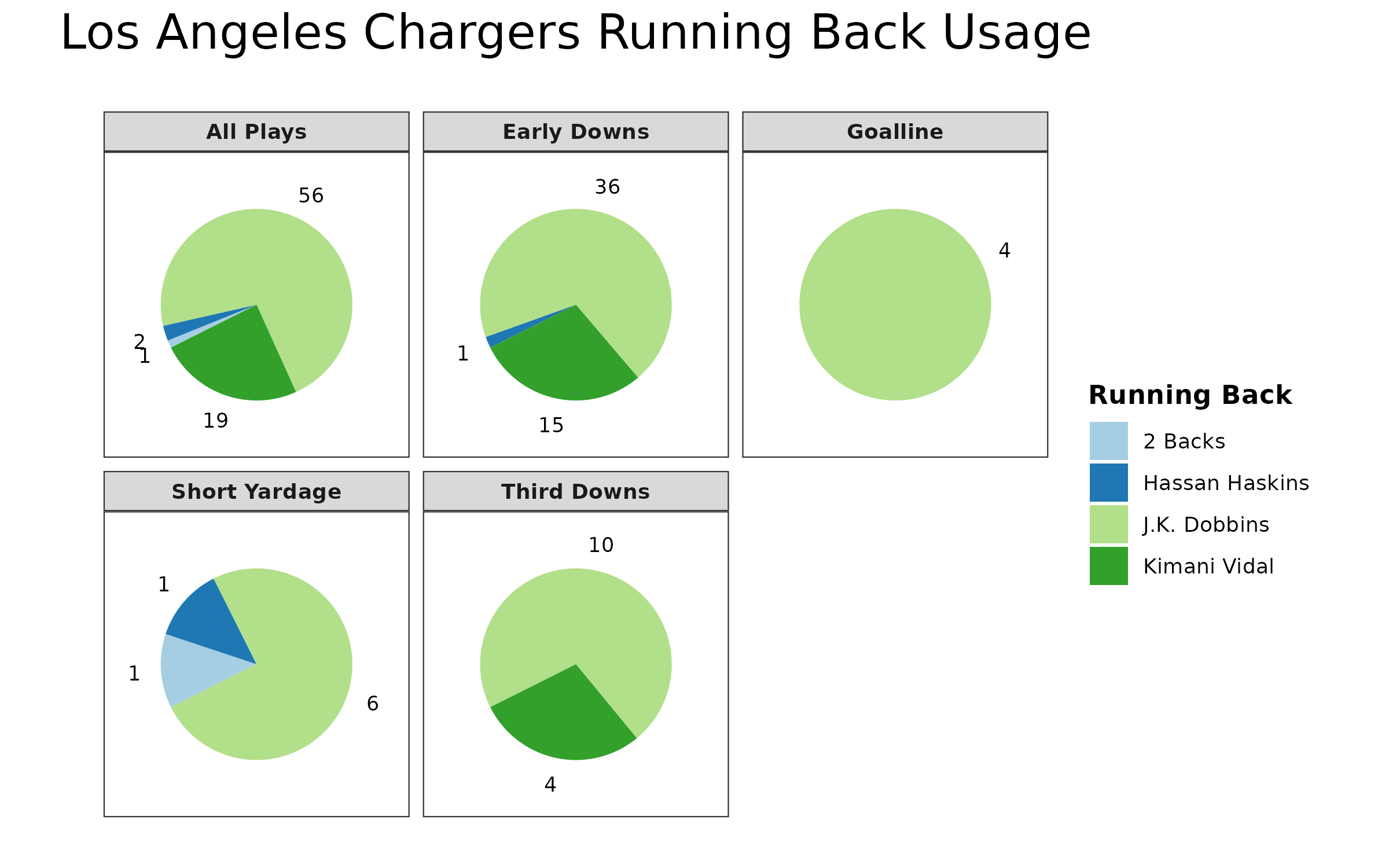
Simi Fehoko takes a larger role: Fehoko became a major part of the Chargers wide receiver rotation.
In Week 4 before the Chargers’ bye week, Joshua Palmer, Ladd McConkey and Quentin Johnston all played 43-44 of a possible 56 offensive snaps, including at least 25 of the 31 pass plays. Fehoko was the only backup to play with 12 snaps.
This week, Fehoko had the third-most snaps and third-most routes, playing more than Johnston. Derius Davis also saw played significant snaps.
Generally, Palmer and McConkey played in 11 personnel, while Fehoko and Johnston split time. Outside of 11 personnel, it was a heavy rotation. McConkey and Fehoko were the primary receivers. Fehoko ended up leading the team in receiving yards at 44, but it was clear McConkey was the top target. He caught four passes for 43 yards.
McConkey will likely be the only wide receiver on the team to trust with this kind of rotation. Both Palmer and Johnston can potentially be cut depending on the size of your league.
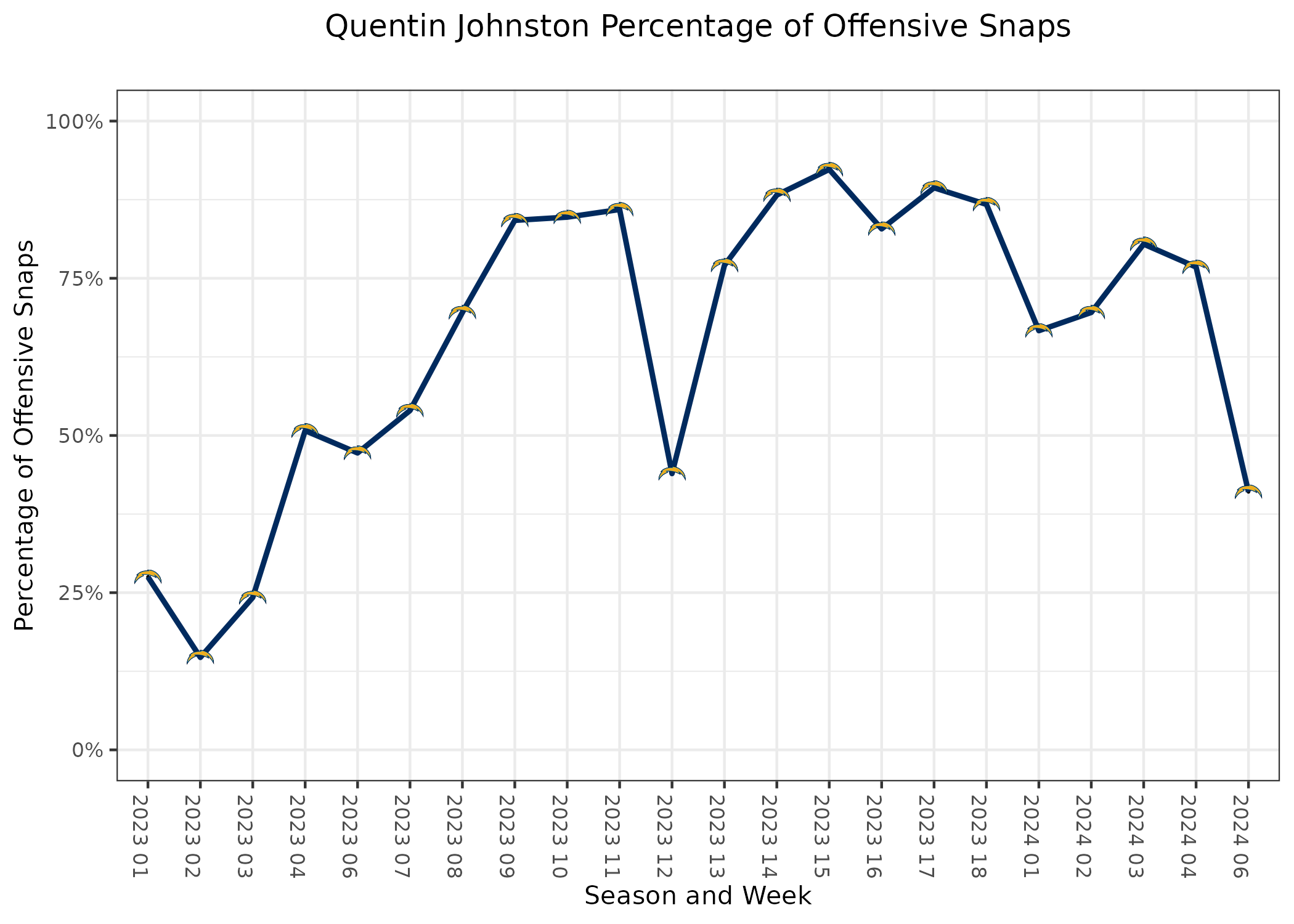
Monitor Hayden Hurst’s health: The Chargers receiving tight end suffered a groin injury and didn’t return.
Hurst started the game in his normal role, playing most of the 11 and 12 personnel snaps. He played six of nine snaps on the first drive and suffered his injury on the second drive. Will Dissly took over as the primary receiving tight end over the rest of the game.
Dissly is known as a blocking tight end, but he’s caught at least 150 receiving yards each season from 2018-2023. Despite having the larger role, there were still several plays out of 11 personnel where he was off the field for one of the other tight ends. He caught four passes for 26 yards. There are likely better options off the waiver wire if you are looking for a tight end, even if Hurst misses time.
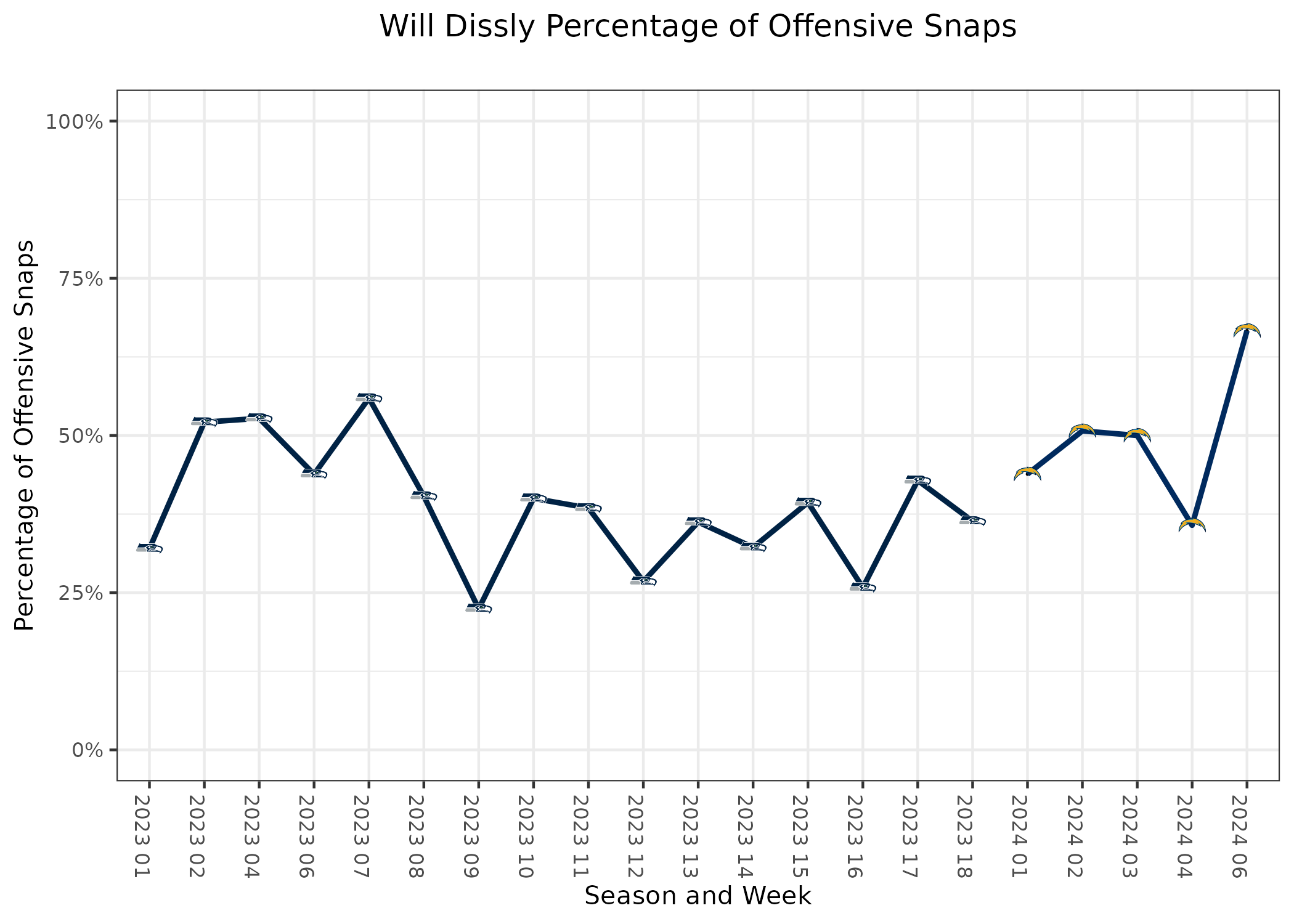
Devaughn Vele re-emerges: The Broncos’ seventh-round rookie has reached 11 PPR points in each of his NFL games.
Josh Reynolds suffered a hand injury, which landed him on injured reserve. This allowed Vele, who had been inactive the last four games, to be active. Vele caught eight passes for 39 yards in Week 1 but then suffered an injury. Once he was healthy, the Broncos opted to keep him inactive for whatever reason.
Both Vele and Troy Franklin saw an increase in playing time, not just taking the snaps from Reynolds but also significantly cutting into Lil’Jordan Humphrey’s playing time. Vele was tied for the team lead in targets and receptions, leading to 78 yards. Franklin scored his first NFL touchdown.
The Broncos wide receiver rotation, outside of Courtland Sutton being on the top and Marvin Mims Jr. being fifth, has been unpredictable, but Vele is a waiver-wire option considering his consistency when given the change. Franklin can also be considered, given his increase in playing time.
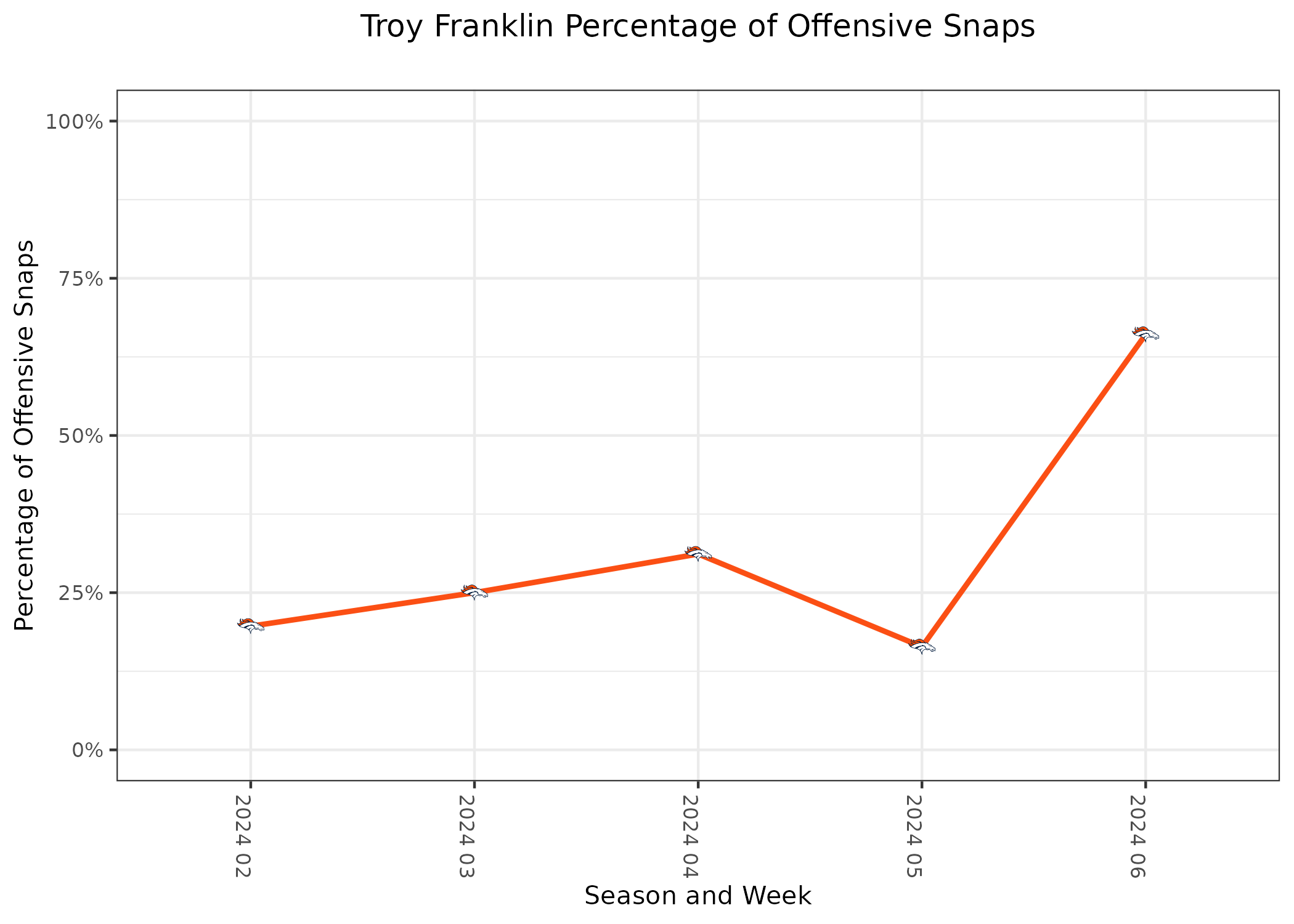
Miscellaneous Notes
- Audric Estime returned from injured reserve (ankle injury). The Broncos eased him into action with two runs. Given the relative inefficiency of the Broncos’ two other running backs, Estime may see a larger role going forward.
- Broncos tight end Greg Dulcich was a healthy inactive for a second-straight week after being the Broncos primary receiving tight end the first four weeks.
Pittsburgh Steelers @ Las Vegas Raiders
- Najee Harris: 14 carries, 106 yards, 1 touchdown, 2 receptions, 16 receiving yards
- Alexander Mattison: 14 carries, 33 yards, 1 touchdown; 5 receptions, 32 receiving yards
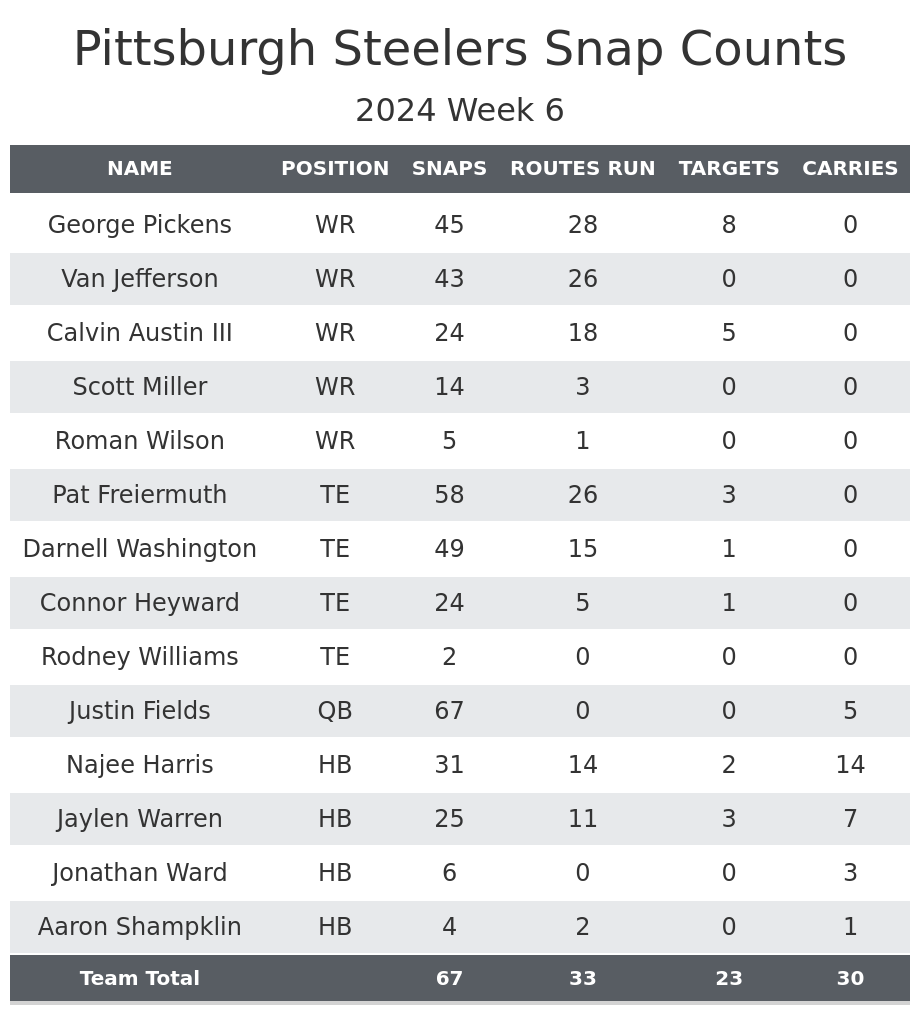
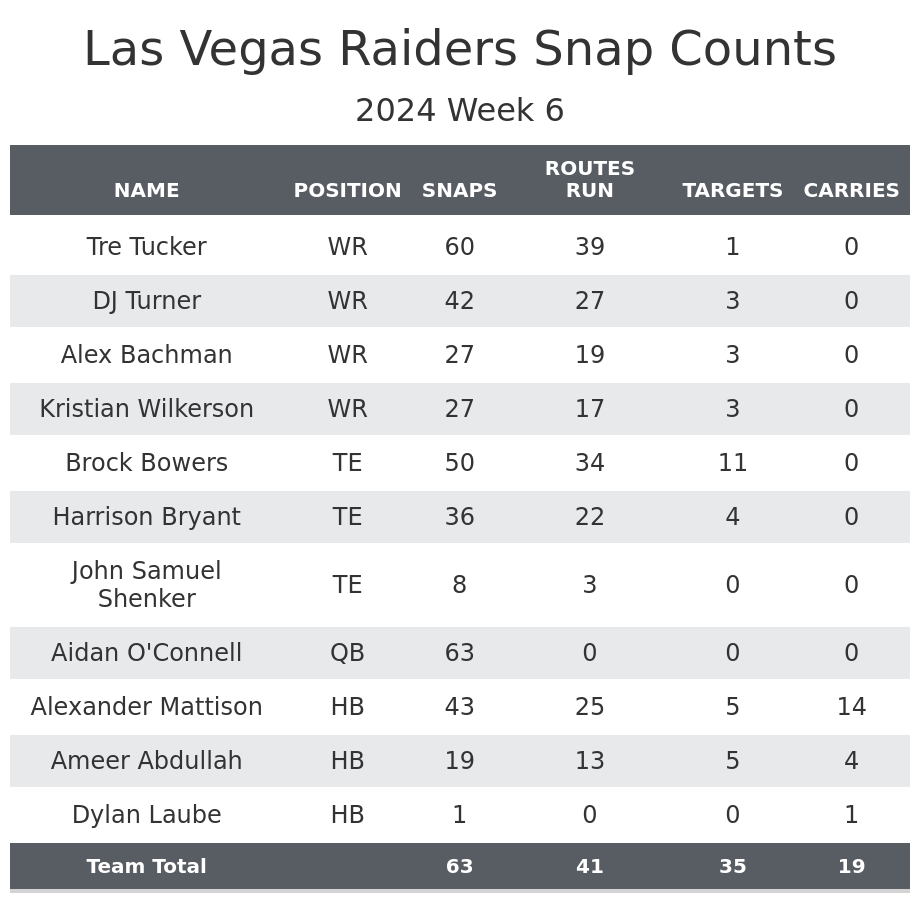
Jaylen Warren returns: Warren had missed the last two weeks due to a knee injury.
Cordarrelle Patterson was out due to an ankle injury, which largely made this a two-man backfield. The split in snaps largely resembled last season. Harris received most of the early down work while Warren took the passing downs. While both Jonathan Ward and Aaron Shampklin played, they combined for one snap in the first three quarters.
Warren’s playing time was great to see, but he only gained seven yards on his six carries. He was tied for the team lead in receptions at three, gaining 11 yards. A big part of Warren’s appeal to fantasy managers is how much more effective Warren had been as a runner than Harris, but Harris had his best game of the season with 7.6 yards per carry.
It’s still possible Warren can play better once he’s healthier, but he has a lot working against him. Harris, Patterson and Justin Fields are all competing for carries, and Fields doesn’t throw to running backs as much as other quarterbacks. It’s hard to find a clear path for Warren to be a fantasy starter outside of an injury to Harris.
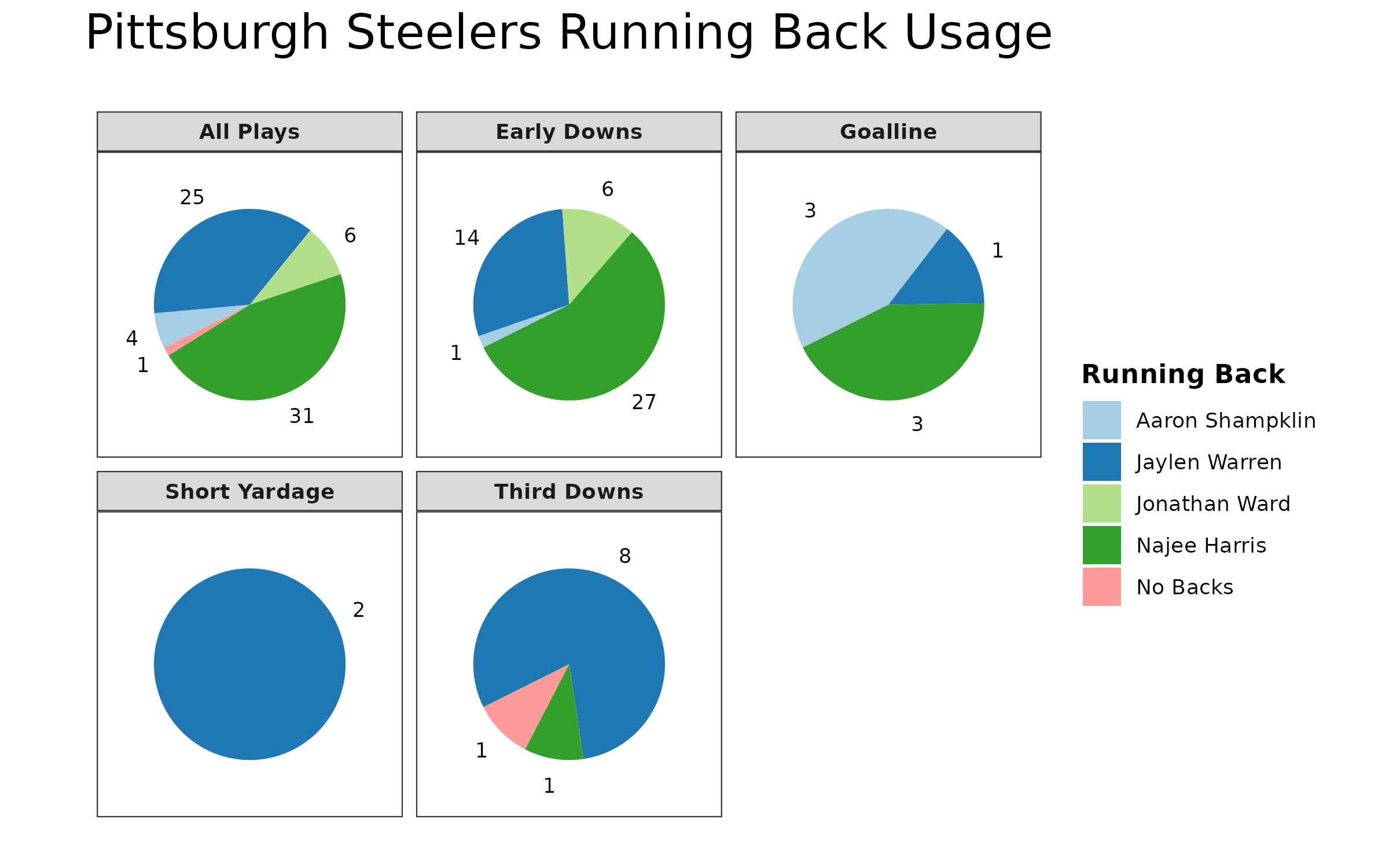
George Pickens’ role somewhat bounces back: Pickens saw a sharp decline in offensive snaps last week.
Pickens’ playing time varied from one week to another, but that was largely based on how much the Steelers used 13 and 14 personnel. Pickens had played 97% of Pittsburgh’s 11 personnel and 79% of 12 personnel snaps over the first four weeks compared to just 20% of Pittsburgh’s 13 personnel snaps. Typically, 13 personnel doesn’t matter too much for wide receivers because those are largely run plays.
Last week, Pickens only played in one of 18 snaps in 12 personnel, leading to eight pass plays where Pickens was off the field. He also didn’t play in 13 personnel, which led to another three plays where he wasn’t on the field.
This week, he played 12 of 20 snaps out of 12 personnel, including eight of the 10 pass plays. He also played eight of 19 snaps out of 13 personnel, including four of six pass plays. This meant he was off the field a lot like last week, but the vast majority of the plays he missed were run plays, unlike last week.
He should remain fantasy-relevant if he can maintain this role. He led the team in targets but only brought in three passes for 53 yards.
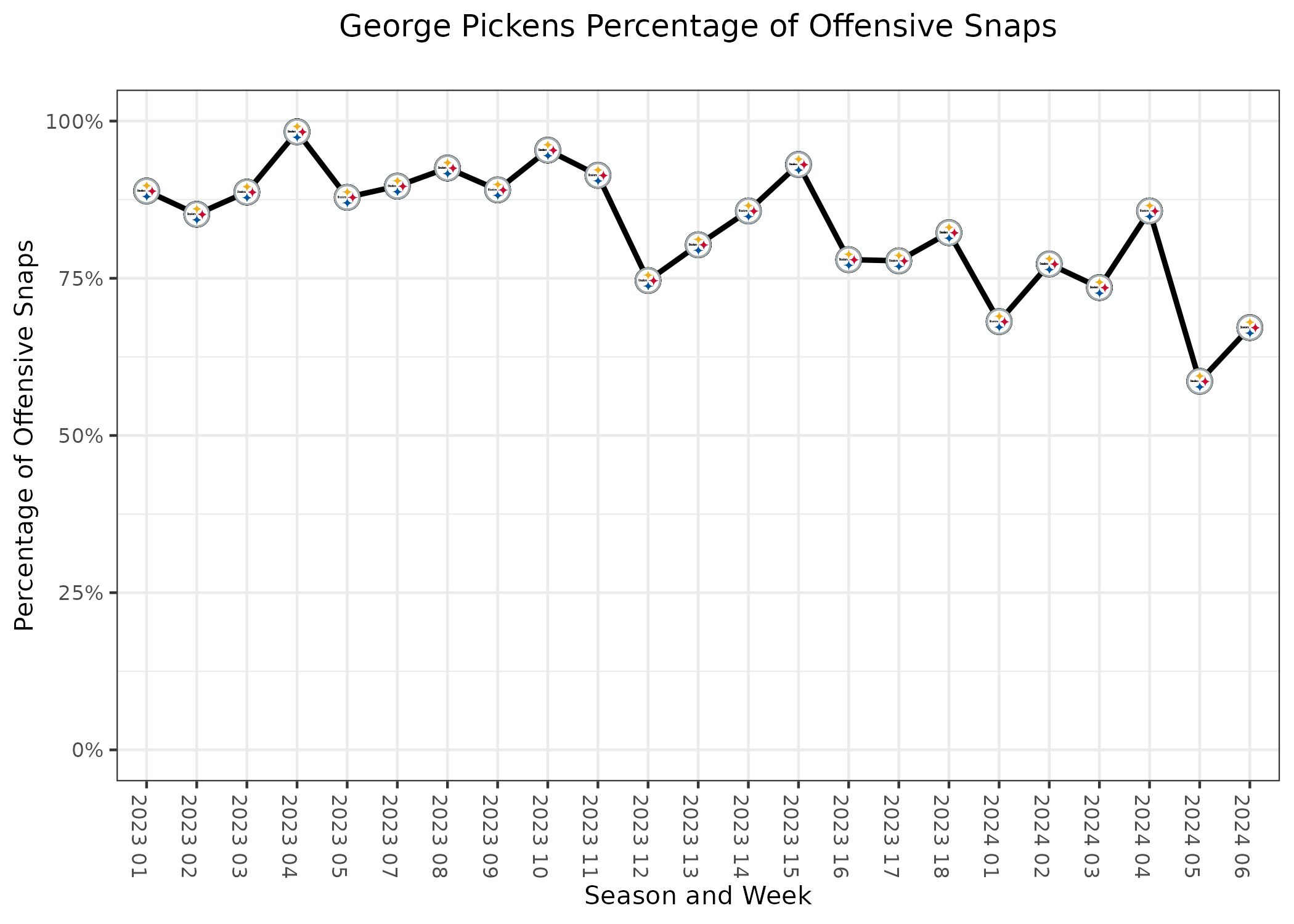
Alexander Mattison leads for the second-straight game: Zamir White was again inactive due to a groin injury.
Last week, Mattison played most of the first three quarters but was ineffective, leading Ameer Abdullah to play the fourth quarter. This week, Mattison remained the lead back, while Abdullah had more of a role throughout the game.
Anyone who started Mattison was probably happy with both the touchdown and the five receptions, but he only averaged 2.4 yards per carry. At this point of the season, White and Mattison’s rushing numbers are near-identical — 46-49 carries for 3.1-3.4 yards per carry with six avoided tackles each. The only difference is Mattison has scored touchdowns while White has two fumbles.
We may see a three-man rotation once White is back rather than a two-man rotation given that Abdullah has played well on a very limited sample size as a rusher. Dylan Laube took his first offensive snap late in the second quarter and fumbled the ball, making it his only offensive snap. It’s possible he would have been more involved without the fumble, and he could also be involved going forward.
This is largely a backfield to avoid going forward until someone can average four yards per carry.
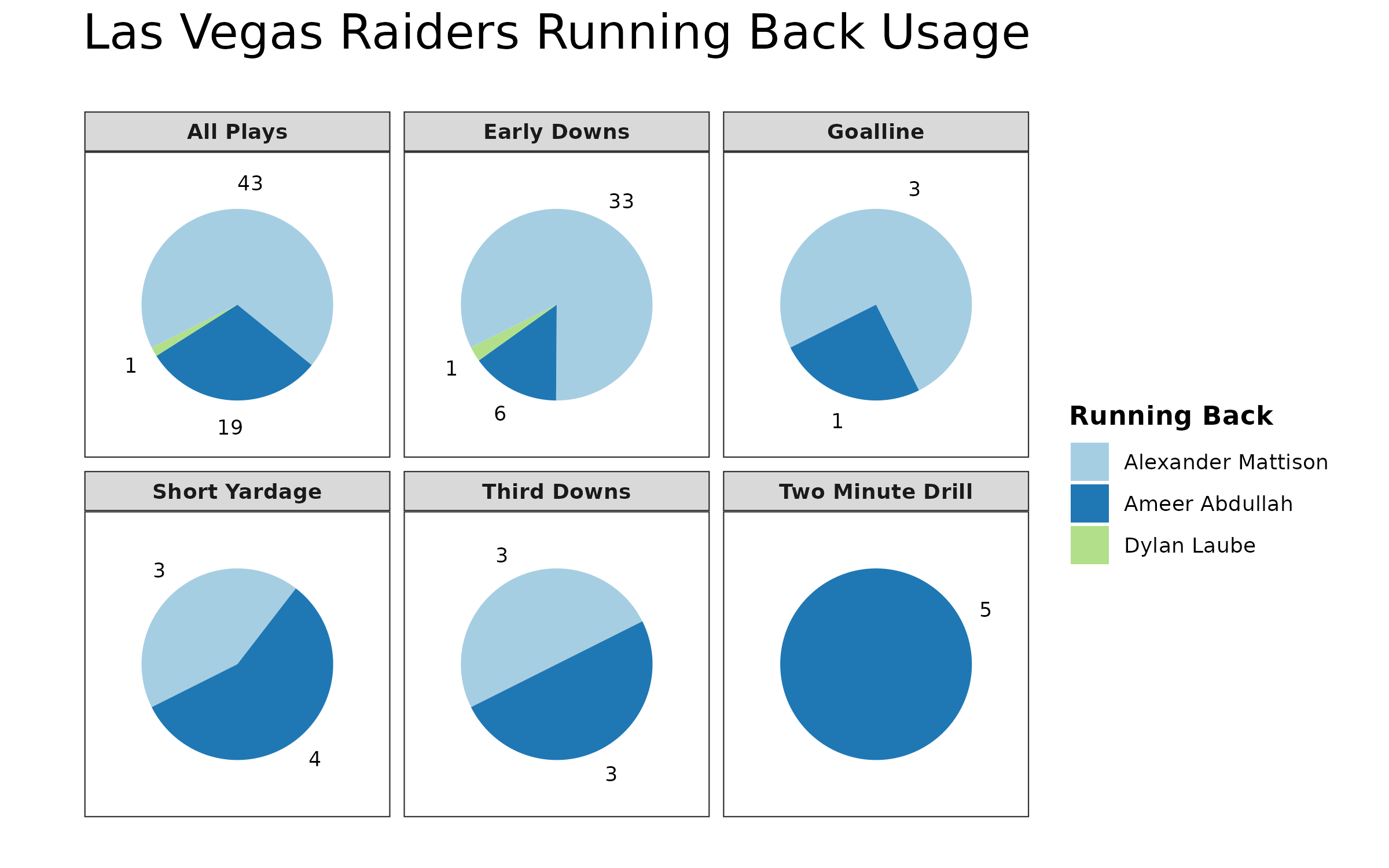
Raiders dig down the wide receiver depth chart: Davante Adams remains out due to a hamstring injury, while Jakobi Meyers was doubtful due to an ankle injury.
Tre Tucker was the lead wide receiver in terms of playing time, but he didn’t catch his only target. He was the Raiders’ most accomplished receiver heading into this game.
D.J. Turner was the primary slot receiver, while Alex Bachman and Kristian Wilkerson both saw time outside. Turner has been with the Raiders in some capacity since 2021, and he doubled his career receptions in this game with two receptions. Bachman has been in the league since 2019, running 21 routes with the New York Giants in 2020 and 2021. His three receptions in this game were his first three receptions. Wilkerson has been in the league since 2020. He was the most accomplished receiver of the three with four receptions in 2021. He caught two passes in this game.
This basically meant Brock Bowers could post a dominant target share. This was his third game in six weeks with at least a 30% target rate.
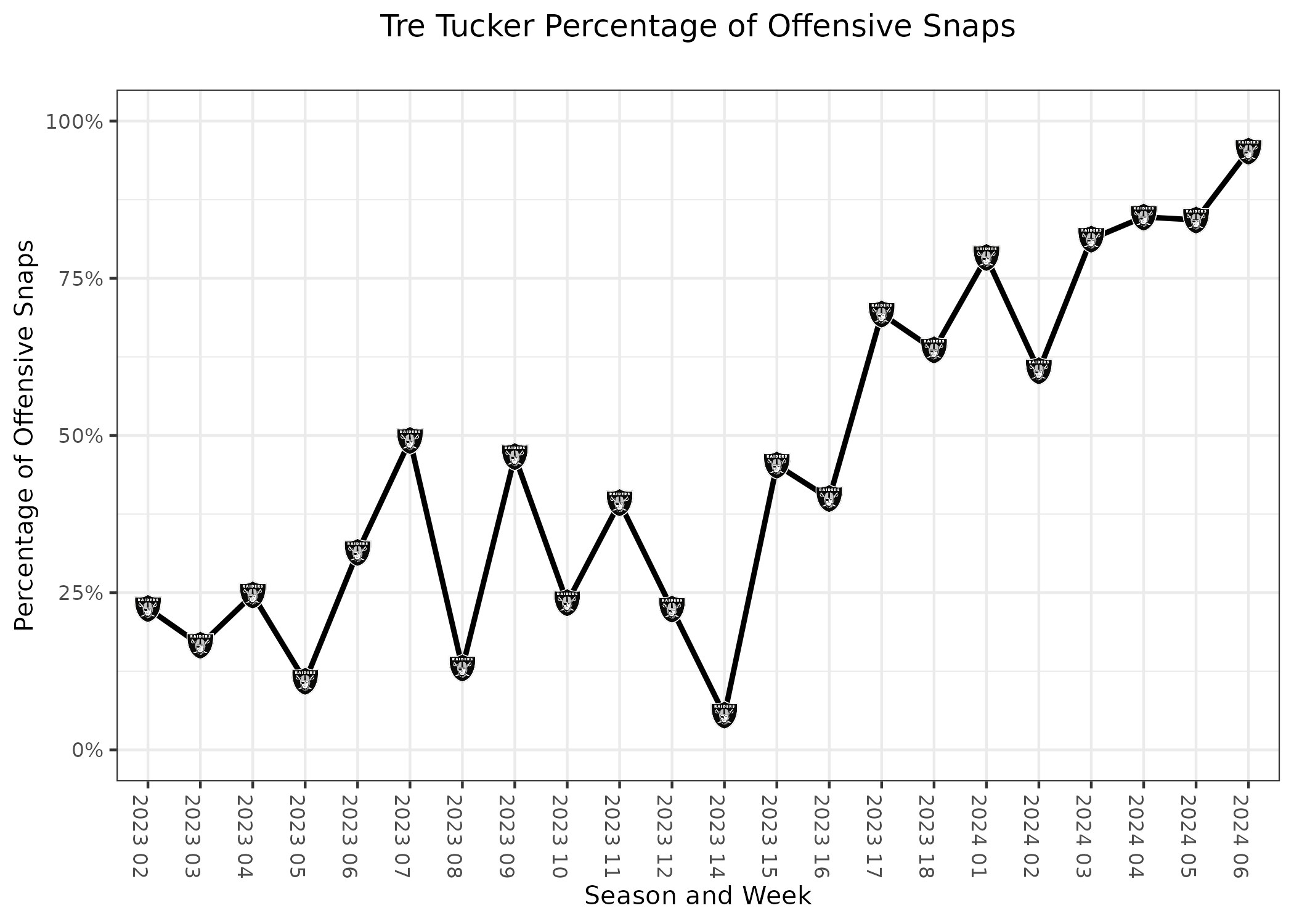
Miscellaneous Notes
- Roman Wilson was active for the first time this season. He missed most of training camp and the first few weeks of the season due to injury, and then it took a few weeks of practice for him to be ready to play. He primarily took snaps from Calvin Austin III in 11 personnel.
- Steelers third tight end MyCole Pruitt missed his fourth straight game due to a knee injury.
- Raiders backup tight end Michael Mayer was placed on the non-football illness list due to a personal issue. He has missed the last three games and will miss at least the next three games.
Atlanta Falcons @ Carolina Panthers
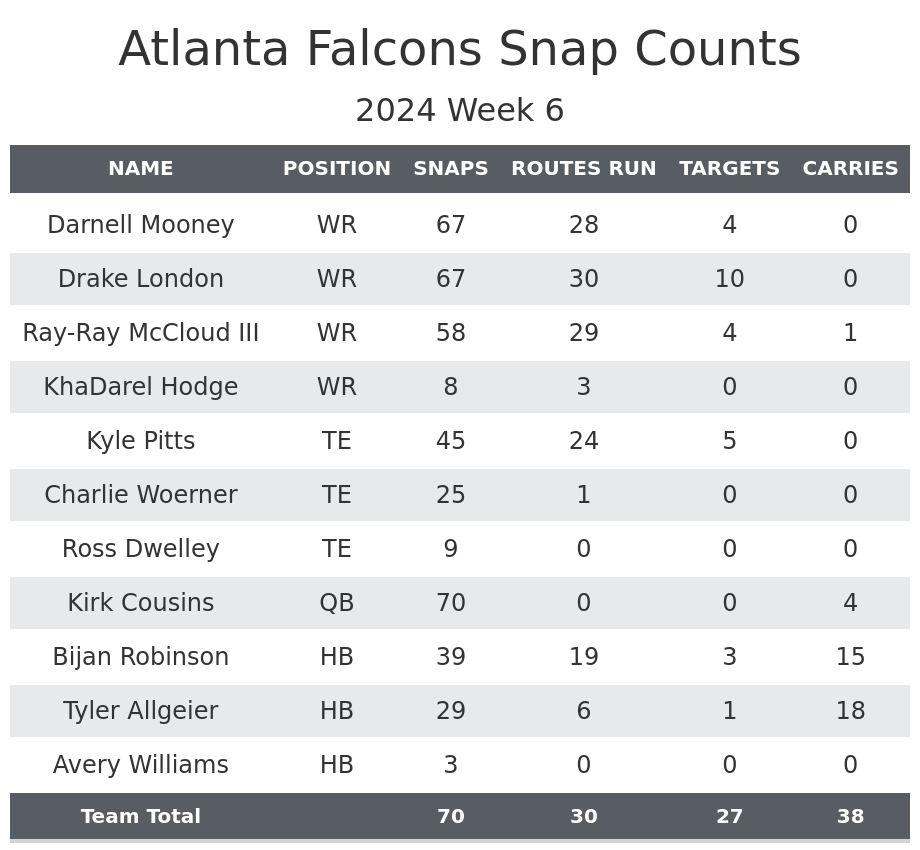
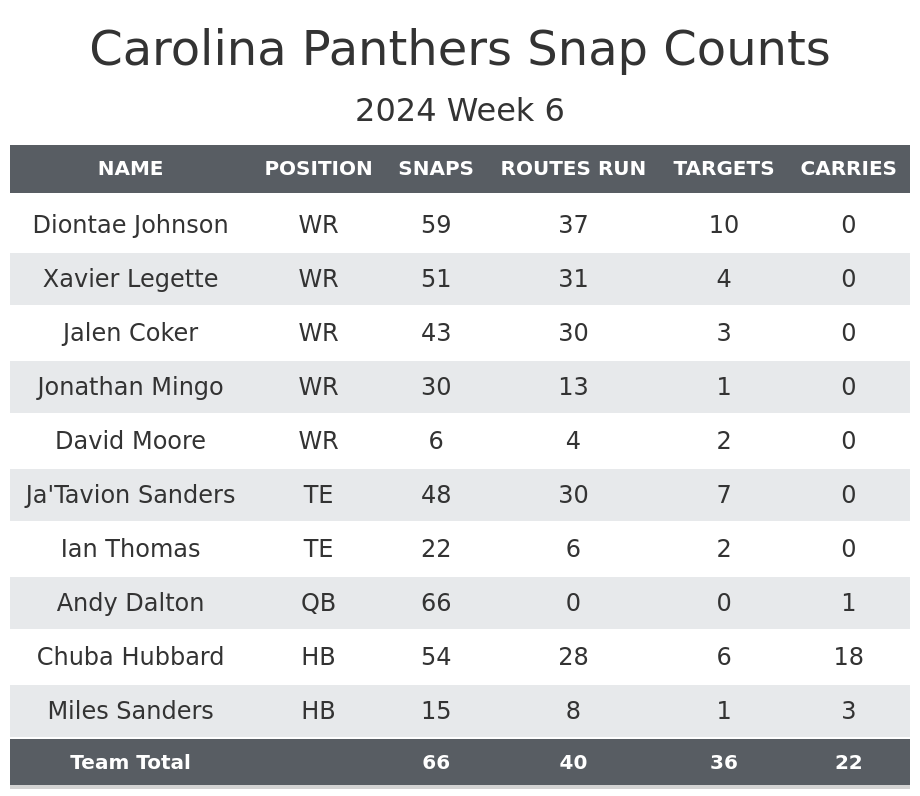
Jalen Coker surpasses Jonathan Mingo on the depth chart: Coker was the clear third wide receiver on the team, catching three passes for 30 yards.
The Panthers lost Adam Thielen to injured reserve, and last week, they lost Xavier Legette for most of the game. Luckily, Legette was fine to return to a starting role in this game, but last week gave Coker the opportunity to shine.
He caught four passes for 68 yards, which led the Panthers. The undrafted rookie from Holy Cross did as well in his first game with significant playing time as Jonathan Mingo had done in his best game. The Panthers wasted no time reacting to that game, giving Coker the clear majority of snaps in 11 personnel. The Panthers only ran eight plays outside of 11 personnel, where Coker wasn’t on the field.
This role probably isn’t big enough for him to have fantasy value, given Diontae Johnson and Legette will likely stay ahead of him in terms of targets and playing time, but it’s at least possible Coker can keep playing well.
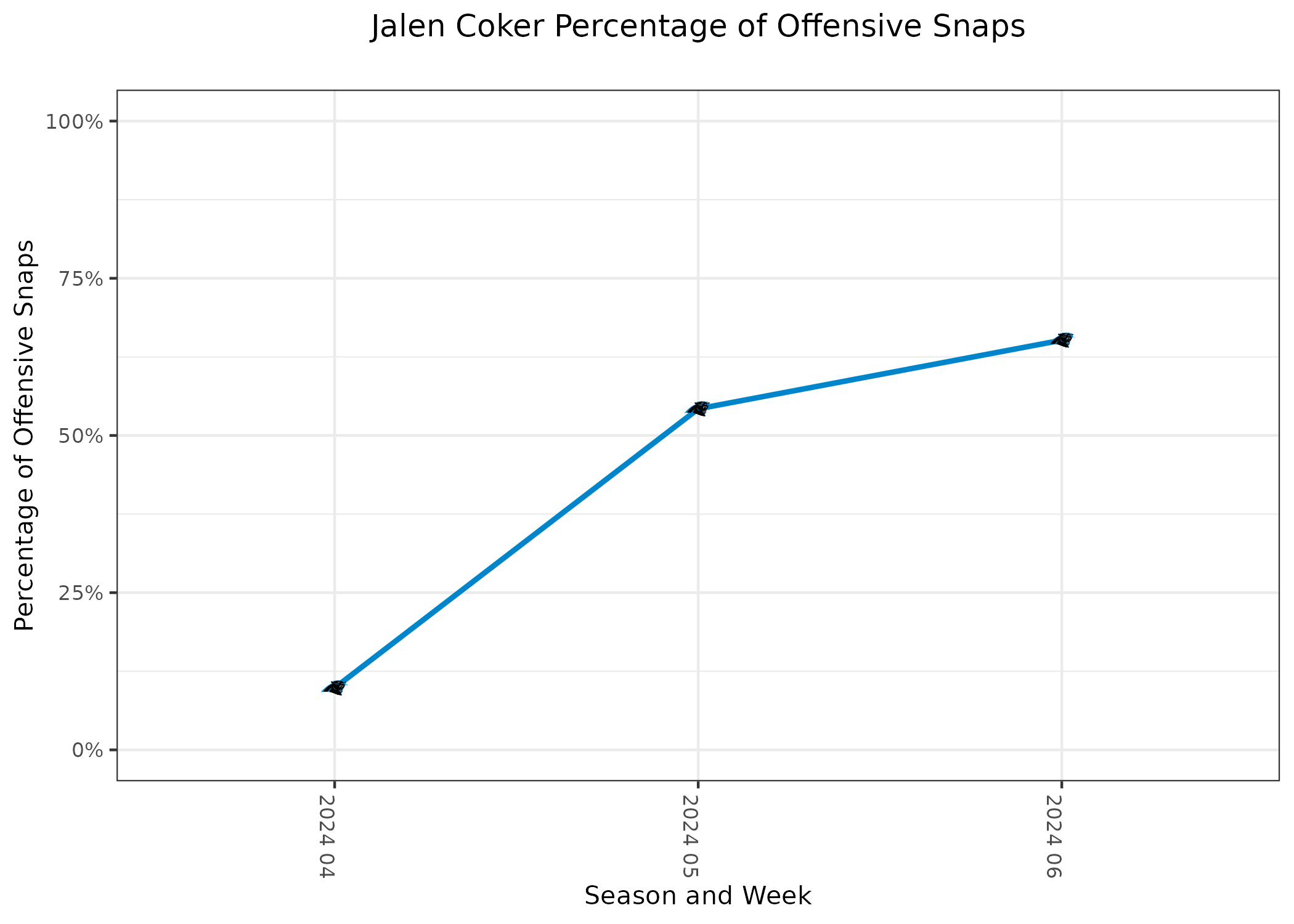
Tyler Allgeier leads the Falcons in carries: Allgeier ran 18 times, gaining 105 yards and scoring a touchdown.
The Falcons started the game with Robinson as the clear leader, playing 12 of 16 offensive snaps in the first quarter. The four plays where Allgeier was on the field were all run plays. In the first three quarters, Robinson still maintained a clear lead in snaps at a two-to-one rate, which included 13 carries to Allgeier’s nine.
At the end of the third quarter, the Falcons were up by eight points, and they largely used Allgeier as a closer.
Generally, in games where the Falcons are losing, we should expect Robinson to dominate snaps, and in games like this where they maintain a lead and win, we can expect both running backs to reach double-digit touches.
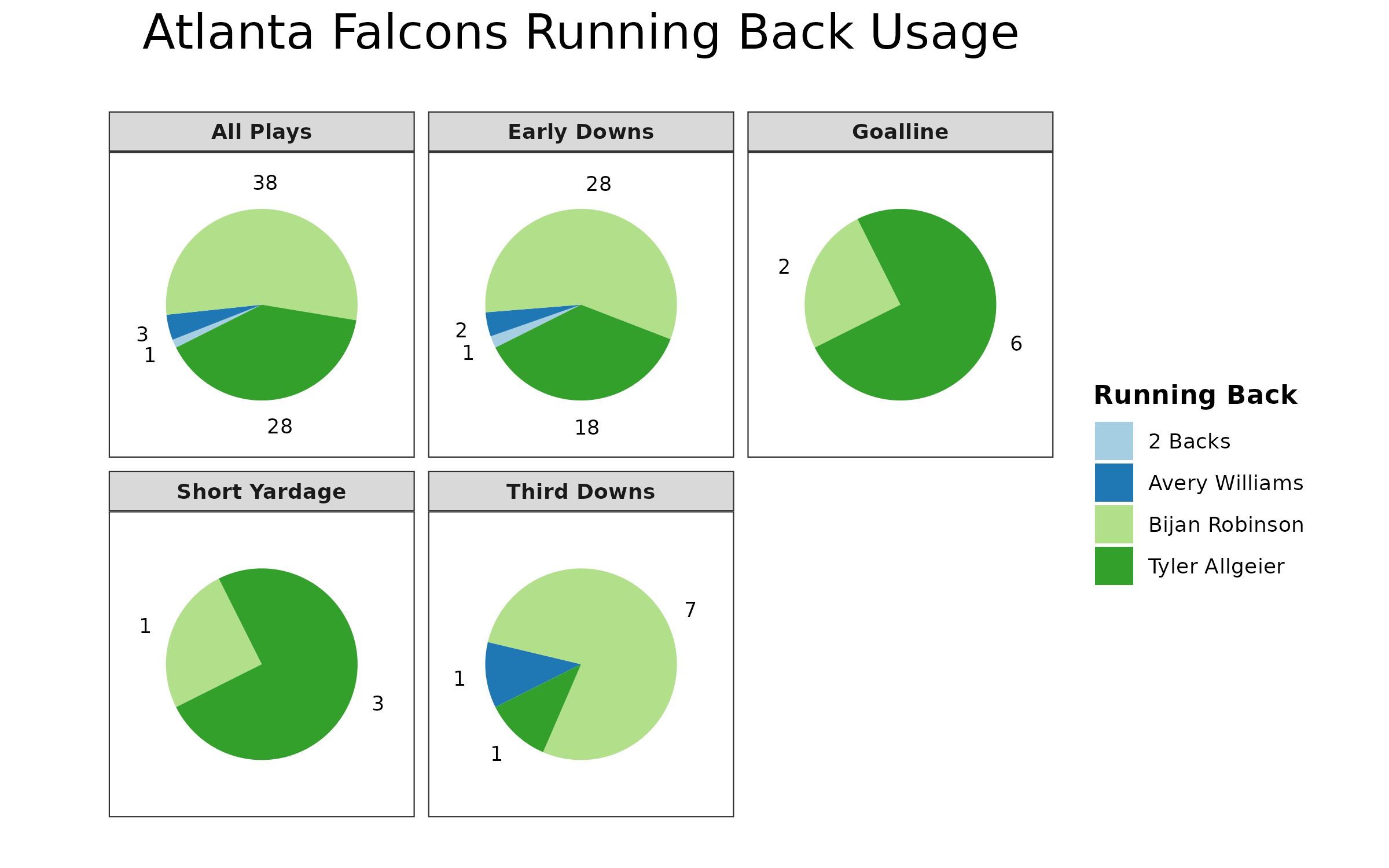
Miscellaneous Notes
- Falcons tight end Kyle Pitts played a season-low percentage of Atlanta’s offensive snaps, but that was largely due to run plays in the fourth quarter. There were only two pass plays that Atlanta ran where Pitts was off the field.
- Panthers lead tight end Tommy Tremble was inactive after suffering a concussion, but Ian Thomas returned from his calf injury, as he was activated off injured reserve. Thomas played significant snaps but mostly on run plays.
- Panthers rookie running back Jonathon Brooks has yet to return to practice. There is a chance he will next week, but they will not rush his return.
Detroit Lions @ Dallas Cowboys
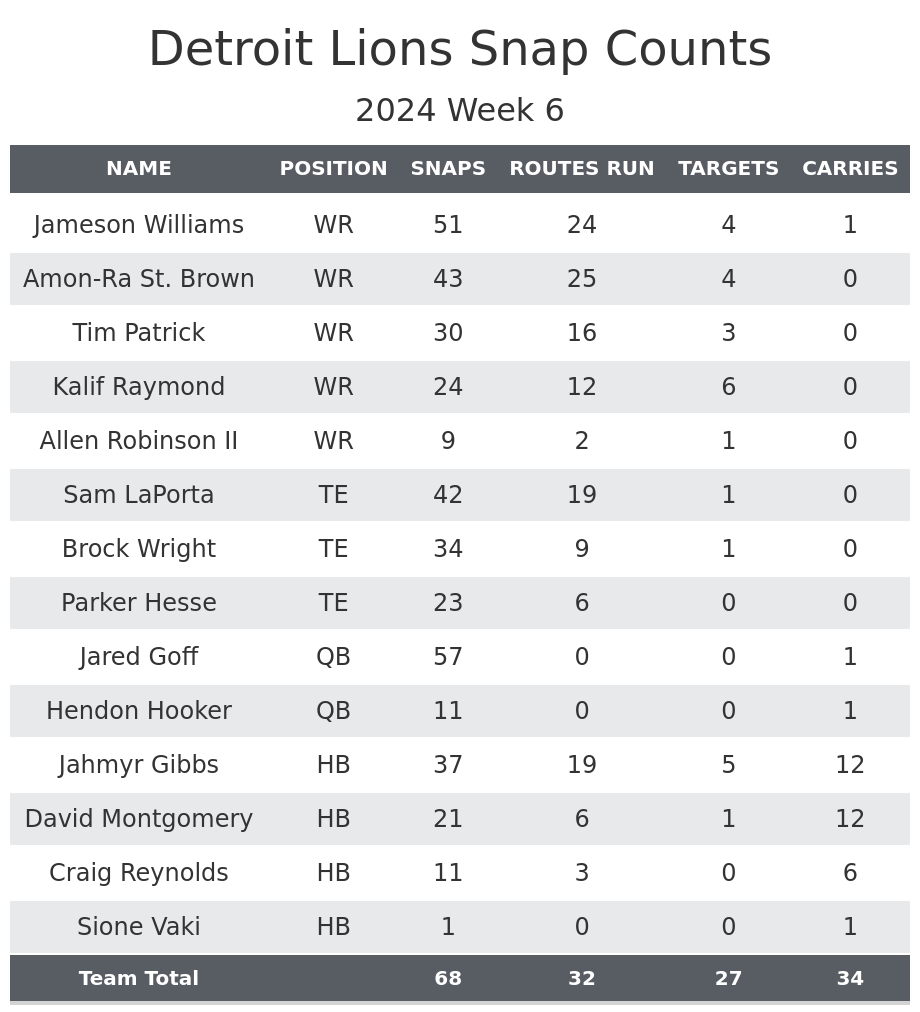
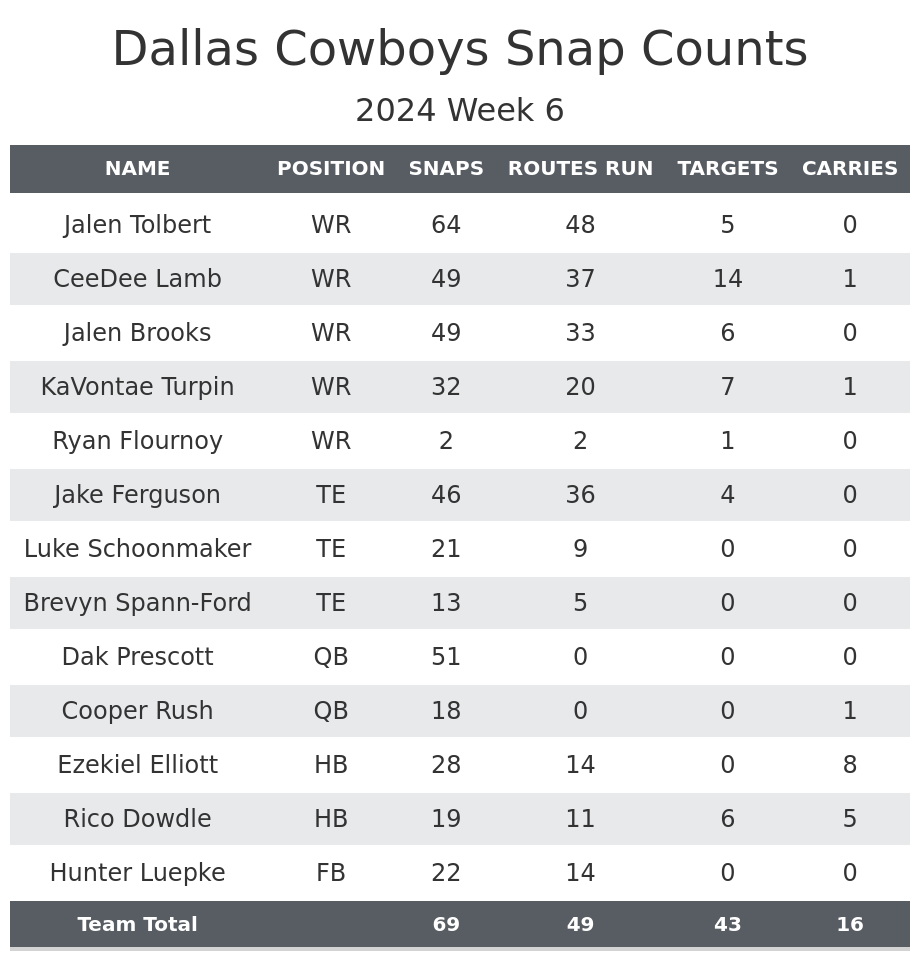
Monitor Sam LaPorta’s role: LaPorta didn’t play as much as he usually would
LaPorta had dealt with an ankle injury early in the season, but the Lions had their bye week and he wasn’t listed on the injury report at all this week.
Over the first three quarters, his playing time in 11 personnel was relatively normal, playing 23 of a possible 28 snaps, which left three passing plays where he was off the field. The concern was 12 personnel, where Brock Wright (18) and Parker Hesse (16) played more snaps than LaPorta (14). This left another five pass plays where LaPorta was off the field.
LaPorta had played 97.5% of Detroit’s 12 personnel snaps in the first three quarters of last season and 85.5% over the first four weeks. The 58.3% he played in this game was a dramatic decrease.
He proceeded to barely play in the fourth quarter, which was no surprise given the game script and is not a reason for concern. LaPorta caught a 52-yard touchdown on his only target. It’s fine to consider him a sell-high candidate for now, but it’s also fine to wait and see if this role was a one-game anomaly or a sign of things to come.
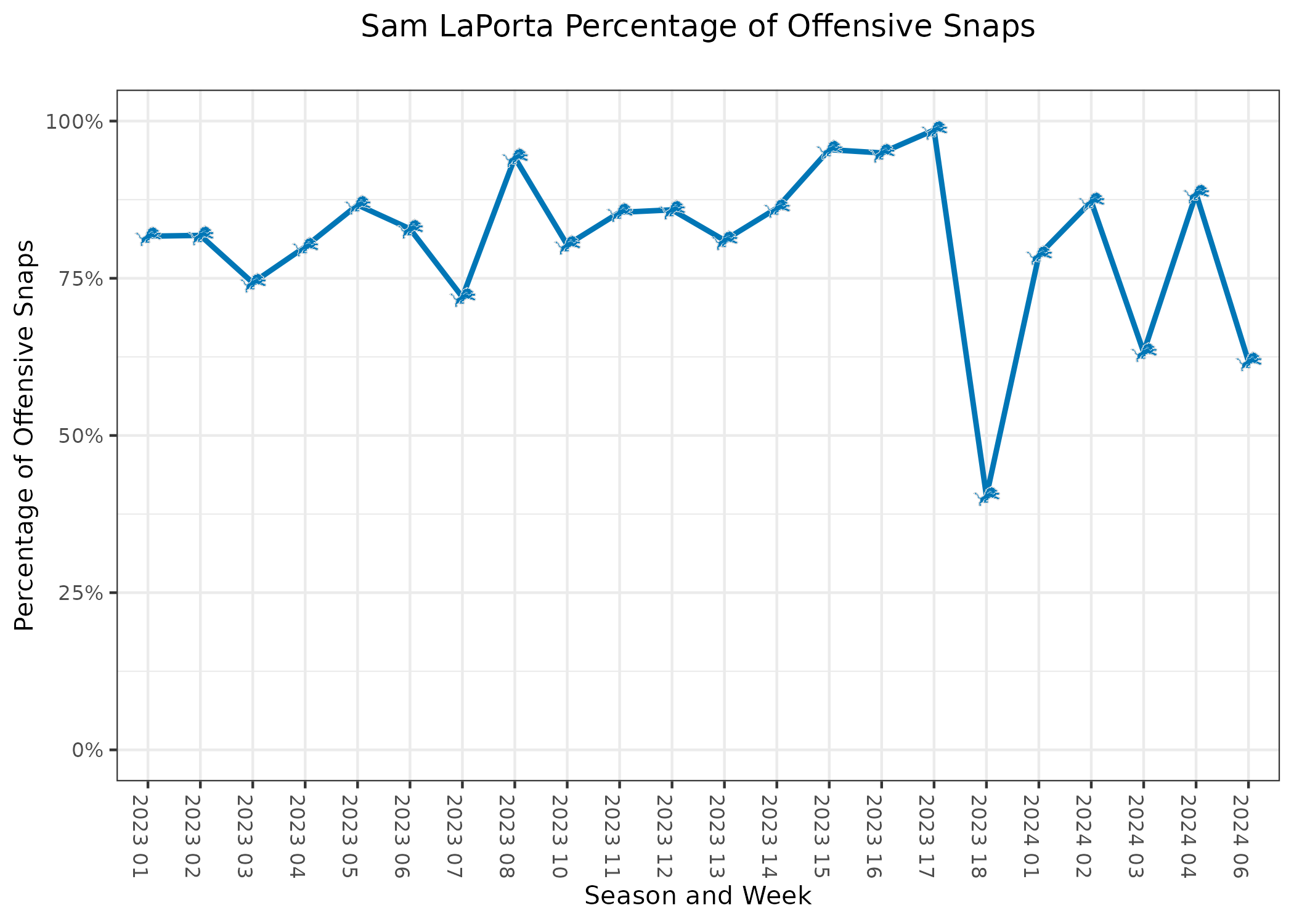
Ezekiel Elliott stays in Cowboys running back battle: Elliott ended up leading the Cowboys in rushing attempts.
The Cowboys started the game with their usual running back rotation. Rico Dowdle started, Elliott rotated in by drive, and Hunter Luepke took the passing-down snaps. This led Dowdle and Elliott to play 10 snaps each in the first half, but the Cowboys opted to run the ball more on Elliott’s drives rather than Dowdle’s drives.
Typically in these kinds of rotations, the running back who starts the game also starts the second half. In this case, Elliott started the second half, albeit for a lot of pass plays. The Cowboys proceeded to rotate by drive over the rest of the game.
Dowdle is still the running back that’s better to have in fantasy, but the changes in this game compared to the last few make the lead running back more of a question mark going forward.
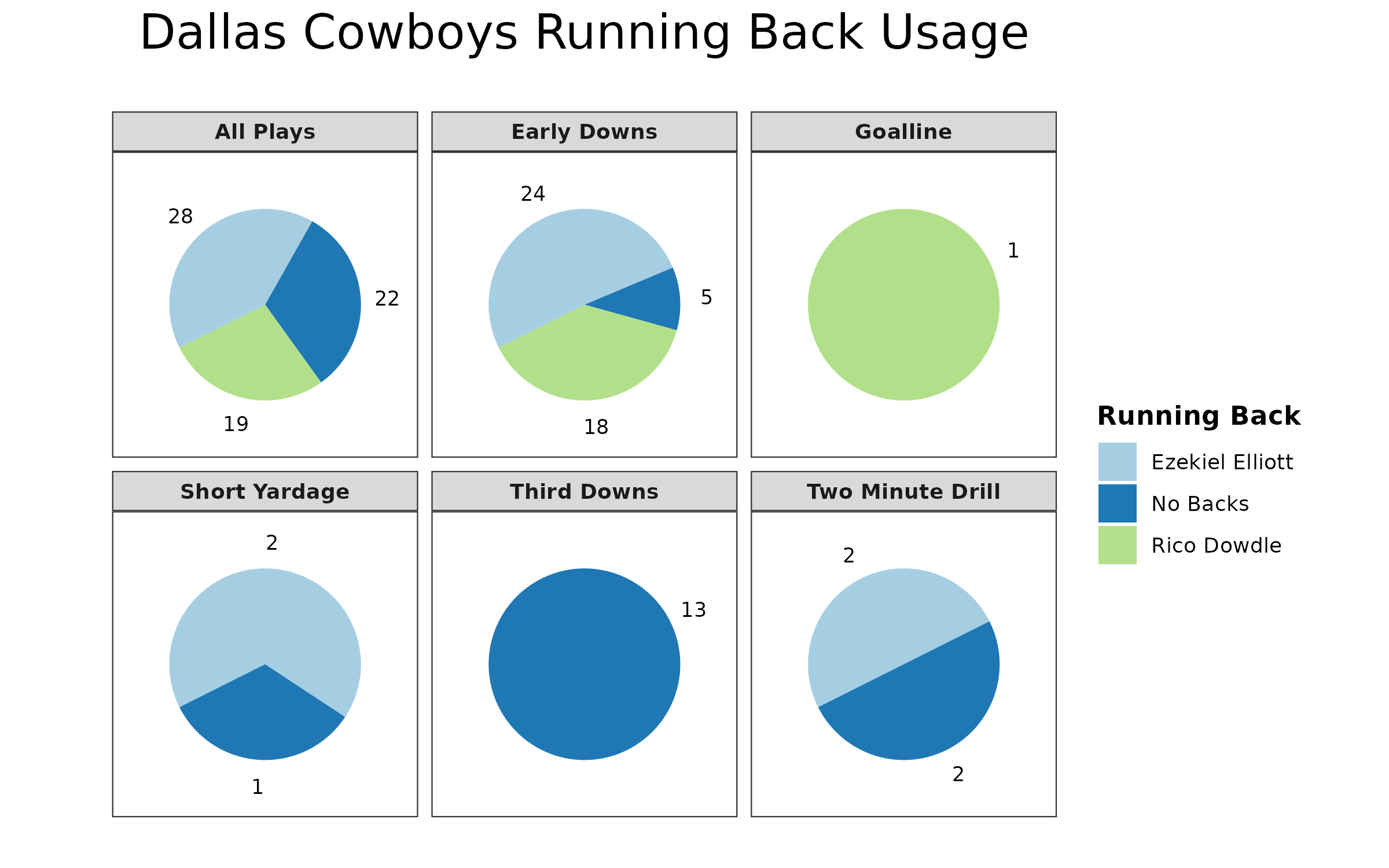
Miscellaneous Notes
Cincinnati Bengals @ New York Giants
- Tyrone Tracy: 17 carries, 50 yards, 1 touchdown; 6 receptions, 57 receiving yards
- Tee Higgins: 7 receptions, 77 yards
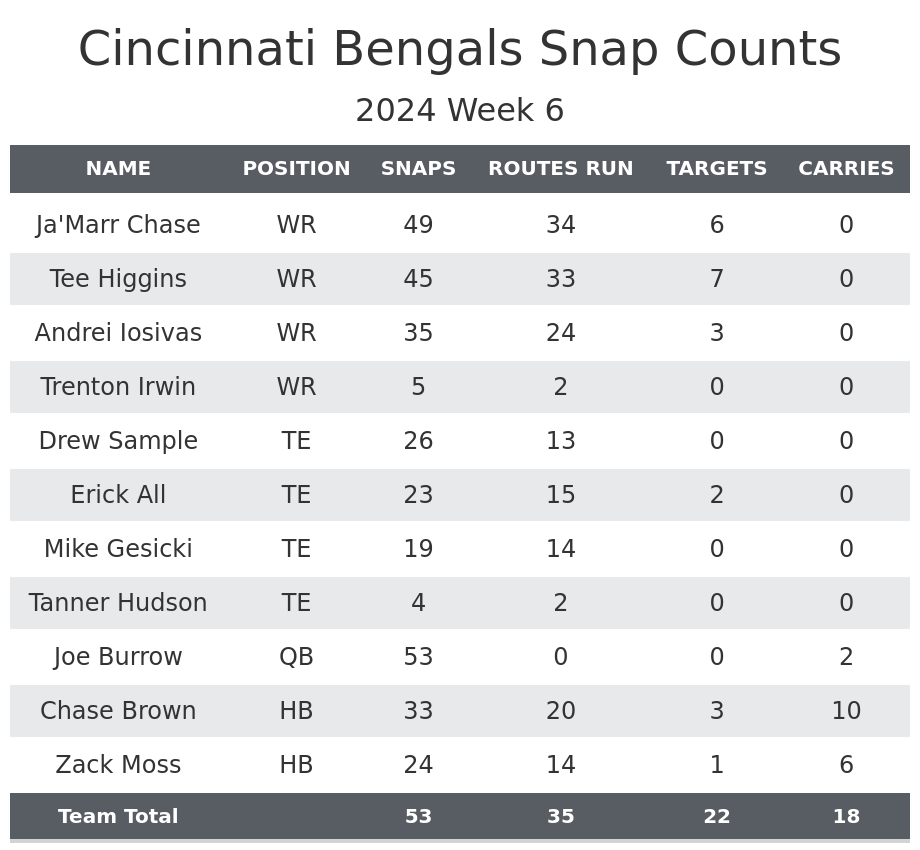
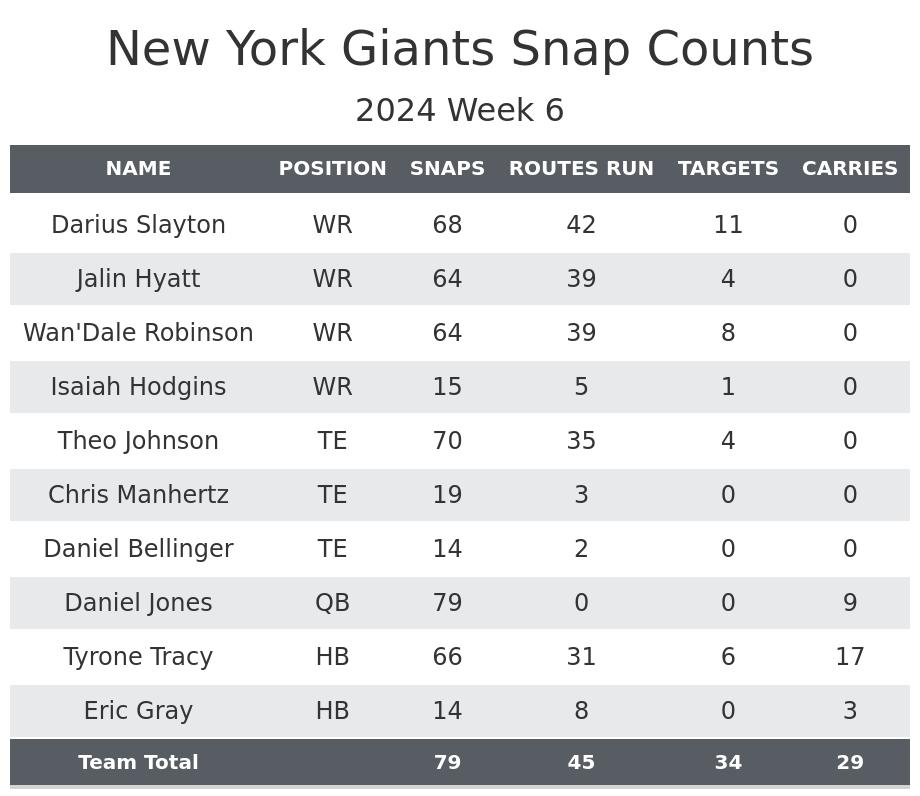
Chase Brown becomes the Bengals’ lead rusher: For the first time this season, Brown played most of Cincinnati’s early-down snaps.
Zack Moss has been the clear every-down back for most of the season, with Brown just playing significant snaps on early downs. Over the first five weeks, Brown had graded better as a rusher (79.8 vs. 67.9). Despite having 16 fewer carries (41 to Moss’ 57), Brown has amassed 19 more rushing yards (230 to 211). His ability to generate explosive runs has led to a higher first-down rate and a superior yards-per-carry average.
Despite being questionable for the game with a quadriceps injury, Chase Brown played most early-down snaps for the Bengals. While his involvement didn’t lead to much difference in production early on, the team trusted him to close out the game. After a fumble that went out of bounds, they stuck with him, and he responded with a 30-yard touchdown run. Brown also played a more active role in the passing game. Given this shift in usage, there’s a strong case for starting Brown over Zack Moss in fantasy leagues. If the Bengals can win more games, both backs could potentially become fantasy-relevant starters.
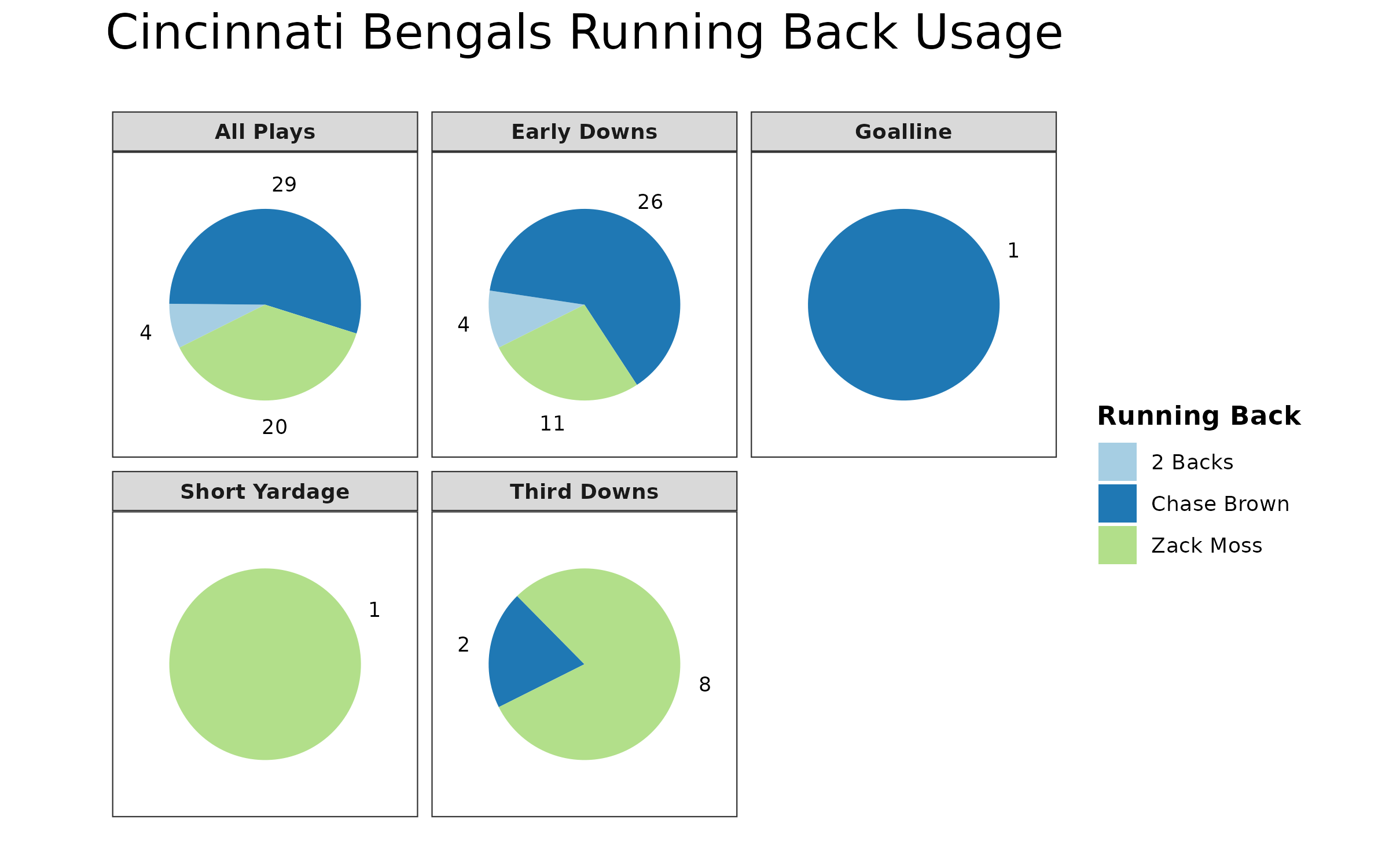
Erick All leads the Bengals’ tight ends in routes run: Mike Gesicki ran at least six more routes than All in each of the first five games.
The Bengals have been using a three-man rotation at tight end, with Erick All and Drew Sample primarily featured in 12 personnel, while Mike Gesicki serves as the main tight end in 11 personnel. Both All and Sample have also seen time in 11 personnel. The key difference this week was the Bengals’ increased tendency to pass out of 12 personnel, and when All was on the field in 11 personnel, it was almost exclusively during pass plays.
All caught two passes for 10 yards in this game, while Mike Gesicki wasn’t targeted. Since Week 3, All has led the Bengals’ tight end group in both targets and receiving yards, largely due to his 24% target rate, which is more than double Gesicki’s 11%.
The Bengals’ tight end rotation has seen gradual shifts in playing time and roles each week. While All may not yet be a fantasy-relevant option, his strong start and increasing involvement could position him for a larger role in the second half of the season.
Tyrone Tracy starts again: Devin Singletary missed his second straight game because of a groin injury.
Like last week, Tracy was the primary replacement, with Eric Gray taking third downs. This week, Tracy played an even higher percentage of early-down snaps and snuck in more third-down snaps. He didn’t average many yards per carry on the ground, but he was most impressive as a receiver out of the backfield.
At this point, the big question is how the backfield will look once Singletary is healthy again because Tracy has earned more playing time.
Tracy has graded higher as a runner, largely due to Singletary’s two fumbles this season. While Tracy has averaged more yards per carry, Singletary has been more effective after contact. Singletary has also been better at making defenders miss, though Tracy has shown slightly better performance as a receiver.
We could see something like Tracy seeing 60% of the snaps and touches and Singletary seeing 40%, but those numbers could go as high as 30% in either direction.
Tracy is still available in over 50% of ESPN leagues and needs to be rostered because, at the very least, he is a clear fantasy starter until Singletary is back.
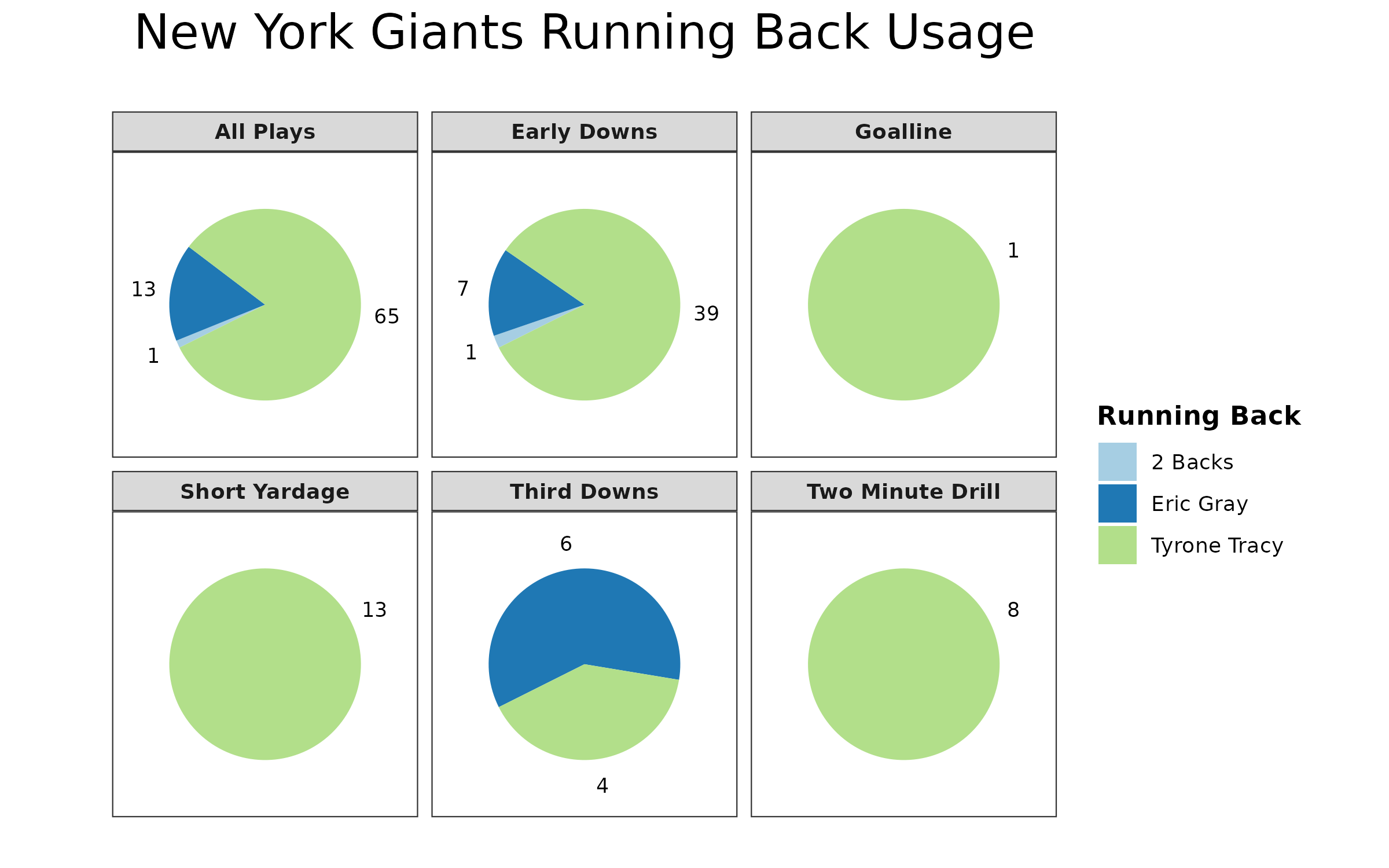
Miscellaneous Notes
- The Giants didn’t have Malik Nabers for the second straight week due to a concussion. The Giants again used Jalin Hyatt as the replacement in terms of playing time, while Darius Slayton took most of the targets. If anything, the wide receivers were rotated out less often this week, with Isaiah Hodgins again serving as the fourth wide receiver.
- Bengals’ third-round rookie wide receiver Jermaine Burton was a healthy inactive after playing a few offensive snaps and no special teams snaps each week. This allowed Trenton Irwin (inactive the last few weeks) to join the active roster and serve as the fourth wide receiver.
- Bengals backup tight end Tanner Hudson had spent the last few weeks inactive. At first, he was injured, but then he remained inactive even when fully practicing. He took a few snaps in 11 personnel.
Table Notes
- Snaps include plays called back due to penalties, including offensive holding or defensive pass interference. The other three stats have these plays removed.
- Targets may differ from official NFL sources. The most likely discrepancy would be from a clear thrown-away pass, where the NFL may give the target to the nearest receiver, while this data will not.
- Carries are only on designed plays. Quarterback scrambles won’t count for the total number of carries in the game.
Related
NFL star intends to make shock return to football after…
By JAKE FENNER Published: 14:06 GMT, 8 March 2025 | Updated: 14:06 GMT, 8 March 2025 After
New York Jets Launch Year Three of NFL Girls Flag…
The New York Jets are delighted to announce the return of its highly successful Jets NFL Girls Flag league in London ahead of International Women's Day.
MOCK DRAFT WATCH: Interior OL emerges as top pick for…
Trevor Sikkema, Pro Football Focus: James Pearce Jr., Edge, Tennessee Why: Pearce had an incredibly impressive combine showing in the speed drills,
Shedeur Sanders places blame on media, says perceived drop in…
Former Colorado quarterback Shedeur Sanders opted out of throwing passes at last week's NFL Scouting Combine. He did, however, travel to Indianapolis and condu










